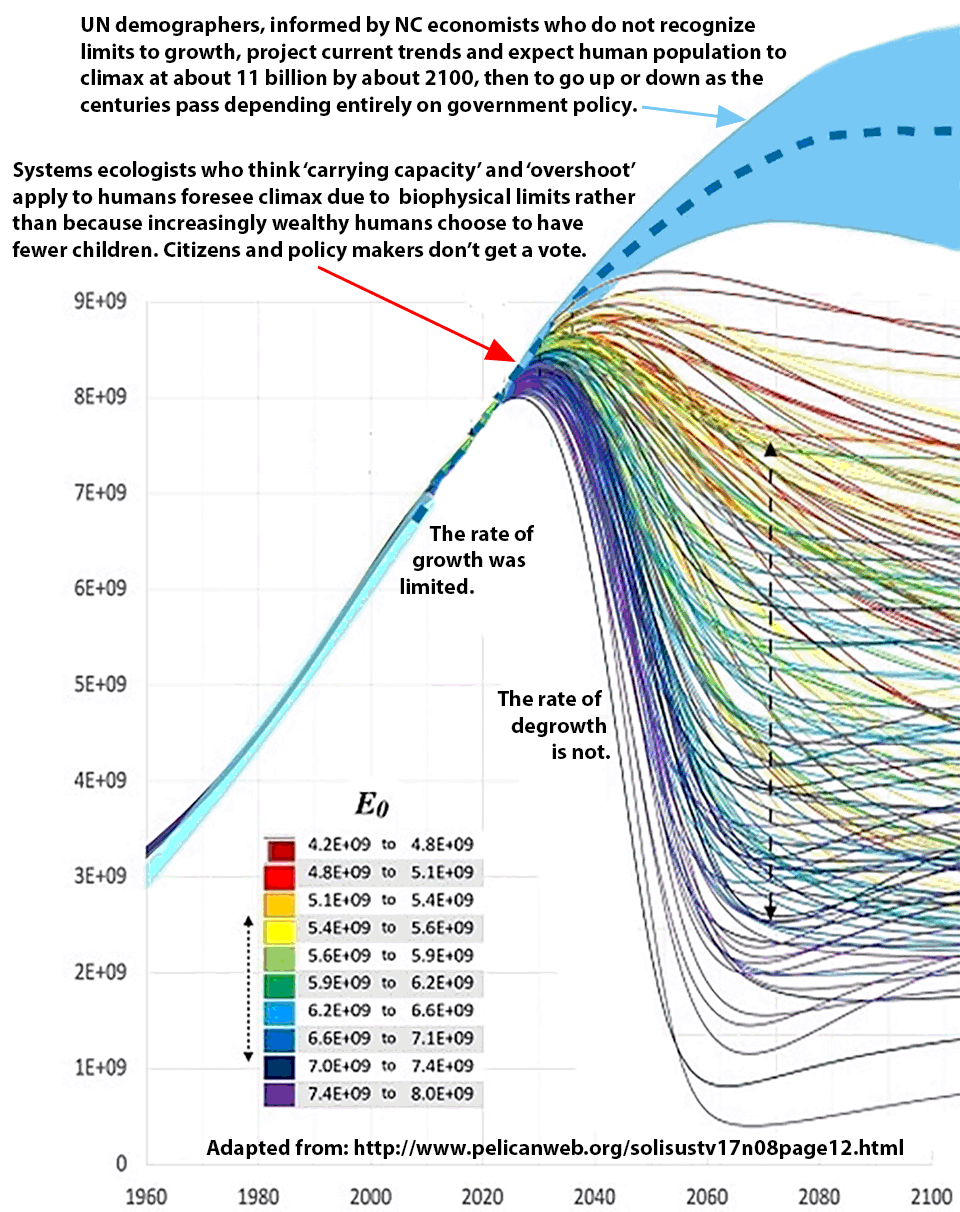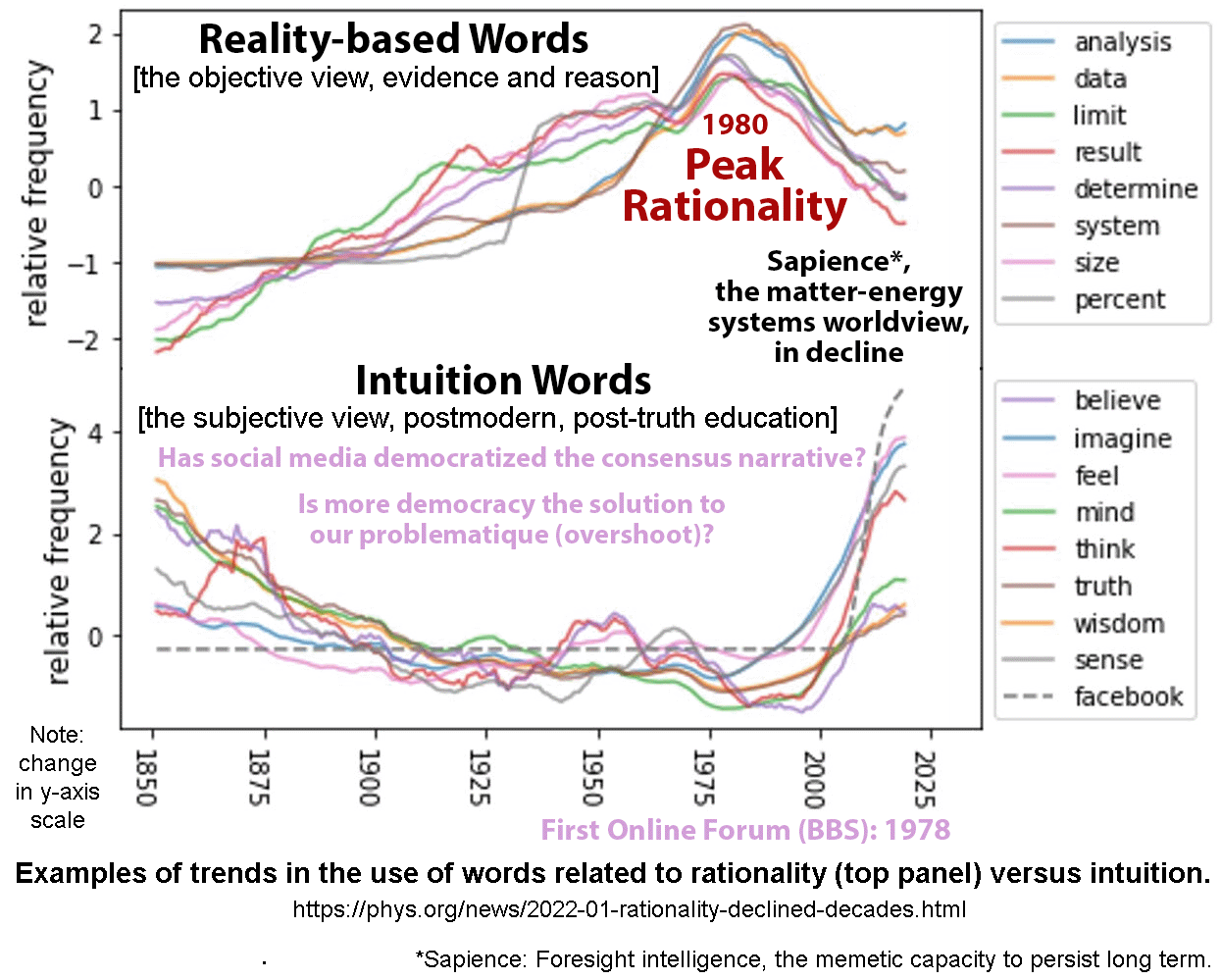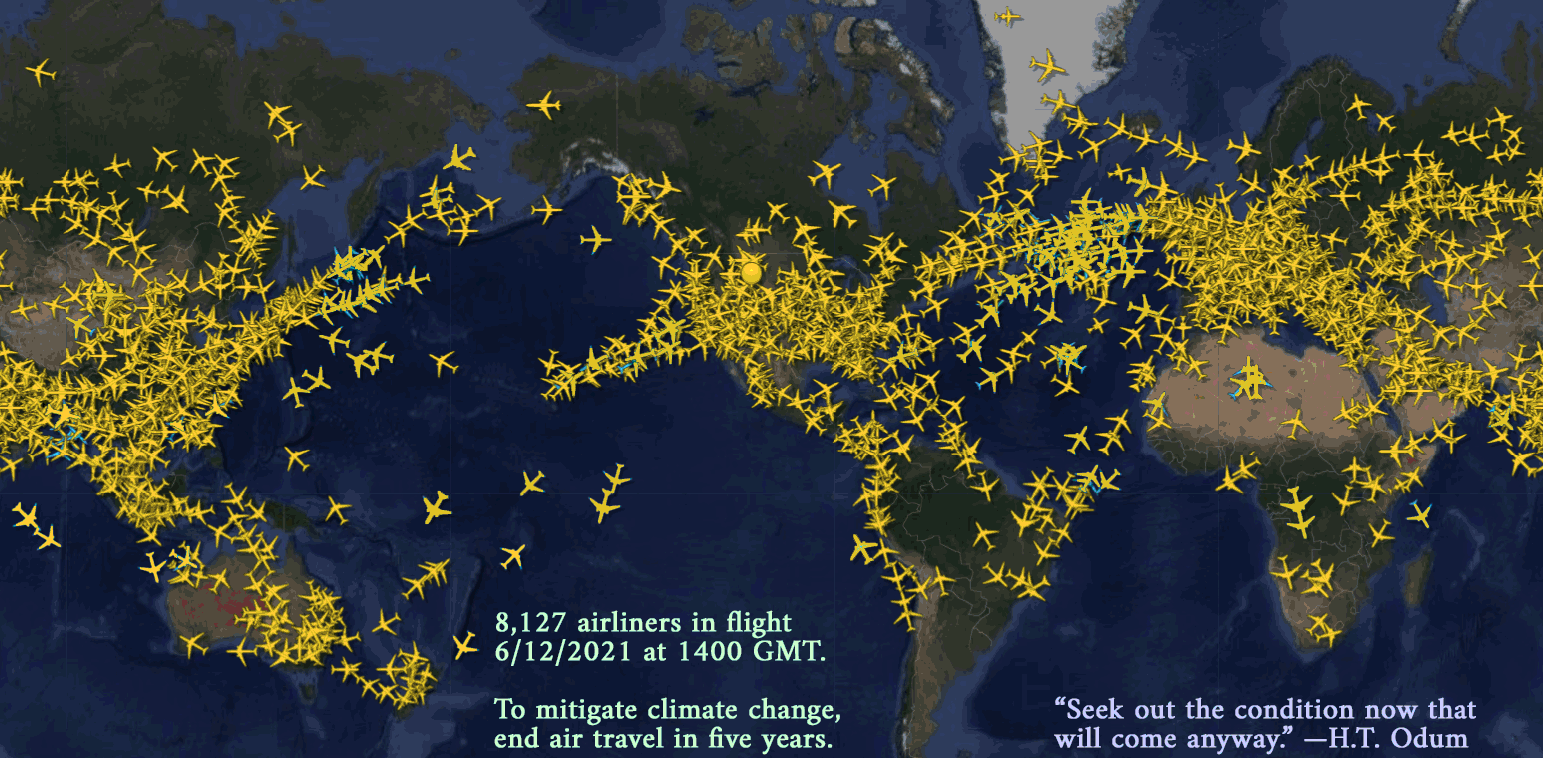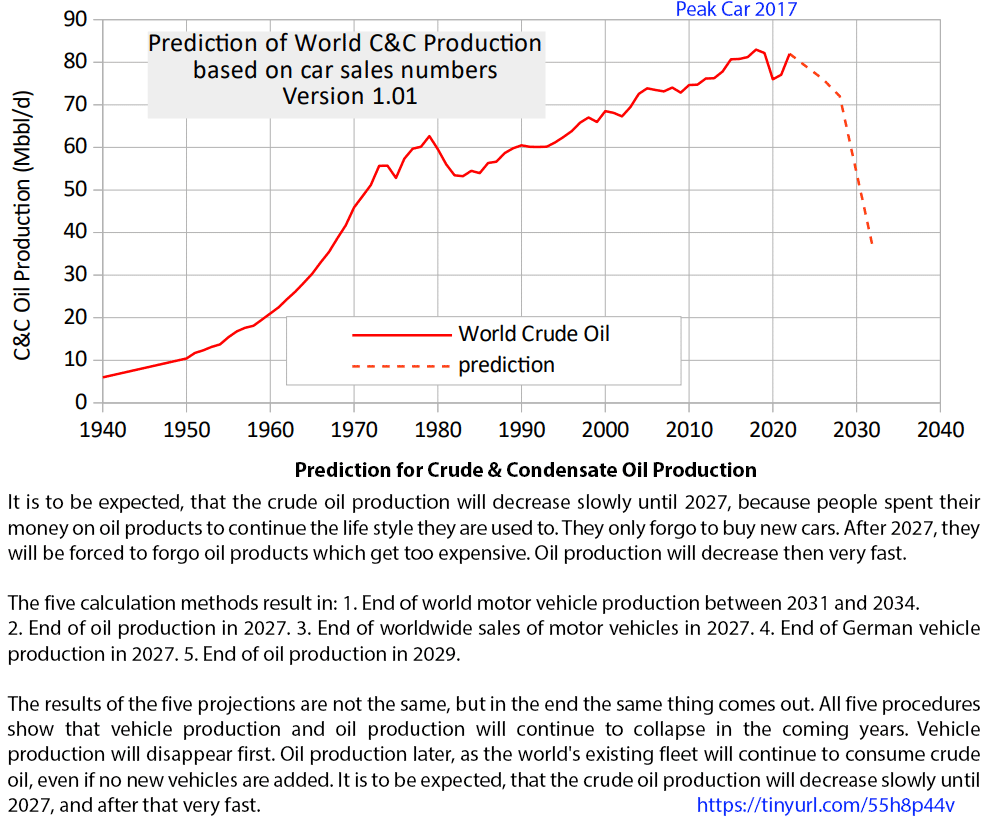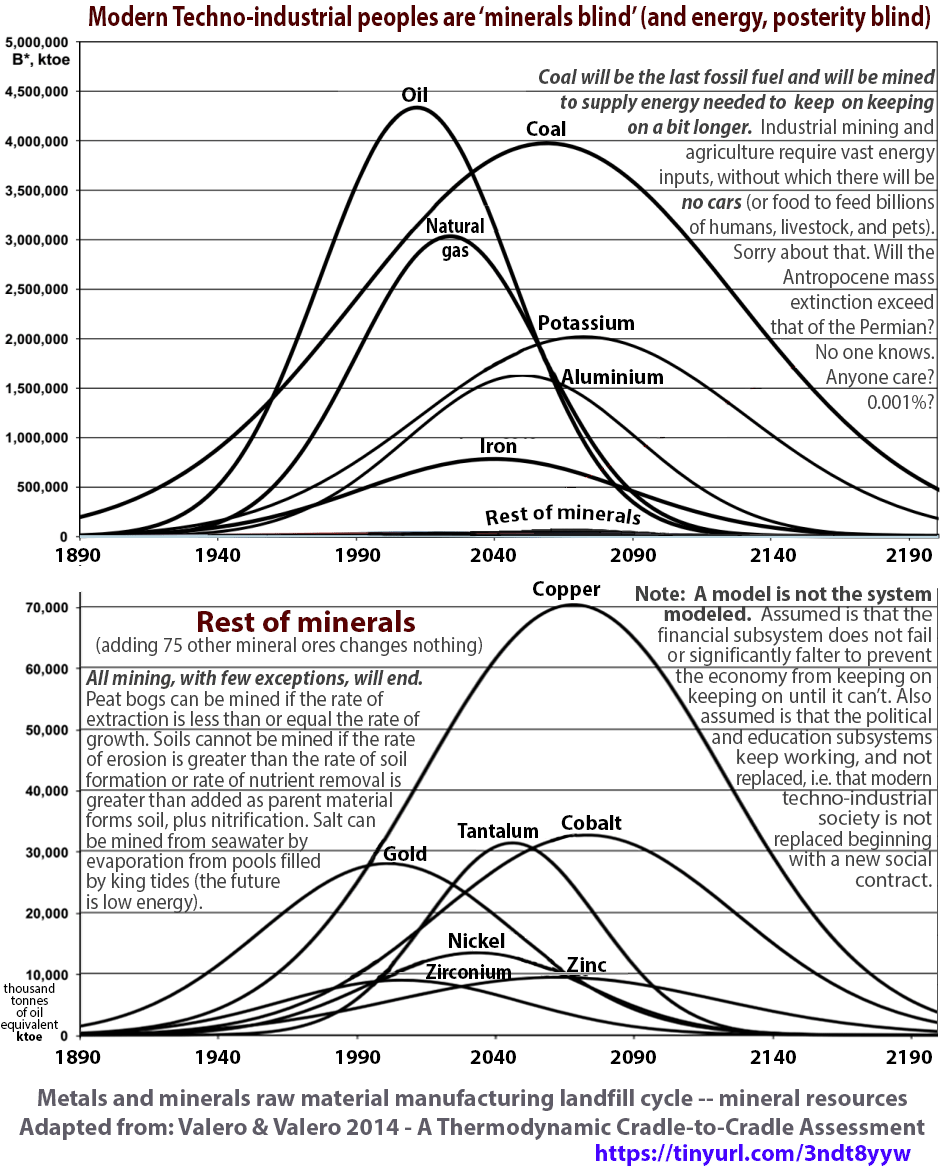
Earth to Sun.
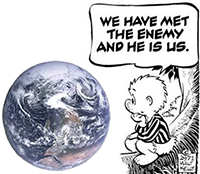 "Our" world is not the world system.
"Our" world is not the world system.
US Secretary of State: "Why have you come to our planet?"
Klaatu: "Your planet?"
US Secretary of State: "Yes. This is our planet."
Klaatu: "No. It is not."
WEDNESDAY, APR 10, 2024 — NOTES IN FILE:


Towards Real Solutions for Humanity [Posterity] and the Biosphere
Note: I'm not a source of information (nature is). I do listen to those humans who endeavor to listen to nature. The list is long, but I can narrow it down to one: Tom Murphy, astrophysicist, retired, Do the Math Post Index or summary. First link includes Tom's free silo-science textbook, a good starting point. My view of energy, the human condition, and existential threats to posterity are the same as his. Pathways, if any, to a viable future for posterity, however (e.g. the one I envision), vary. I had a great uncle who built a perpetual motion machine in his barn. I'm guessing it didn't work. I'm guessing we are nearing the climax of a blip and not (as techno-optimists see) living in an energy dip. Gaia (the Gaian system) only knows (will determine). Or Klaatu will save us is another view. You can believe what you want to—for a time.
Preferred solutionatique to our problematique (overshoot): Supplant the Modern Techno-Industrial form of civilization (Civ 3, which is not remotely sustainable) with a transitional civilization (Civ 4, which could fail to transition to a viable form likely involving the <1% who self-select into trying) to iterate over an 8 to 20 generations period towards consciously and meta-reflexively co-creating with Nature (by listening to the Gaian system who has all the answers) a viable form of civilization. Those who believe in modernity must wake to lamentation and sorrow (post climax). Those who cannot consider they are dreaming cannot awake to seek out the condition now that will come anyway (i.e. far fewer people consuming less per capita).

Final Offering: A summing-up
“We have overrun the planet." —David Attenborough
"And then what?"
—Garrett Hardin
1-2-3 SIMPLE: 18 Words to Rule Them All
1. Humans are animals.
2. Modern humans are not normal animals.
3. To persist, the expansionist form of human must renormalize.
“Understand or die.” ― Ludwig Wittgenstein [attributed, also applies to humanity who must...]

Most current (daily) offerings are on Medium, free, no membership required.
- Preface—Earth at Night: Do you live in the glow?
- Introduction: Brief statement of main points
- Understand the Exponential Function: Growth is for a time
- Environment, Power, and Society: Understanding the basics
- The Prosperous Way Up and Down: Understanding a bit more
- Carrying Capacity and Overshoot: The objective view by Paul Chefurka
- Human Origins in Deep Time: It's a long way down
- Human Population Curve: It's been a long way up
- Past (to present) Lives of Humans: Overview of humans over time
- Critical Mass: A film on population issues
- Design for a Viable Civilization: To respeciate the biosphere is less than 10 million years
- Lord Man: An image of images
- The Malta Solution: Thinking long term past to future

- How Do We Moderns Save the World From Ourselves?: Understanding why we cannot, but some could

- The Ecolate Message: A timeline
- Down with Democracy, Up with Naturocracy: History may repeat with a different outcome
- Cruise Ship Earth: Enjoy the cruise
- Stand on Unguja: To understand and live properly with the cosmos
- Circles of Abelief: The Federation alternative
- As is Your Sort of Mind: You'll find what you desire
- Call Me Ishmael Too: An adventure in insight and understanding
- Elder Brothers' Warning: From the Heart of the World
- The Kogi Project: We can learn about real solutions from these people
- The Tairona: An introduction to a possible history
- Aluna: There is no life without thought
- Know Then Thyself: Presume not Nature to care
- Know Then Thy Not-self: Presume not Nature to care

- Finis: The Nature of Things
"Those who dream of the banquet wake up to lamentation and sorrow." —Zhuangzi, 4th century BCE
Humans take note — attention, Red Alert:
“What has survival value for the individual may be lethal for the population…”
— Gregory Bateson
Anagenesis occurs when a species evolves within a single lineage. Modern humans (Homo sapiens insapiens) began with the Great Expansion within and out of Africa 50k to 60k years ago as an anagenetic/memetic change of form from a K-strategist/K-culture species to an r-culture dynamic imposed upon a biological K-strategist that has resulted in continued r-culture selection and change in gene frequencies among 99.9999% of humans (exceptions, San and Hadza) today (i.e. some genetic change, but vast cultural change in worldview and mindset). Our expansion/growth-mania culture strongly selects for individual fitness (e.g. economic, political, religious) in a way that is lethal for the human population long term. Individual understanding of this dynamic is the only deliverance possible from it if such individuals can auto-organize into a renormalizing form of human able to persist through the coming bottleneck/dissolution of modern techno-industrialized humans.
Modern humans are captured and being dragged along by a dynamic that we ignore, deny, or fail to understand. Continued failure to understand has a foreseeable outcome (extinction or worse — recovery to repeat the pattern until extinction whether in 500, 5k, or 50k years).
“We must be mindful of ways that humans may have evolved to be an extinction prone species. Our intelligence (at least the ways we commonly use it) may benefit individuals (or even some groups of individuals) but also increase our risk of extinction — a matter of serious concern in any evolutionarily enlightened form of management.” — Richard Fowler, Systemic Management 2009
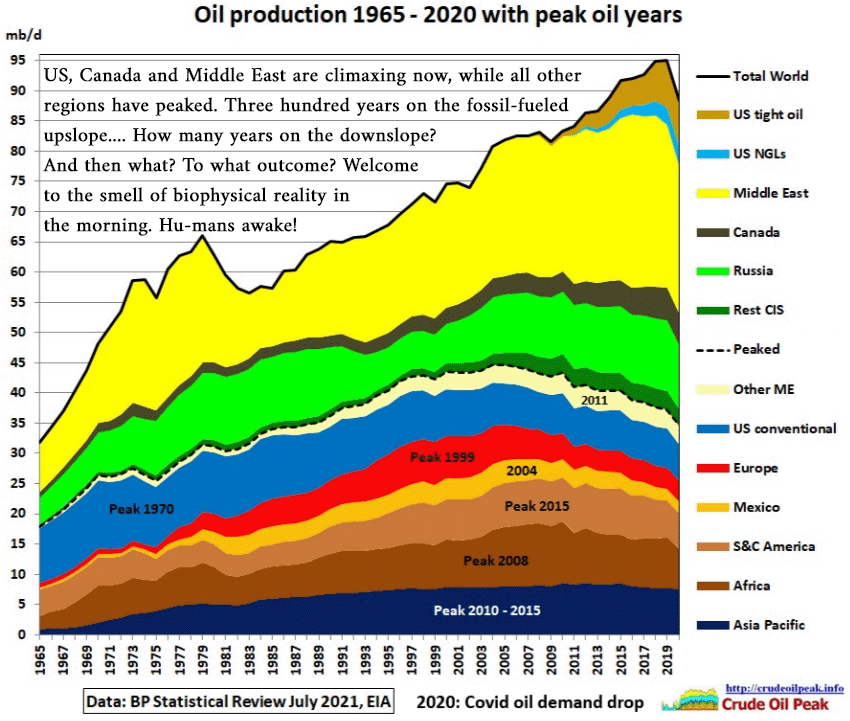
I'm actually an extreme cornucopian optimist living on a soon to be (<10 million years) yet again abundant Earth. This outcome will come anyway no matter what we do in the near future. As Ruben Nelson would likely agree, the near future is 'not good news for 10 year olds'. But I'm not into short-termism as it is so MTI (modern techno-industrial). Gaia forces me to take the long view and agree with James Lovelock (who also endeavored to listen to Gaia) that 'eventually we'll have a human on the planet that really does understand it and can live with it properly. That's the source of my optimism'. [ref]
I'm guessing that as many as 0.0001% of we MTIed ones may pass through the coming bottleneck with enough functional behaviors and culture/information intact to again become an evolvable subsystem of Gaia in 8 to 20 generations (taking any longer may disallow recovery from our Anthropocene cognitive/behavioral sink). So, in just 200 to 500 years there could be a human on the planet that really does understand it (information, e.g. systems science, is preserved) and as a Civ 5 people posterity will contribute to nature restorancy so recovery from the Anthropocene actually takes less than 10 to 20 million years.
 Yes, I'm a dreamer, and I may be the only one who would live in a viable ecolate civilization. Near-term human extinction (in <500 years) is the other outcome.
Yes, I'm a dreamer, and I may be the only one who would live in a viable ecolate civilization. Near-term human extinction (in <500 years) is the other outcome.
But as noted, I'm an extreme cornucopian optimist. I refuse to traffic in doomerism and envision a future where a Borg-like remnant of MTI society/monetary culture persists as a tumor on the face of Gaia (even though it could). So I'm a denialist (hard to admit), and I am
hu-man (but don't tell anyone).
Nature’s message to humanity is dissonant, altogether too dark for Pollyannas (Anthropocene enthusiasts). It is possible to be both an extreme optimist and extreme pessimist, and so neither. We modern techno-industrialized (MTIed) humans are both too clever by half and not nearly smart enough (even though no one likes this story — in-our-face evidence it is true). Our lives and minds (our economies, governments, cultures, consensus narratives…) are not remotely sustainable.

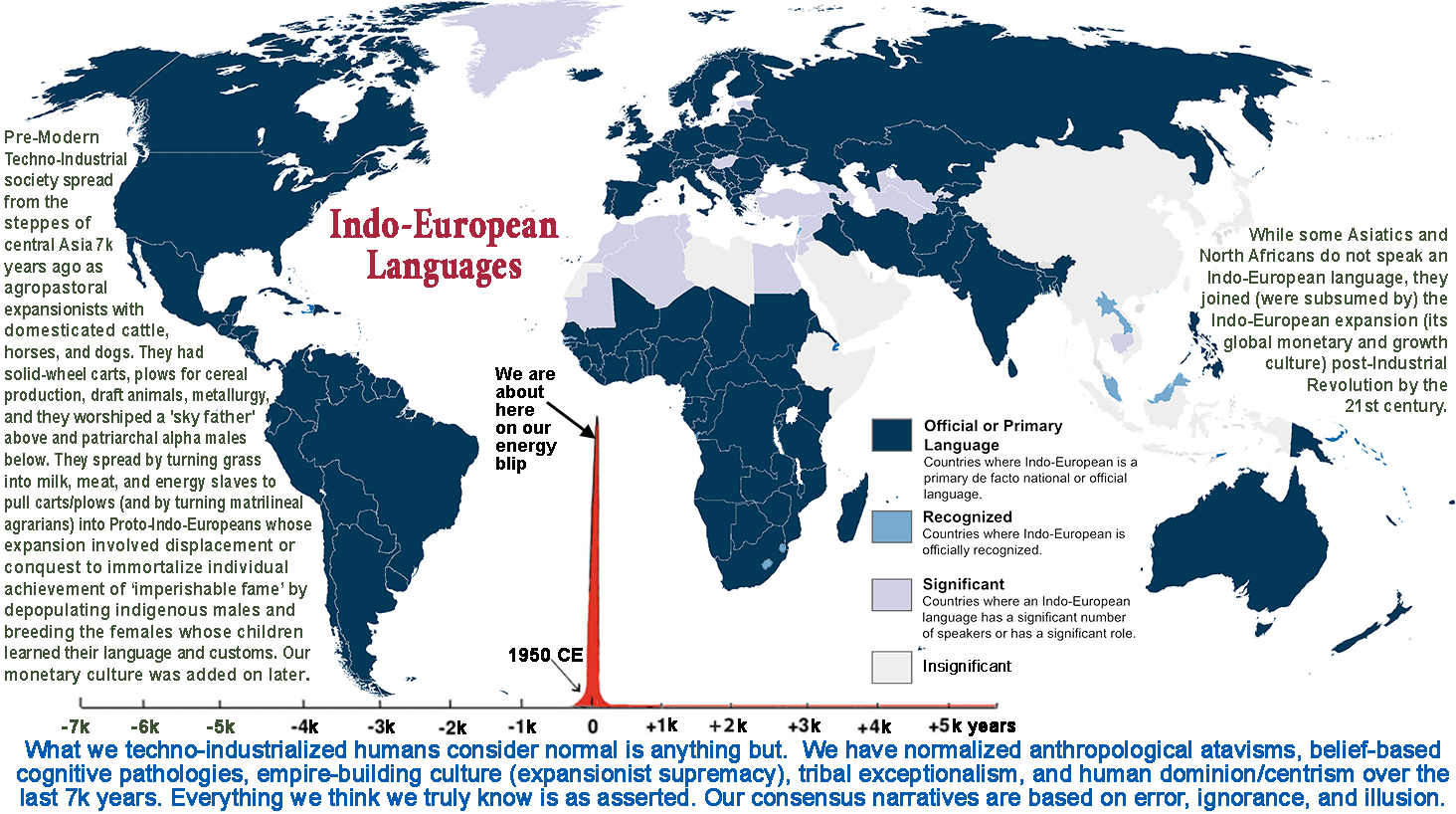
We MTIed ones utterly fail to realistically estimate the challenge of our persistence, a pathological condition that selects for our hu-man (hubris man) dissolution, and if all hu-mans go down with the Civ 3 ship, then our species' extinction is possible. We who maximize short-term self interests do so but for a time. Who among us could foundationally change without memeticly mutating, i.e. to become abelievers, a change well beyond exchanging one belief-based opinion for another?
Anthropogenic Biomes
Anthromes, the human footprint on a planet for the taking

Top 10 Existential Threats to Gaia
(and humanity)
HUMAN CARRYING CAPACITY OVERSHOOT EVENT
Anthropocene mass extinction event (which may include posterity)
Collapse of global ecosystems from overexploitation and stressors
Belief-based mass delusion (money, politics, religion, humanism)
Technology unbound (e.g. cars, agriculture, WMD—e.g. nuclear)
Biosphere toxification (e.g. N, P, CO, SO2, CO2, VOCs, CFCs)
Continued industrial food, fiber and wood production
Overdensity socialization in overcomplex societies
Continuation of modern techno-industrial society
Rapid birth-off and economic contraction failure

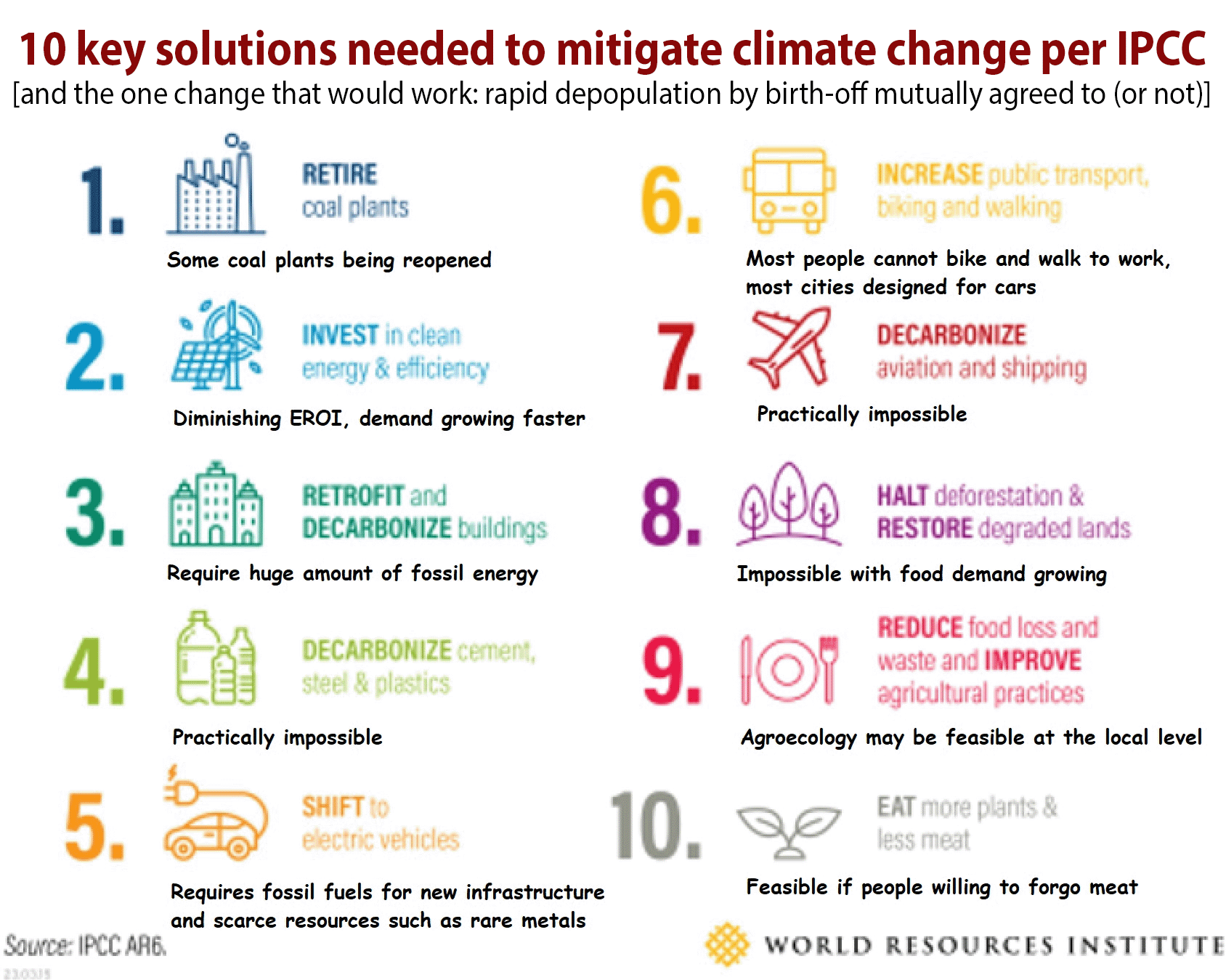
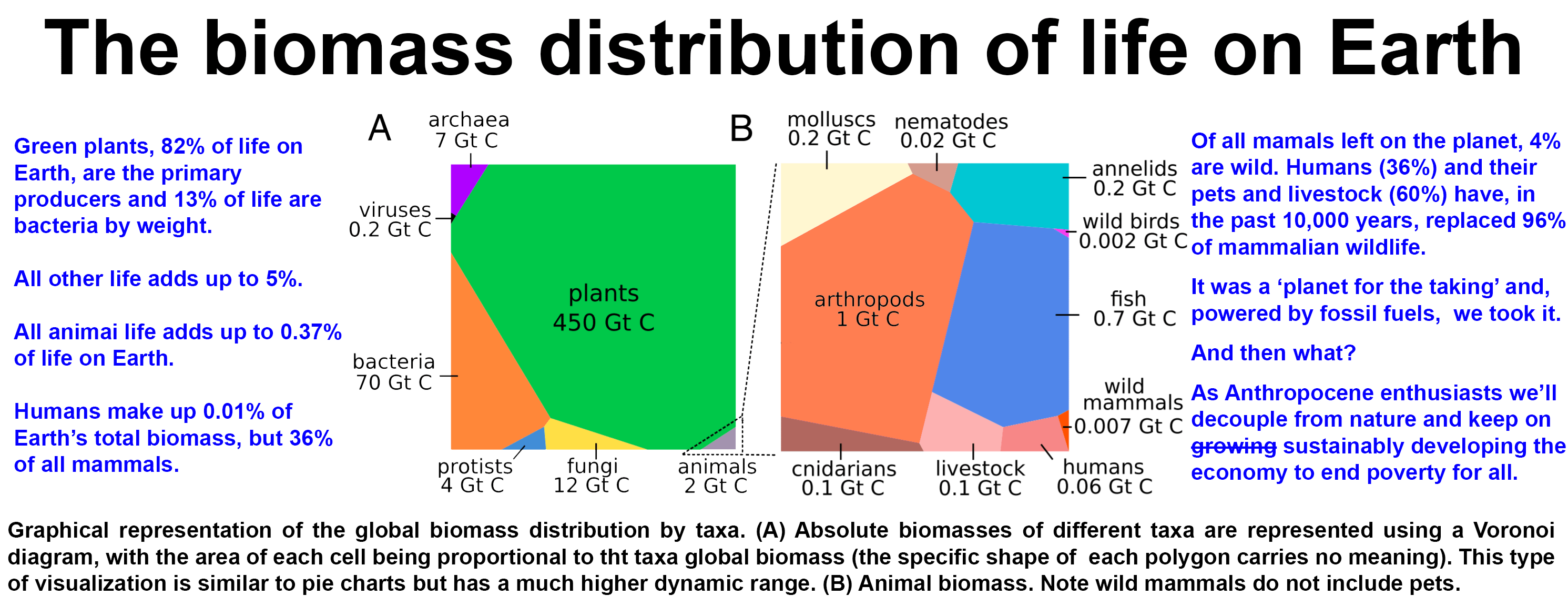
More: Earth's Biomass: Species/local-population extinction is one measure of Anthropocene progress, but biomass change is another.
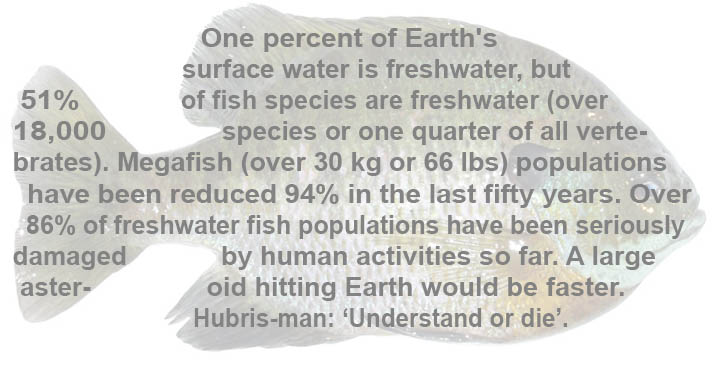
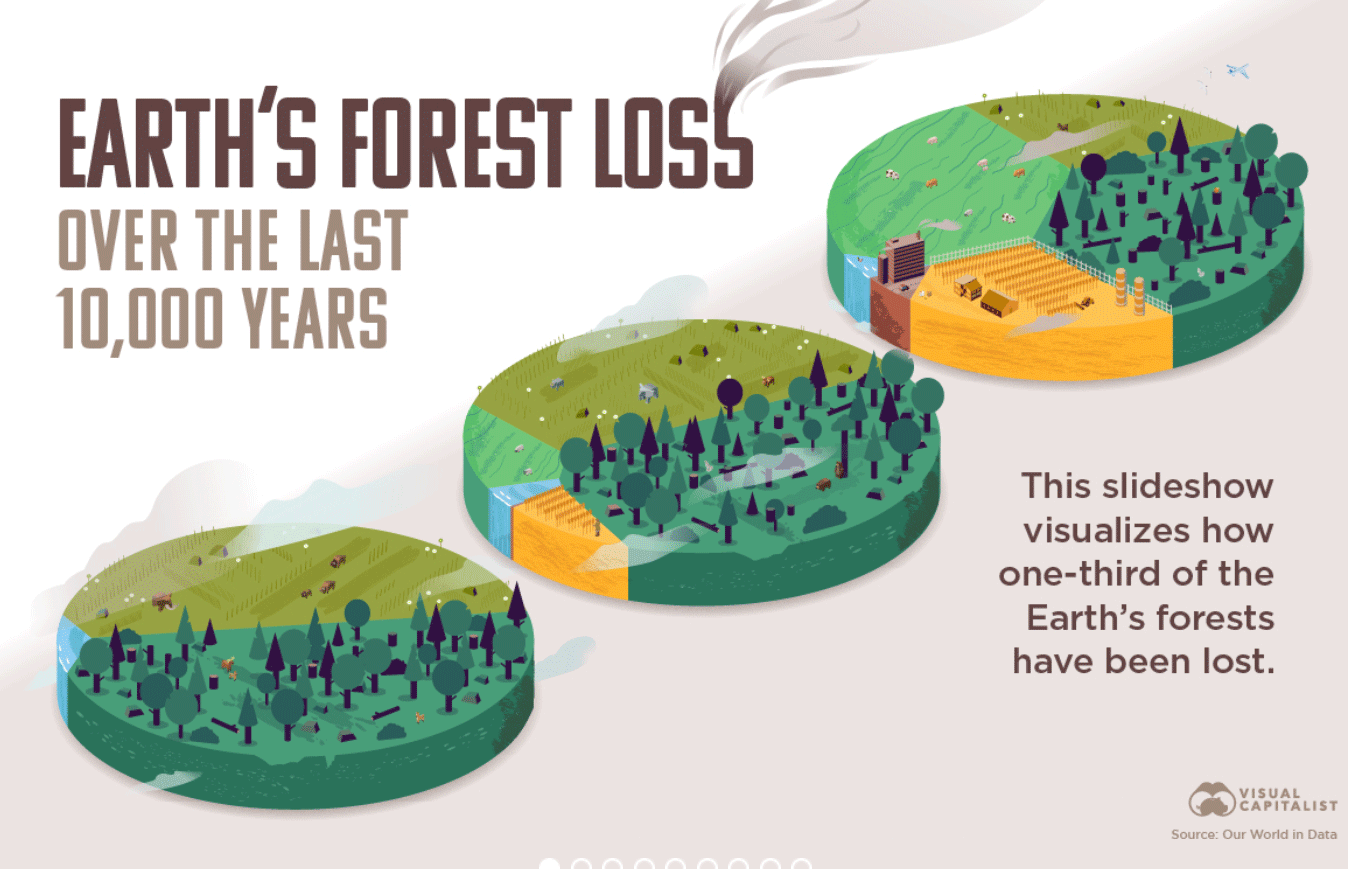
Half of Earth’s loss of forests and grasslands to agriculture and sprawl occurred from 10,000 BP to 1900 CE. The other half (1.1 billion hectares) have been lost since 1900. Of this loss, 9 percent occurred between 2000 to 2018. About a quarter of the loss in habitat and species/local-population extinction that occurred over the last 10,000 years has been within one average human lifespan. So 400 generations pass and half of the damage to Earth's ecosystems was caused by 395 generations. The other half was caused by the last five generations with most of that caused by the currently ambulating. And then what?
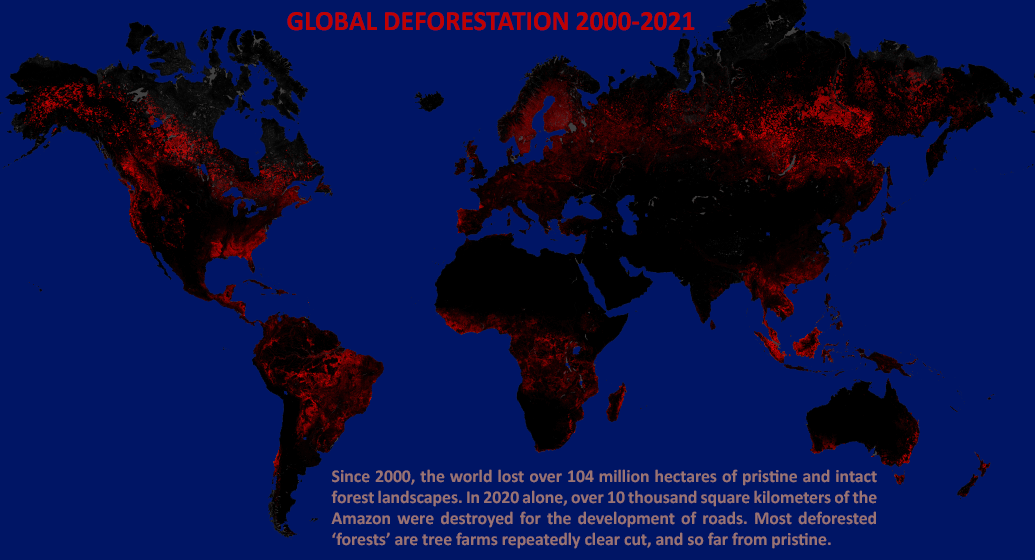
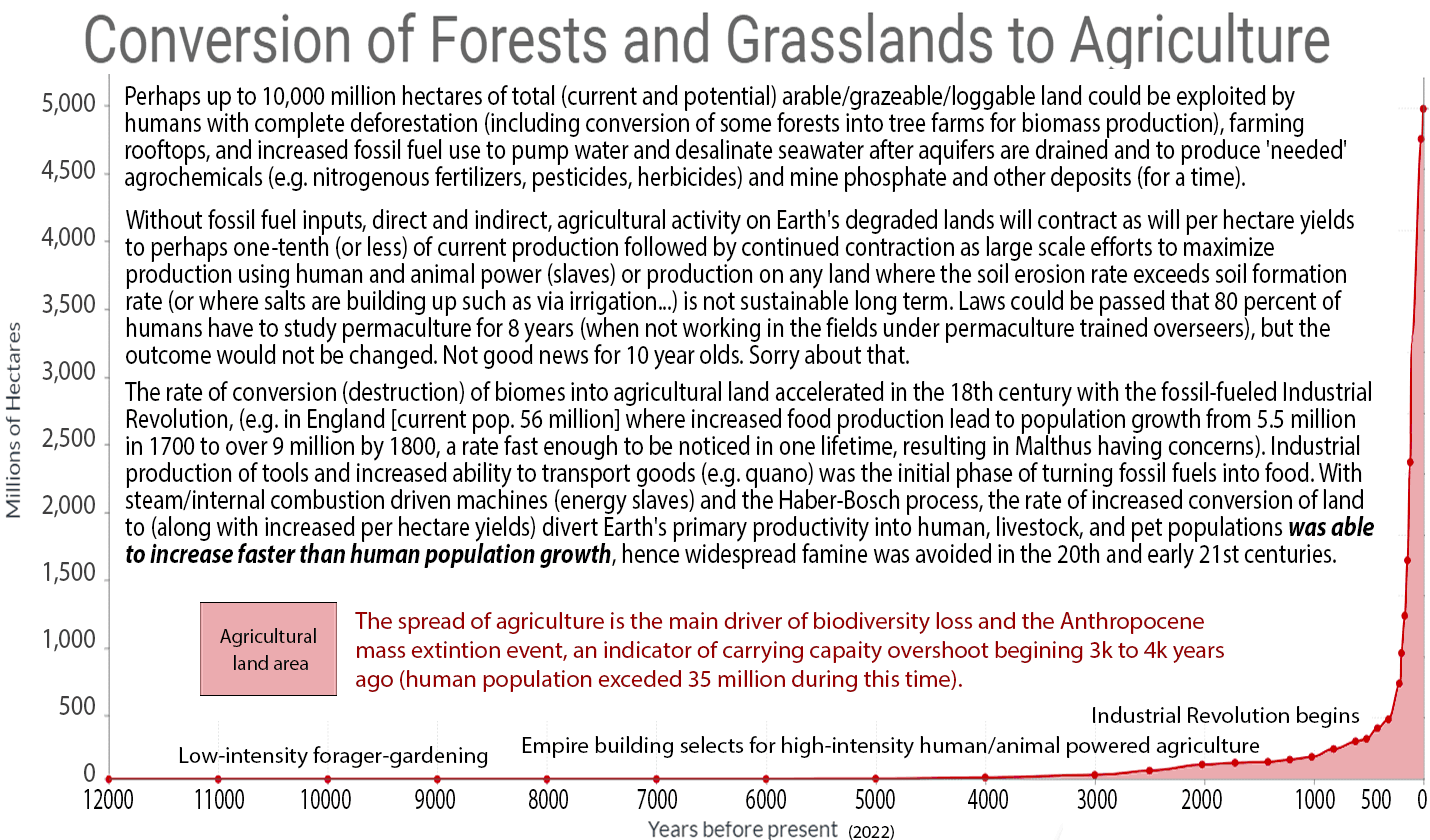
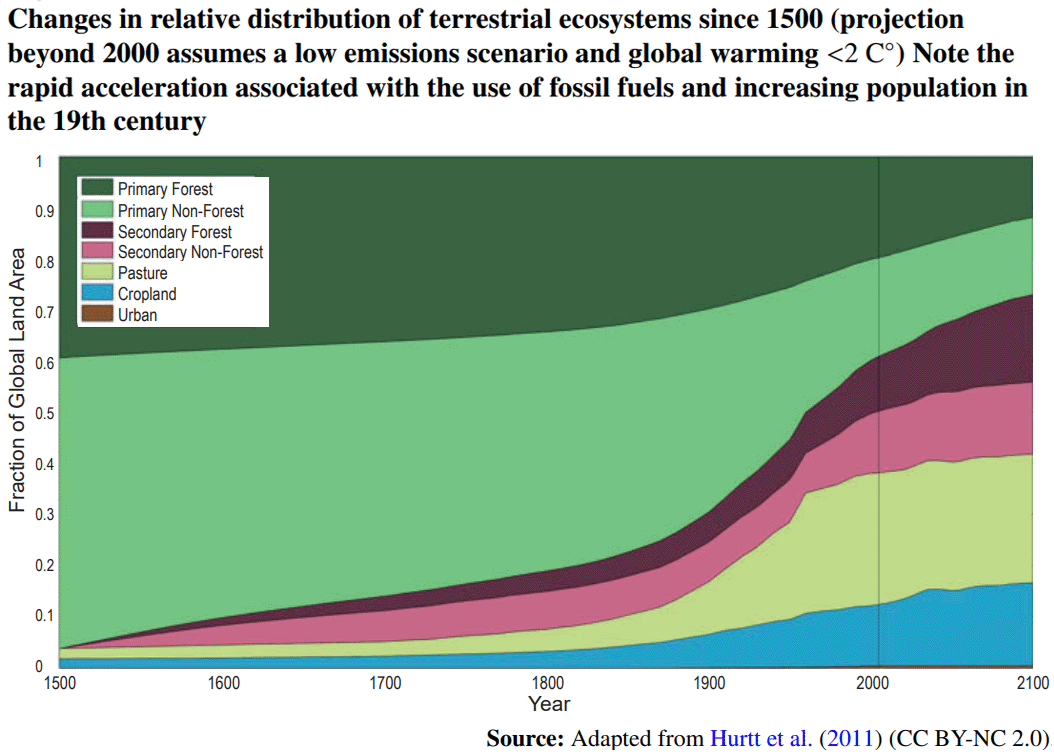
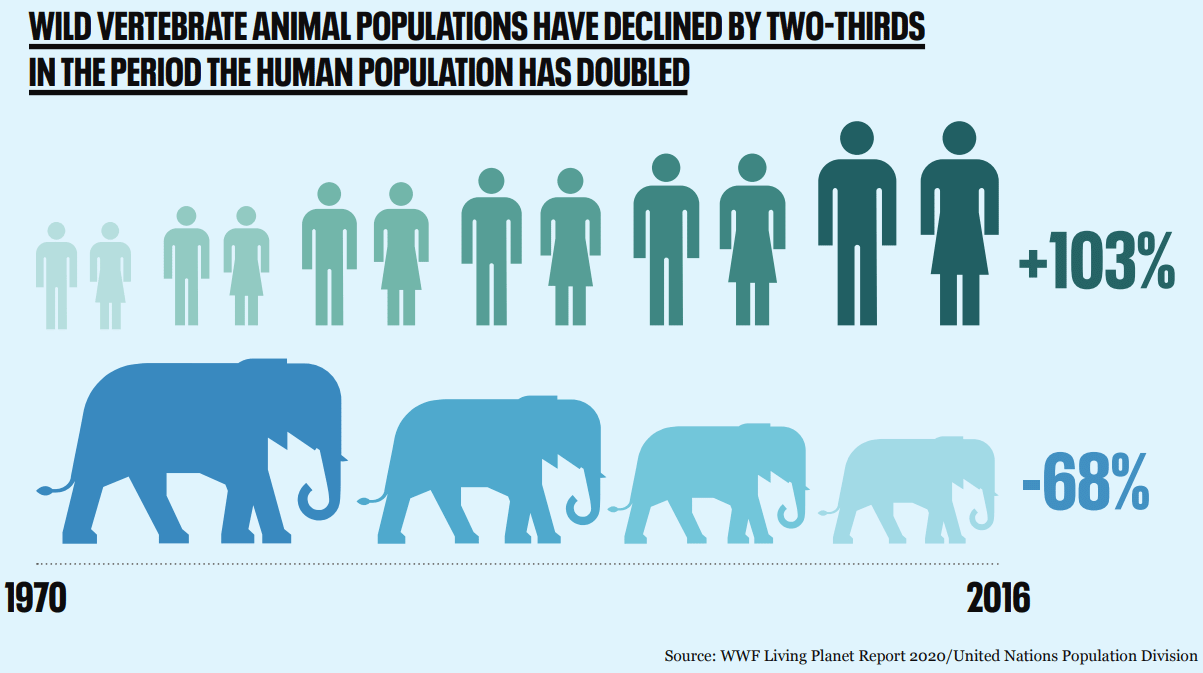
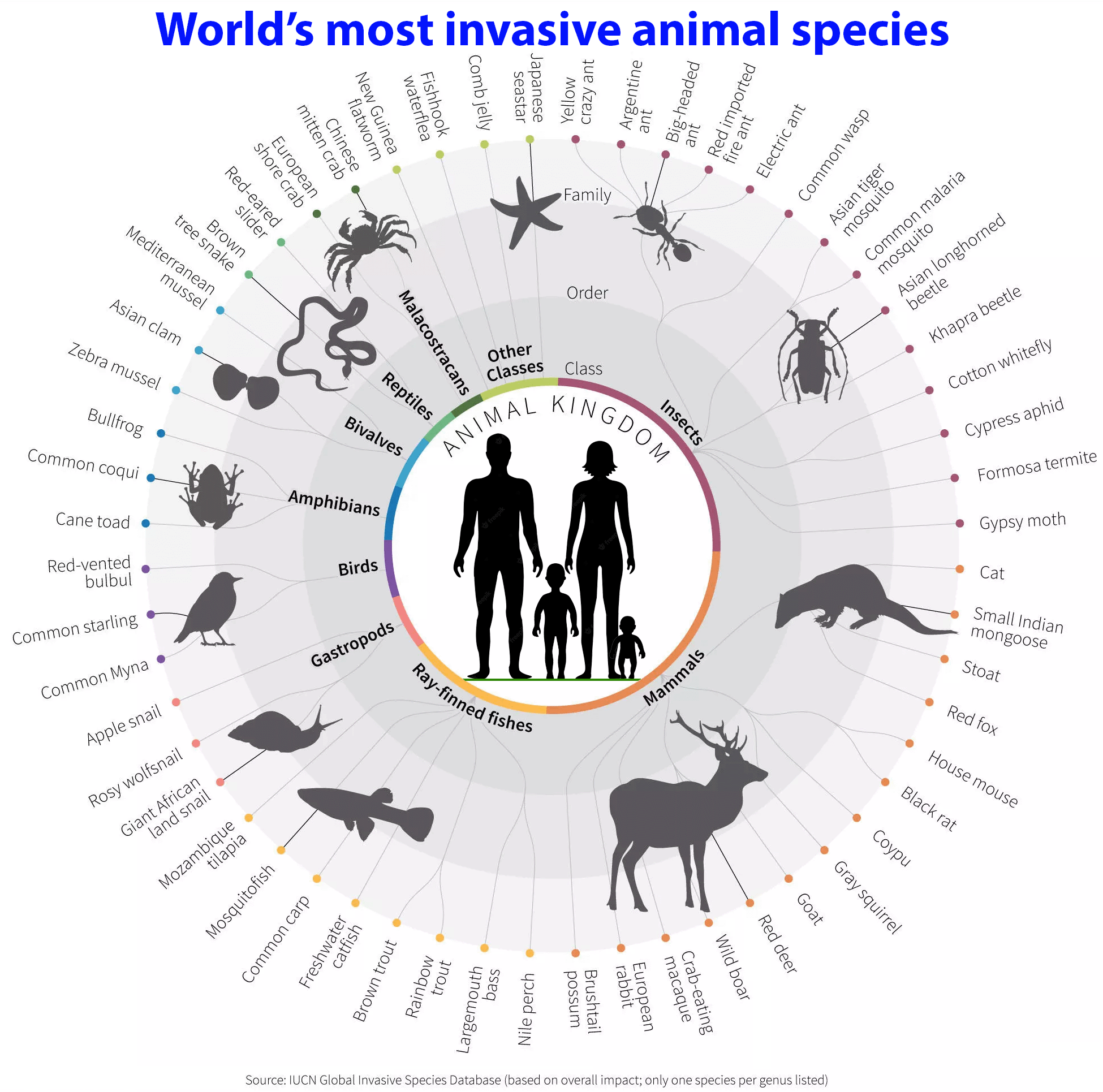
Original graphic omitted the world's most invasive species, cause of spread of most other species, so oversight corrected.
Most invasive species, with one exception, have the potential to transition to a naturalized endemic
form able to persist.
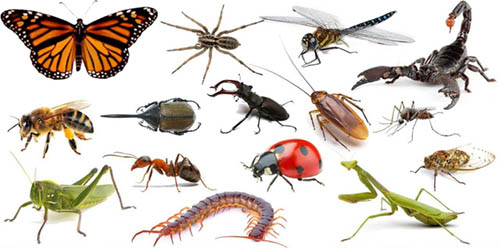
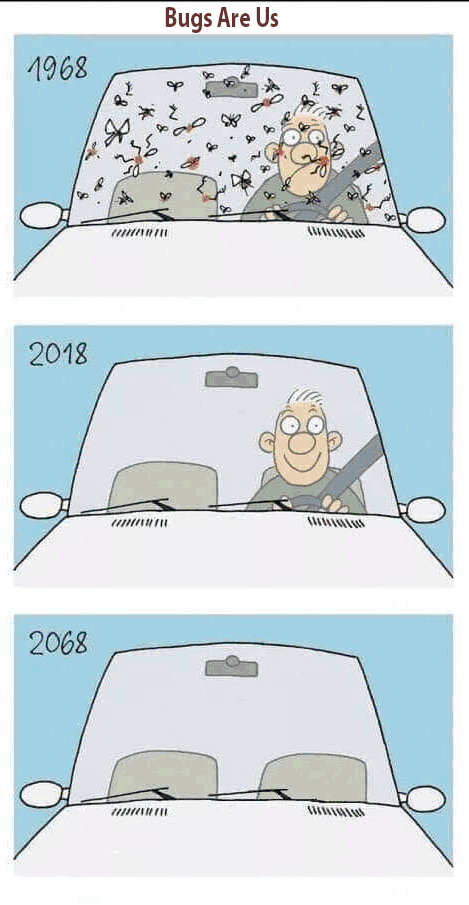 More than 40% of insect species are declining and a third are endangered. The rate of extinction is eight times faster than that of mammals, birds and reptiles. The total mass of insects is falling by 2.5% a year, so there will be half as much insect biomass in 28 years IF the rate of decline remained constant rather than increasing. Insects are by far the most varied and abundant animals, outweighing humanity by 17 times. They are "essential" for the proper functioning of all ecosystems as decomposers, food for other creatures, pollinators and recyclers of nutrients. The crisis is global. Intensive agriculture is the main driver of the declines, along with urban/industrial development, (aka "sustainable development") and climate change. In Puerto Rico there was a 98% fall in ground insects (e.g. beetles) in 35 years. Butterflies and moths are among the worst hit.
More than 40% of insect species are declining and a third are endangered. The rate of extinction is eight times faster than that of mammals, birds and reptiles. The total mass of insects is falling by 2.5% a year, so there will be half as much insect biomass in 28 years IF the rate of decline remained constant rather than increasing. Insects are by far the most varied and abundant animals, outweighing humanity by 17 times. They are "essential" for the proper functioning of all ecosystems as decomposers, food for other creatures, pollinators and recyclers of nutrients. The crisis is global. Intensive agriculture is the main driver of the declines, along with urban/industrial development, (aka "sustainable development") and climate change. In Puerto Rico there was a 98% fall in ground insects (e.g. beetles) in 35 years. Butterflies and moths are among the worst hit.
An insect “Armageddon” is well underway beginning with the Great Acceleration of 1950 and the conversion of biomass into humans, crops, pets, and livestock. In the last 30 years flying insects have declined over 75 percent. And 90 percent in 60 years? Home owners are among the most enthusiastic users of pesticides, and consumers expect all their fresh foods to be untouched by bugs. Increasingly no birds sing and no bees buzz. And then what?
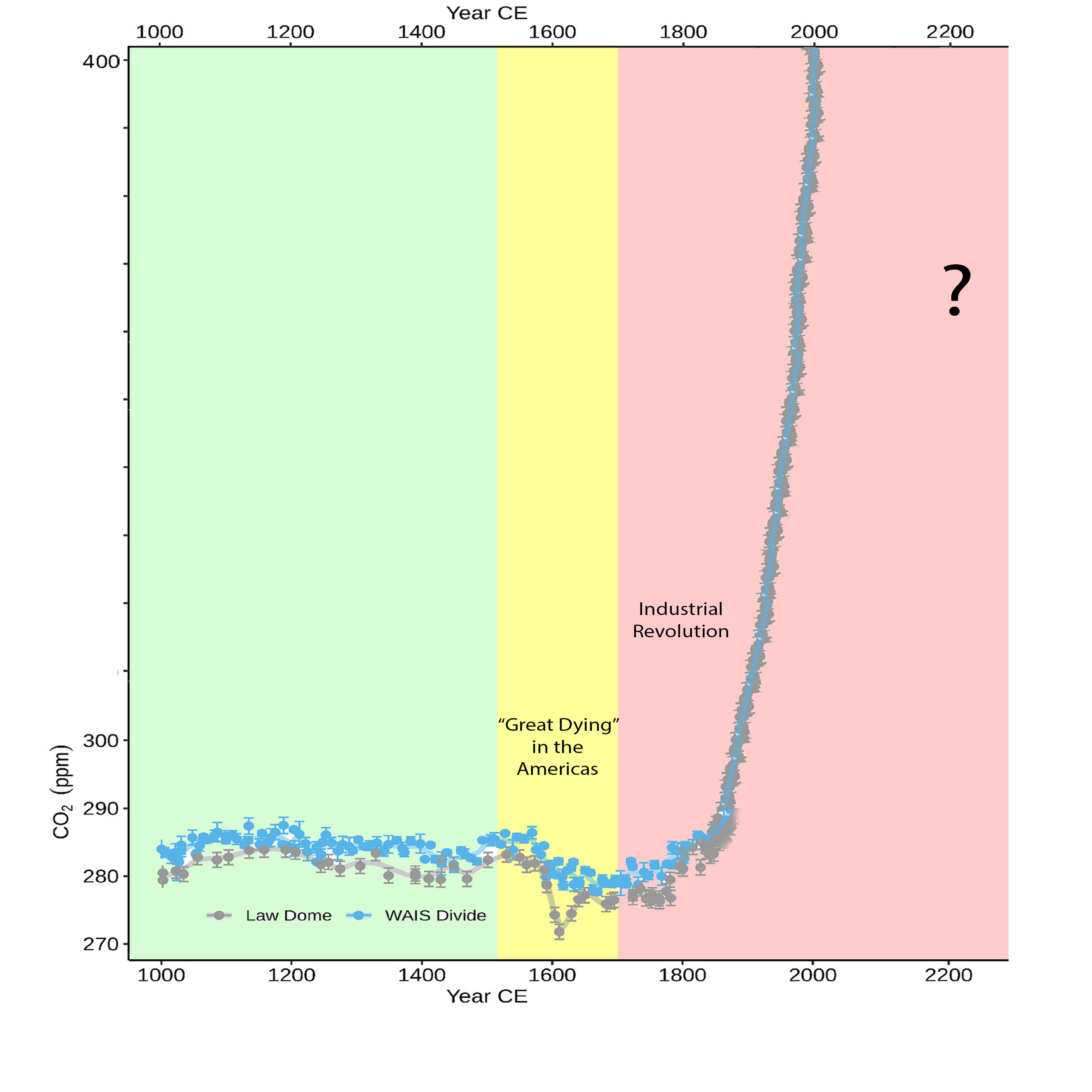 Was the Little Ice Age in the late 1500s and early 1600s, which globally lowered surface air temperatures by 0.15∘C, generated by natural forcing or a result of the large-scale depopulation of the Americas after European arrival, subsequent land use change and secondary succession? Additional uptake of CO2 into the land surface in the 1500s compared to the 1400s, accounts for 47–67% of the atmospheric CO2 decline. The Great Dying of the Indigenous Peoples of the Americas resulted in a human-driven global impact on the Earth System in the two centuries prior to the Industrial Revolution. Was the Little Ice Age in the late 1500s and early 1600s, which globally lowered surface air temperatures by 0.15∘C, generated by natural forcing or a result of the large-scale depopulation of the Americas after European arrival, subsequent land use change and secondary succession? Additional uptake of CO2 into the land surface in the 1500s compared to the 1400s, accounts for 47–67% of the atmospheric CO2 decline. The Great Dying of the Indigenous Peoples of the Americas resulted in a human-driven global impact on the Earth System in the two centuries prior to the Industrial Revolution. So did anthropogenic climate change begin in 1492? Agriculture = change in vegetation/lower CO2 uptake. Rapid human depopulation and restoring 80% of land surface to a pre-anthropocene human footprint level would mitigate rapid climate change. "Seek out the condition now that will come anyway." —Howard T. Odum |
So, WTF? For the geography impaired (most Americans), there is no city brighter than the Chicago metro area in NW North Dakota. Hint? Spoiler alert: The area is covered by oil fields being fracted for more oil to keep gasoline prices down (and give shareholders more unearned income). So until yet another pipeline can be put in to enable ships to take more LNG to China to make more stuff for Americans (and others), the natural gas byproduct has to be flared off. It makes such a pretty light (for a time)!!!! So why are hu-mans still sleeping? |
As seen by NASA, the world is getting greener due to expansion of silviculture and intensive agriculture. China and India—the world’s most populous countries—are leading the increase in greening on land. The greening is anthropogenic, due to fossil-fueled industrial agriculture. Global green leaf area has increased by 5 percent since the early 2000s [arid land when irrigated turns green until ground water is exhausted or there is no fuel for pumping], an area equivalent to all of the Amazon rainforests. One-third of Earth’s vegetated lands are greening, while only 5 percent are growing browner. Anthropocene enthusiasts and ecomodernists, like me, rejoice. China’s outsized contribution to the global greening trend comes from its programs to conserve and expand forests [aka tree farms] to produce future wood products (and incidentally reduce the effects of soil erosion, air pollution, and climate change) as well as intensification of irrigated agriculture in order to feed their large populations [for a time] using multiple cropping practices that have increased food production 35 to 40 percent since 2000 by turning fossil fuel into food to grow the economy. One interpretation of the data: “Once people realize there is a problem, they tend to fix it... Humans are incredibly resilient. That’s what we see in the satellite data.” Humans are fixing the world! Data needs to be interpreted, however. The interpretation is provided by the journal Nature Sustainability (pay-walled article, Feb. 2019, in pay-to-play journal launched Jan. 2018), and is one interpretation (reviewed on NASA Earth Observatory). Caveat emptor. |
|
Concerning the Growth's Mandate of the Industrial Revolution, including the post WWII Great Acceleration on up to the enthusiastic early 21st century growth in India and China who are consuming over half of planetary coal production to stock shelves at the Walmart, etc. near you, "Whatever way you see it, the truth is that humans were merely innocent agents who did not realize that they were catalyzing a strongly positive feedback process that would grow exponentially until much of the easily available fuel had been consumed, and that is were we are now." —James Lovelock, A Rough Ride to the Future, 2014
"If society does not succeed in changing attitudes and institutions for a harmonious descent, the alternative is to prepare information packages for the contingency of restart after crashing." —H.T. Odum "What is the general answer? Eject economic expansionism, stop growth, use available energies for cultural conversion to steady state, seek out the condition now that will come anyway, but by our service be our biosphere's handmaiden anew." —Howard T. Odum, Energy, Ecology, & Economics, 1973 |
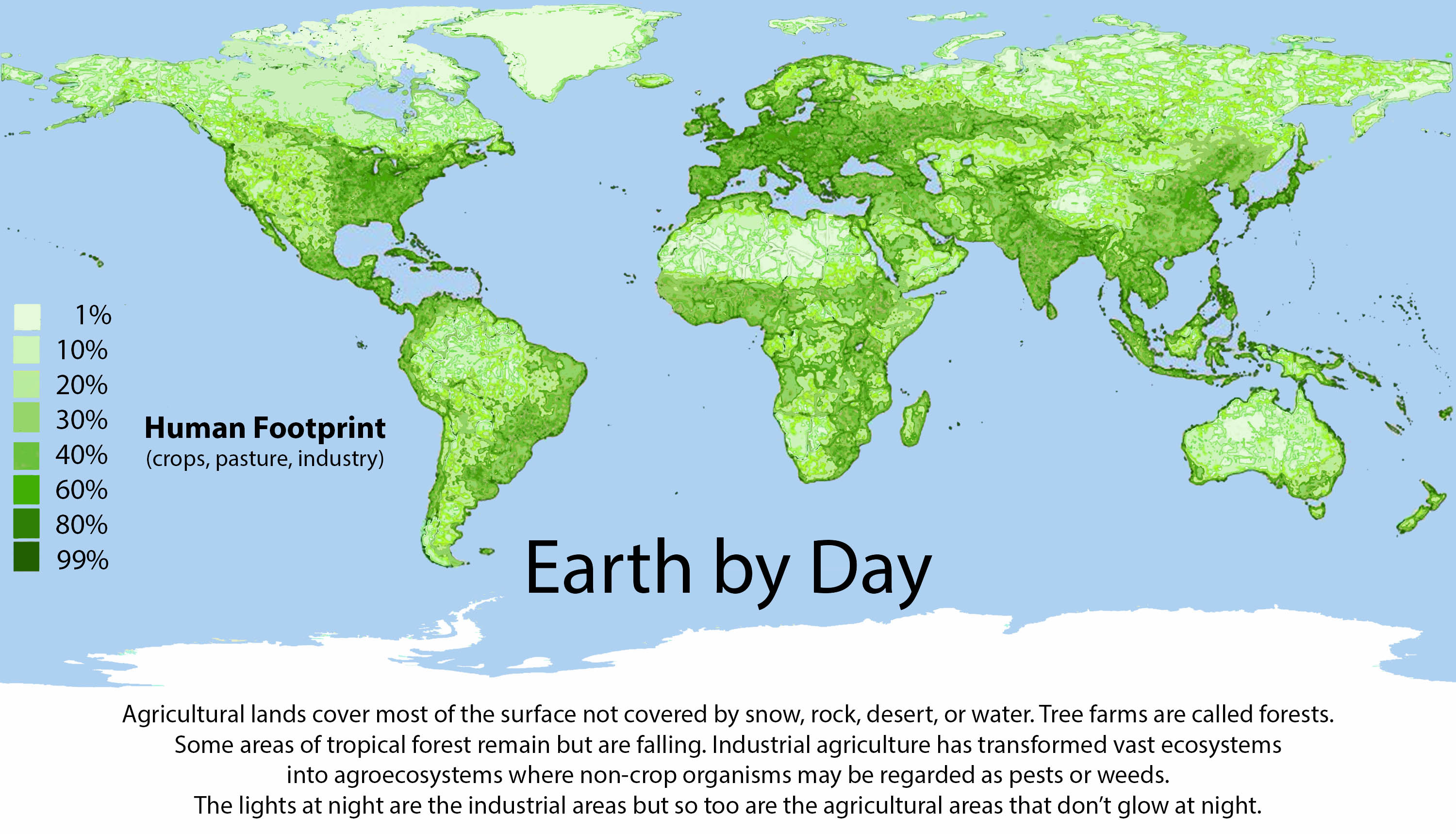
For another view of the human footprint on land and sea with redder being a heavier foot:
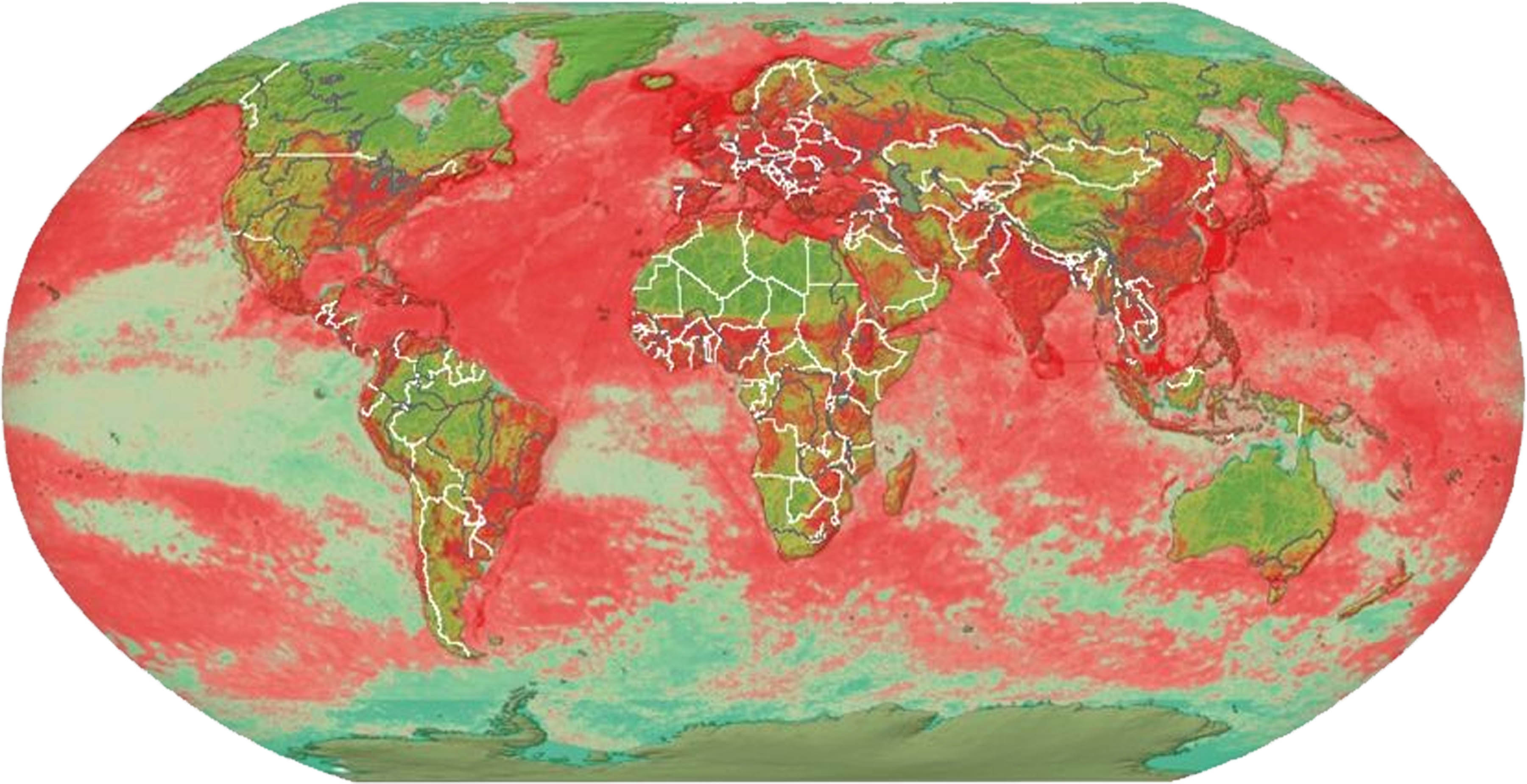
And, yes, ten thousand years ago there wouldn't have been enough red to be visible. In a hundred years from now...?
We have 'altered' 97 percent of the land surface, excluding Antarctica, 80 percent irreparably.
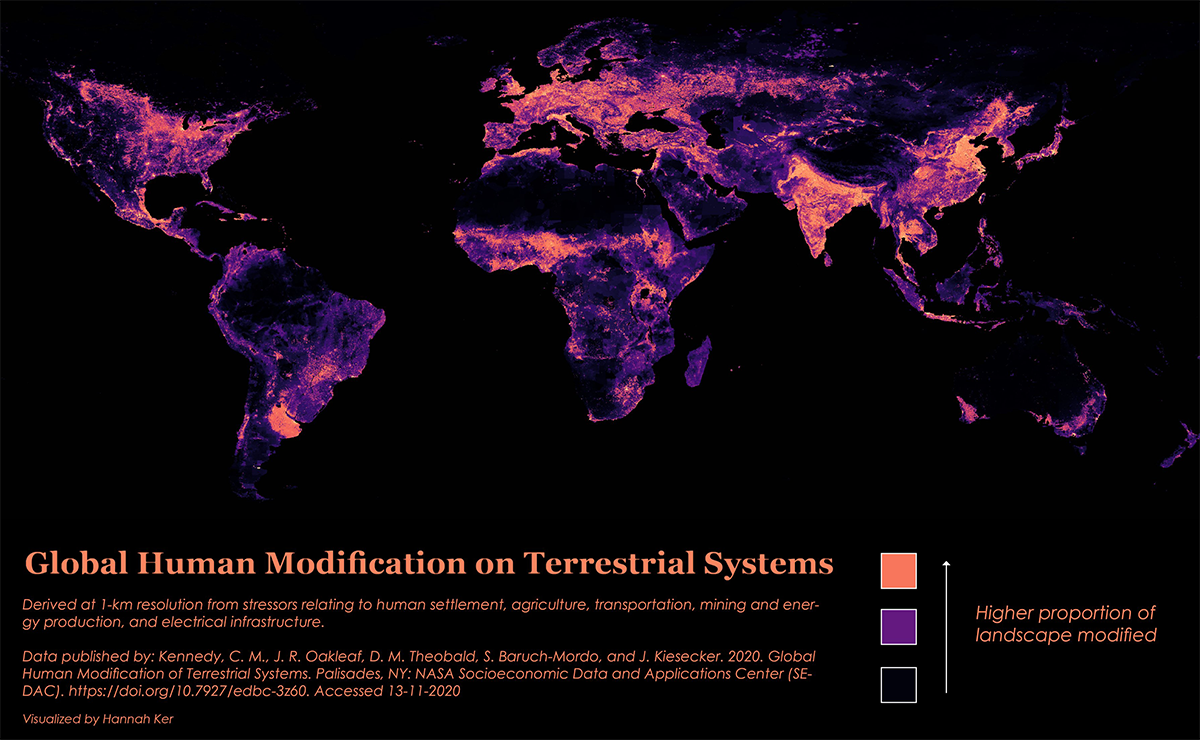
Human activity has impacted Earth's life-support system. Nearly 95% of the Earth’s surface shows some form of human modification (all land having resources for the taking has been 'impacted'), with 85% bearing evidence of multiple forms of human impact, e.g. agriculture including forestry and grazing. From a biosphere POV, human governance is a kleptocracy that may preserve some of nature, for a time, for human recreational use managed by a humancentric control system, economic and political, that is not remotely sustainable. And then what?
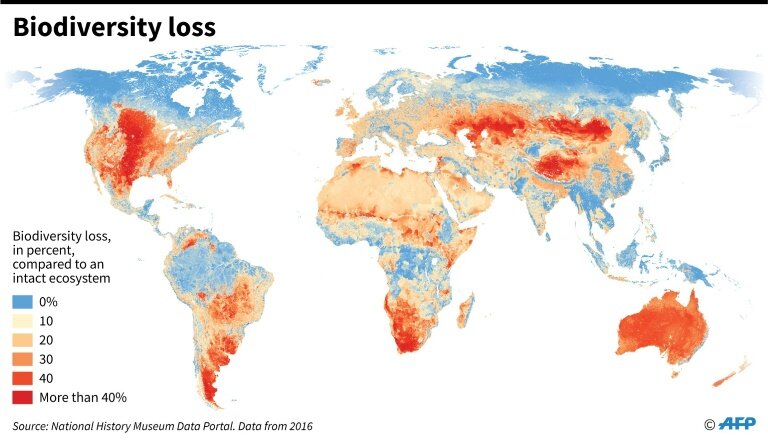
On average around 25% of animals and plants are threatened. The world's population has doubled since 1970, the global economy has grown four-fold, while international trade has increased 10 times over. Urban areas doubled since 1992. Soil degradation has reduced the productivity of 23% of the land surface. Plastic pollution has increased ten-fold since 1980. Only 3% of the world's oceans were described as free from human pressure per UN report and 33% of fish stocks are being harvested at unsustainable levels. Only 13% of wetlands remain. Every year we dump 300-400 million tonnes of heavy metals, solvents, toxic sludge and other wastes into the waters of the world. Climate change likely to increase biodiversity loss 5% to 16%. Land use is the major driver of the biodiversity collapse (as driven by the dictates of Growth's Mandate) with 70% of agriculture related to meat production (meat's got what humans crave). Welcome to the Anthropocene. And, even if there were no climate change whatsoever, then what? [BBC article and a summary]
Meanwhile, in an alternate universe, same week as BBC article above, per The Economist: Global Meat-eating Is on the Rise, Bringing Surprising Benefit. "As Africans get richer, they will eat more meat and live longer, healthier lives." As the 95% earning less than $10/day earn more, they'll eat more bushmeat and commercially produced domestic livestock meats. Things are just getting better and better (for humans, for a time)."The real system is interconnected. No part of the human race is separate either from other human beings or from the global ecosystem. It will not be possible in this integrated world for your heart to succeed if your lungs fail, or for your company to succeed if your workers fail, or for the rich in Los Angles to succeed if the poor in Los Angles fail, or for Europe to succeed if Africa fails, or for the global economy [Euro-Sino Empire] to succeed if the global environment fails."—Donella Meadows, Thinking in Systems: A Primer.

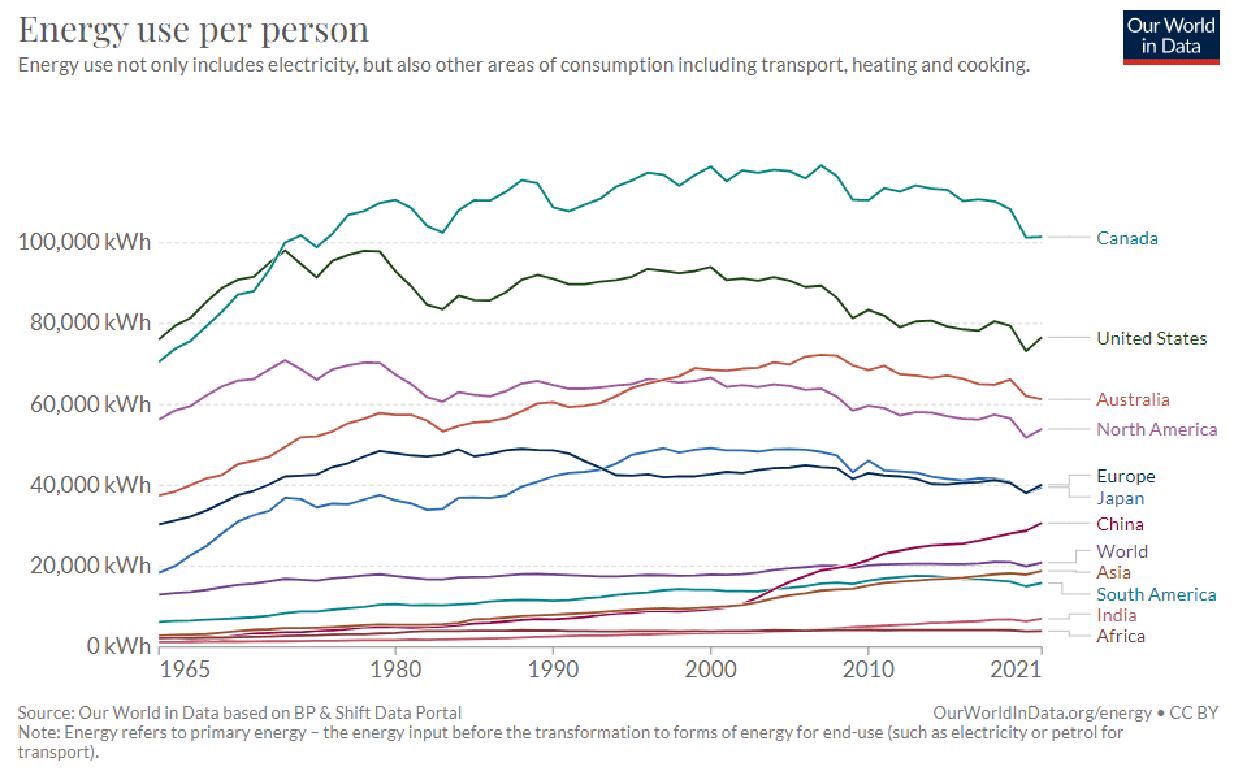
From a global perspective, things (real energy wealth) are still getting slightly better and better. The promises of neoliberal industrial society apologists are still being delivered on (the taking of a planet continues), and so belief in its future, that it has a viable one, persists despite the warnings of Ted Kaczynski and others, even if growth is not as fast as some Anthropocene enthusiasts would like.
Those still consuming at above the world average (a still increasing level) have nothing to objectively complain of by comparison even if their level of consumption is in moderate decline. The above is not a picture of collapse or even climax of the world socioeconomic-political system (collapse comes after climax and a can-kicking descent phase). For those in the West, the rate of growth and the can-kicking to make growth great again began in the 1970s to 2000s, while in China per capita energy wealth has tripled this century, making them the planet's top growth enthusiasts (for a time).
As the Book of Common Prayer quotes, "in the midst of life we are in death," and our climax/descent/collapse trajectory began 50k years ago. In the midst of expansion we are in overshoot and collapse, which was normalized 3k to 7k years ago when 50% of humans, total population of world about 7-35 million, lived in overcomplex societies (e.g. empires) that selected for regional carrying capacity and complexity overshoot and descent/collapse, a dynamic that is climaxing globally this century for the first and (post one-off drawdown of fossil fuels and other nonrenewable natural resources) last time in the form of modern techno-industrial (MTI) civilization (aka the Euro-Sino Empire) that is not remotely sustainable, that has no viable long-term future. Details and timing to the year or decade of future events (e.g. climax) are unknowable, but collapse/dissipation of global MTI society is foreseeable for non-evolvable structures (like our MTIed one).
The prudent human would ask, "and then what?" and given the certainty of individual death, might wonder what a viable form of civilization would look like and work to make it maybe so for posterity's sake.
I am not a prepper nor do I have any plans for my family to survive as apart from a viable form of civilization there is no long-term future for our species let alone our tribal identity group however large or small.
If it comes to deciding whether to eat others or be eaten, our endgame is over. I will pass on to family members information about DIY at-home self-euthanasia and suggest leaving a 'bon appétit' note that no poisons were used to cause death.
.

Because there is no Planet B, there is a Plan A alternative to business-as-usual. Plan A is to work to help turn things around before Planet A is all used up secondary to the practice of business-as-usual. To be a part of solving current issues there are organizations that provide insight and opportunities (e.g. David Suzuki Foundation, MAHB). Should turning things around fail, however, we need a Plan B. Advanced planning, testing and prototyping can be done now to prepare information packages. MAHB: The Population Crisis: A Call to ArmsFrom narrative to propaganda to ?
Some articles are linked to from within other articles:
|
Club of RomeThe Club of Rome, "the first to rebel against the suicidal ignorance of the human condition." Club of Rome members, associations and partners share transformational thought leadership and co-design solutions for impact. "I remember an occasion a decade ago [in 1983], when the Club of Rome had persuaded a dozen prime ministers and presidents to discuss world problems with us. We were agreeably surprised by the extent of understanding of the longer term issues which these political leaders displayed. Why then did they not act? At the end of the meeting one of them summed up his position by saying that they all more or less accepted the Club of Rome's position [when California governor Jerry Brown left office, one of the first things he did was go to Europe to a Club of Rome meeting which the press ignored], despite their ideological difference. However, were he to act on this substantially, he would be out of office, not at the next election, but in a few months. It would take his successor some years to understand the basic problems and if he reacted as he should, equally he would be eliminated politically. The only solution lies in an increase in depth and extent of public understanding of the dangers which confront us." [From letter to Don Chisholm, 1993, by Alexander King, President Emeritus and Co-Founder of the Club of Rome.] President Xi must also serve the short-term self interests of members of the Chinese Communist Party (who must serve the People), or he would be out of power 'in a few months'. Kim Jong-un must serve his system as did Shenzong (Emperor of China) whose word was literally law, who was yet constrained by the system/events. The last Emperor of Rome had to serve his Praetorian Guard until he couldn't. There are no potentates apart from the system all serve. We the People in various self-serving super-tribal forms auto-organize into competing special interest factions. Politics in all forms must end and will when enough humans (perhaps 0.01%) understand that they must cease to be humancentric (become naturcentric again or die) and instigate a new form of global governance.  One Book to Save the WorldThinking In Systems by Donella Meadows. If you are less-than-clear that human society at large is unsustainable, perhaps this isn’t the blog entry for you. Resilience.orgArm of Transition Movement: 'a community library with space to read and think, but also as a vibrant café in which to meet people, discuss ideas and projects, and pick up and share tips on how to build the resilience of your community, your household, or yourself'. Consider: To What End? Question EverythingWhen what is happening in your world doesn't make sense, when it doesn't conform to your beliefs about how things should work, it's time to ask hard questions. The Simpler Way: Envisioning a Prosperous DescentA recent article by Ted Trainer. 'The global economy is undermining the ecological foundations of life, producing perverse inequalities of wealth, and spreading a cultural malaise as ever-more people discover that consumerism cannot satisfy the human craving for meaning [a life-driven purpose]. While industrial civilisation continues this inevitable descent, humankind is being challenged to reimagine the good life, tell new stories of prosperity, and get to work envisioning and building a new world within the shell of the old'. Transition Theory. 15/15\15: Magazine for a New CivilizationA magazine for degrowthers, transitionists, peak-oilers, and radical ecologists seeking a paradigm shift. The human predicament viewed through a political lens darkly. Founded 2015 based on a projection that in 15 years (2030) there would be no more than 15% of the energy with which oil had been supporting the Growth Civilization. A Prosperous Way Down: Our civilization can thrive in a future where we can live with lessA view through the macroscope via energy principles. Approaching the Limits to GrowthPaul Chefurka's journey of discovery through the worlds of energy, ecology, economics and human culture, 2007-2013. Consider his note on Carrying Capacity and Overshoot. Al BartlettThe greatest shortcoming of the human race is our inability to understand the exponential function. Stanford Knowledge Integration LaboratoryTo understand the causes and cures of "temporal blindness" (lack of temporal causal cohesion) and thus create "cognition based solutions to global problems" Scholars: Change the Coarse un-DenialThe purpose of the universe...is to increase entropy. The universe abhors an energy gradient and life is its best invention for degrading energy gradients. Humans are the champions of life at degrading energy, and from this perspective, may be the universe’s pinnacle of invention. Long-run global economic growthTo what extent does our global economy rely on raw materials and energy? Can we decouple global economic innovation and growth from climate change? The Seneca Effect: What It Is and Why It Is Important For Us'It would be some consolation for the feebleness of our selves and our works, if all things should perish as slowly as they come into being; but as it is, increases are of sluggish growth, but the way to ruin is rapid'. (Lucius Annaeus Seneca, 4 BCE-65 CE) Do the MathOne of my most important messages is that we need to shake the religion of growth. We simply can’t continue growing indefinitely. Either we use our brains to plot a trajectory into steady-state and hope it’s smooth, or we let nature decide how to deal with us. Download: Energy and Human Ambitions on a Finite Planet Articles by Nate HagensAs posted to The Oil Drum 2006-2013.And watch Nate's 150 hour university course boiled down to 4 hours of 34 video bites for those of us with ADD, Reality 101: What every student (and citizen) should know, and read Economics for the Future.  Jay Hanson and Dieoff.comI developed an interest in "sustainability" about fifteen years ago when it became clear to me that our present economic system was totally unsustainable and self-destructive. Alice Friedemann the Energy SkepticPeak Energy & Resources, Climate Change, and the Preservation of Knowledge: Collapse or Extinction? After worldwide oil production peaks, there are no substitutes ready to make up the energy shortfall. Cassandra's LegacyThis blog deals with the decline of the availability of natural resources, climate change, ecosystem disruption and why all that is happening. The future may not look bright, but it is still possible to face it if we don't discount the alerts of the modern Cassandras. Our Finite WorldExploring how oil limits affect the economy. AdrastiaAdrastia comes from the ancient Greek Adrasteia: "which one can not escape". The Adrastia Committee aims to anticipate and prepare the decline of the thermo-industrial civilization in an honest, responsible and dignified way. MAHB: Millennium Alliance for Humanity and the BiosphereThe Millennium Alliance for Humanity and the Biosphere: Responding to the human predicament. Reducing the threat of a shattering collapse of civilization. Wellbeing Economy: An Alliance to Save the World and maybe HumanityBring about a transformation of the economic system, of society and of institutions so that all actors prioritize shared wellbeing on a healthy planet. Blue Planet Club: For Blue Planet GovernanceThe name Blue Planet Club is chosen to bring our focus toward the pale blue dot, as planet Earth appears when seen from deep space. The pale blue dot name was suggested by cosmologist Carl Sagan in hopes that the fragile appearance of humanity’s only home may arouse within us the emotional and spiritual response need to help us deal with the deteriorating state of our natural world. The Real Green New DealAddresses: 'overpopulation, ending U.S. empire, restoring democracy while shifting to new political systems..., economic de-growth, what aspects of modern life can be retained in an energy de-intensified world, taking action outside the system now.' To quibble: there is no 'U.S. empire', merely a vestige that, like all other former sovereign powers, has been subsumed into the global 'monetary culture' of the Euro-Sino Empire that almost everyone is part of and serves. As for 'restoring democracy', ultra-humancentric democracy has served empire-building well, so more democracy will select for making empire-building great again, which will fail to destroy the technoindustrial hegemon of empire-as-usual. But otherwise the RGND vision is practically perfect in every way, although offering 'the truth' is political-speak as usual. In science one iterates towards maybe knowing something with all claims considered. Consciousness of Sheep: The storm is coming — will you be ready?'A running commentary on the slow motion train wreck that is Western civilisation in general and its British variant in particular. My sole aim with this website is to raise awareness of the predicament of the “three Es” (Economy, Energy and Environment).' How to Save the World: 7k+ pages and counting'Our purpose on this planet is to play, responsibly, sustainably, lovingly, joyfully, with each other, as part of all-life-on-Earth. To have fun.' For prattle on steroids, enter the conceptual house of mirrors of Dave Pollard where concepts reference only other concepts. A true believer in belief, a consummate doomer dilettante for the discriminating doomer since 2003. Using mind to seek Mind really is the greatest of all mistakes. Collapse Blogosphere: They are out thereThere is an apparently vast blogosphere for doomers out there that I, as extreme cornucopian optimist, have no interest in. Yet as a gateway drug, The Doomstead Diner contains information that may be of interest to those who can overlook the flashing lights, videos, and vet their sources. The click-bait format, however, will appeal to the teaming multitudes. But the Doomer Dynamic is fruitful and multiplies: Problems, Predicaments, and Technology  LIFEITSELF: Tad Patzek, professor of doom"In this blog, I continue to write about the environment, ecology, energy, complexity, and humans. Of particular interest to me are human self-delusions and mad stampedes to nowhere." The Pelican Web: Home of Mother PelicanA Journal of Solidarity and Sustainability. A bit outside my domain of discourse at times, but science literate and stretching is of value. Nephologue: Exploring the interplay of thermodynamics, economics, and climateTim Garrett, U of Utah. Damn the Matrix : Or why the world is going to hell.So, are you cool with getting poor? Wrong Again: Climate change is not a distractionBecause climate change has been politicized (and despite the near certainty that our trajectory of overshoot and collapse will be about the same even if a magic button could be pushed and the climate went back to 20th century norms for the coming millennia) the military can start to think the unthinkable BECAUSE climate warriors have declared fighting climate change to be this generation's 'WWII'. Per military intelligence, 'Mitigation of new large-scale stresses requires a commitment to learning, systematically, about what is happening...focused on Systems Thinking .... When the facts do not match our strong theories for how the world works, we prefer to change the facts. How can we more quickly recognize the unexpected for what it really is?' Beware the black swan. Surplus Energy Economics: How the economy REALLY works – Tim MorganThis site is driven by the understanding that the economy is an energy system, and not (as conventional thinking assumes) a financial one.
30 Visions of Sustainability: 2017A curious zeitgeist document by a German multi-national mining company that interviewed 30 experts in various fields including science, economics, philosophy, technology, politics and management, with a focus on sustainability to bake a 30-layer cake. Do you believe in the ignorance of experts?
Rethinking Everything: – George Mobus'I am on record for believing that civilization is close to collapse and one might readily suppose that I would think it too late to rethink what we are doing', but.... MEGACANCER: Exploring the pathology of industrial civilization – JamesThere is only one possible catagory: Uncatagorized. The concerns expressed are outside the consensus narrative.
Reg Morrison: A fresh perspective on lifeOur time-bomb is mysticism. Its delivery system is language. And its hiding place? The unfathomable coils of our DNA.Our time bomb is our belief in belief.
Of Two Minds: Charles Hugh SmithThe notion that consequence can be as easily managed as PR is the ultimate artifice and the ultimate delusion.
Doomberg: Chicken Little gets a terminal.Discriminating doomers pay for their fresh meat. Doom-leaning bias, but often publish factual information that utilizes loaded words (wording that attempts to influence an audience by using appeal to emotion or stereotypes) to favor doomer concerns.
Collapse Musings: Alan Urban muses.Subscribe to read, go to survialist store to shop. Read his stuff on Medium if you subscribe to Medium (but free to read titles).
George Tsakraklides: Deep Doomer Dude.'As an ordinary passenger in our doomed car, I refuse to go down the cliff without the dignity of being self-aware of my situation, as much as I know that the brakes are already broken. I prefer to stare the abyss in the eye and die with my eyes open, rather than looking down the LCD abyss of my phone, scrolling through the memes of The System. Unapologetically hopeless, defiantly desperate'..., but alive and well, a thriving pathogen signaling on social media.
Surviving C21: Our existential emergency, by Julian Cribb.Politics is one of the four great mass delusions (the others are money, religion and humanism).Our World Together:The global crisis of sustainability.We can’t solve a problem if we do not understand its nature and scale. (1) (2) (3)
OK Doomer: Jessica Wildfire's blog.Sometimes, you just want to know you’re not alone. That’s the point of OK Doomer.
Post Doom: Regenerative conversations exploring overshoot grief, grounding, and gratitude..Michael Dowd has a foreboding sense of climate chaos, societal breakdown, and economic and ecological “doom” is now widespread. Acknowledging our predicament and working through the stages of grief takes one only to the midpoint: acceptance. What lies beyond? Michael Dowd (with occasional co-hosts) invites 90 guests (recorded over 4 years) to share their personal journeys along this trajectory and especially the gifts they have found on the other side.
Problems, Predicaments, and Technology: This blog covers many different aspects of ecological overshoot.The Reverend Erik Michaels believes we modern humans are well into ecological overshoot.
Doomers’ Visions of the Future: Primer on the diversity of beliefs held by the best doomster minds.Dante's (Charles') guided tour of hell (as/is other people).
Aurelien: Been there, done most of it. Time to write about it now.Western governace insider, retired, who may know enough to have an opinion about how the world socioeconomic-political system works, which adds to a biophysical understanding of how the world system works. No apparent interest in understanding viable futures.
B: The Honest Sorcerer.A critic of modern times, offering ideas for honest contemplation... How he came to believe that civilization is unsustainable.
The R-word.A venue for writings about non-violent, eco-cultural revolution. James R. Martin, independent scholar in human ecology, ecological design and eco-philosophy.
Boiling it down: There are no true stories.
Humanity is colliding with Nature.
A damaged biosphere will persist. We humans may not be part of it. There are no political solutions. ∴ endeavor to tell likely stories. 
|
The Human Problematique Simplified:
Existential threats exist: e.g. that a very large asteroid could make a direct hit with Earth in five years is one possible threat, one that most people can understand and maybe believe in, unlike the threat of multiple system failures secondary to a carrying capacity overshoot event that they cannot. Assume only one threat: in five years a large asteroid will hit Earth per consensus of all scientists who know enough to have an opinion (prior to issue becoming politicized).
Real solutions may exist: Politicians, policy makers, bureaucrats, CEOs, generals, educators, monarchs, entertainers, almost all experts and voters, however, need to stand down and listen to Nature (or at least those who endeavor to listen to Nature) who has all the answers, i.e. realize that they don't know enough to have an opinion as to what to do (e.g. to divert an asteroid or prepare for some to survive the impact), and therefore should offer carte blanche help to those few who endeavor to listen to Nature (e.g. engineers, astrophysicists), who will then tell them what to do to help save humanity (maybe) and the biosphere (if a majority of people vote to do so). If a large asteroid is going to hit Earth in five years, don't expect anyone now in power to know what action to take that might work to divert it or allow for a remnant human population to maybe survive on the side opposite the impact.
 The greatest existential threat to humanity, however, is not an asteroid, but modern techno-industrial expansionist society. The politicians, policy makers, bureaucrats, CEOs, generals, educators, monarchs, entertainers, almost all experts and voters are part of the remorseless dynamic that selects for overgrowth, overshoot, and collapse.
The greatest existential threat to humanity, however, is not an asteroid, but modern techno-industrial expansionist society. The politicians, policy makers, bureaucrats, CEOs, generals, educators, monarchs, entertainers, almost all experts and voters are part of the remorseless dynamic that selects for overgrowth, overshoot, and collapse.
There are solutions, but no political solutions, so political animals are locked into their trajectory. Anyone who understood this would cease to believe in political solutions, could cease to be a political animal. You could make me World Dictator if enough would, but “you” collectively can’t. A few might vote for me, maybe 0.1% could vote for a real solution, but that’s not enough. Understanding this is to vote with your feet.
Those who think they may know enough to endeavor to think well about threats to humanity and the biosphere (and possible real solutions) will have to globally auto-organize per life-driven purpose, consider all viable options within time limits, and cooperatively work towards one or a few real solutions, i.e. form a functioning naturocracy obedient to Nature's laws assuming the will of WE THE PEOPLE is to persist (instead of pursue short-term self interests as usual). The basic solution is in front of our collective pug-nosed faces: all rich people become poor people and all poor people, the 8+ billion, become rapidly fewer.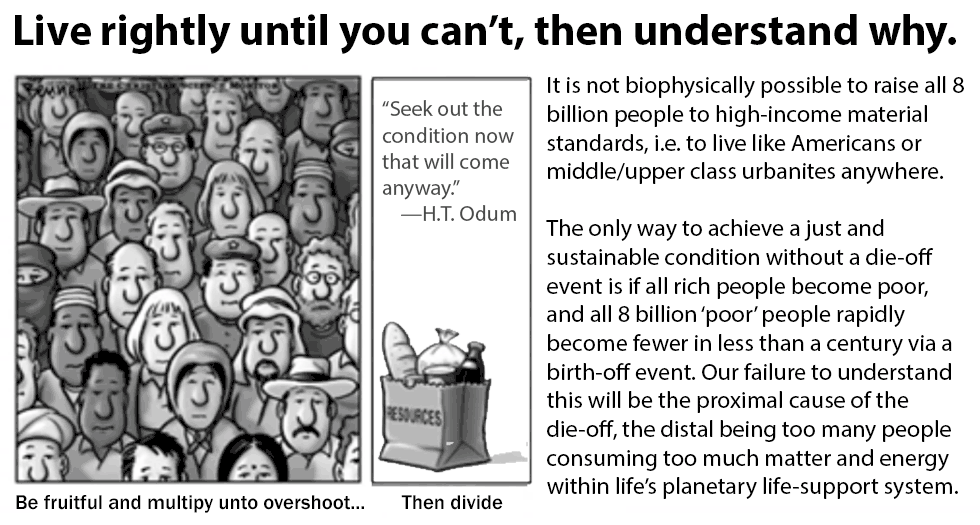
Any reliance on political or religious solutionatiques will have a predictable outcome, as will denial as usual. Failure is an option. Voting to decide if the asteroid exists, forming factions to decide which solution voters prefer if a majority decide that it does exist, will have a predictable outcome. Could Elon Musk put an ark in orbit within five years to recolonize Earth ten years after the impact? Don't count on it. Let go of any belief in belief and see what may follow as there are no true stories (beliefs), only likely stories.
.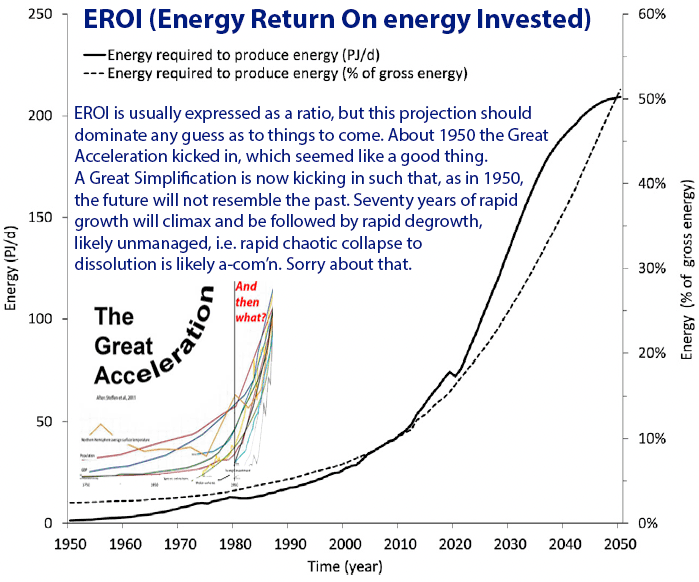
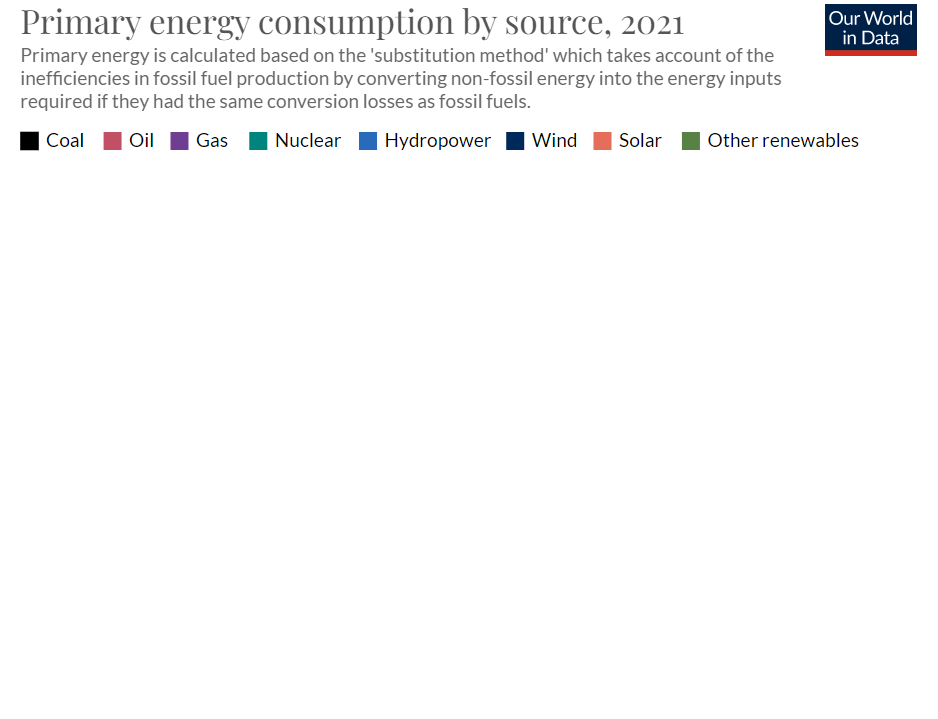
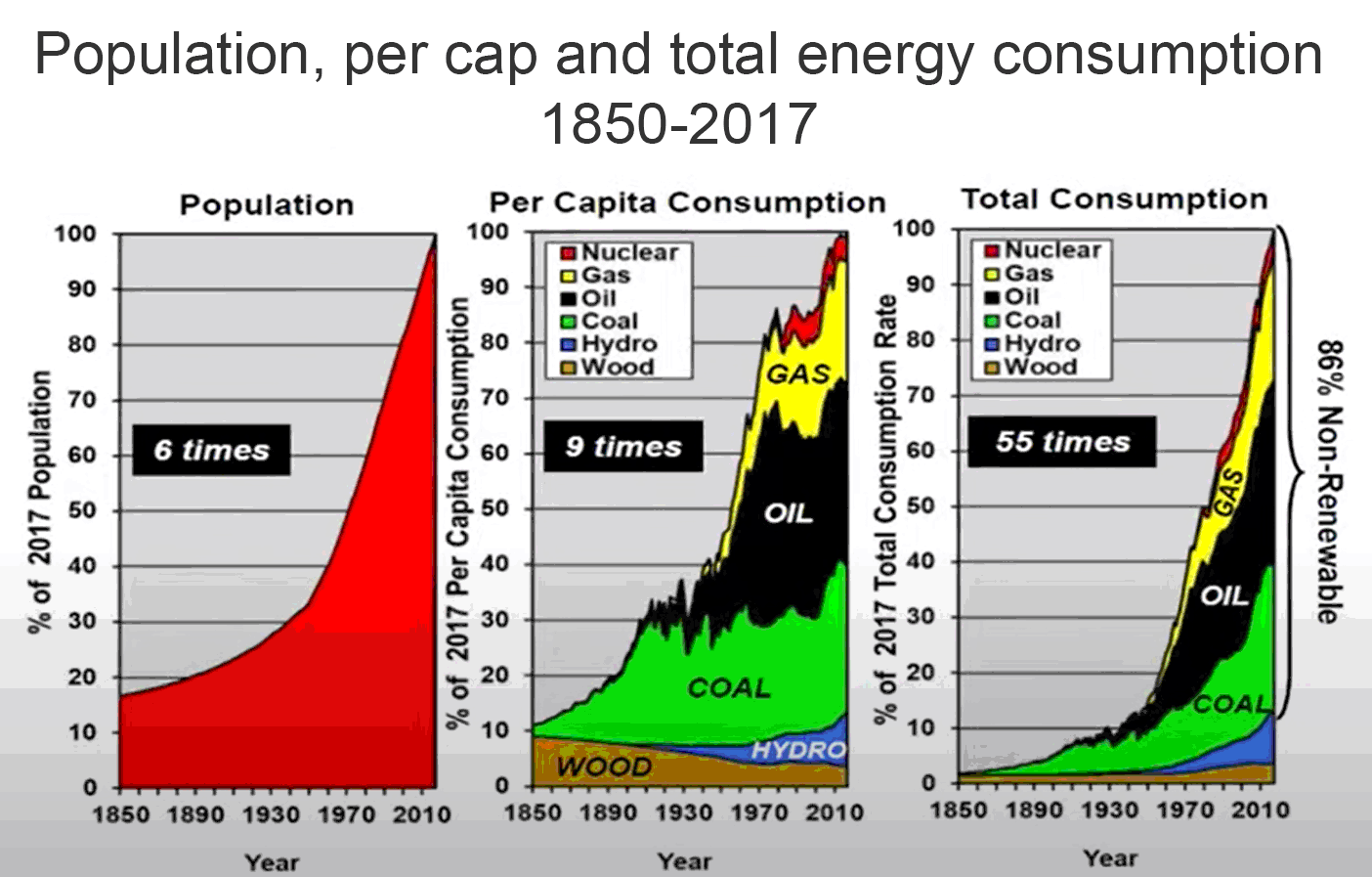
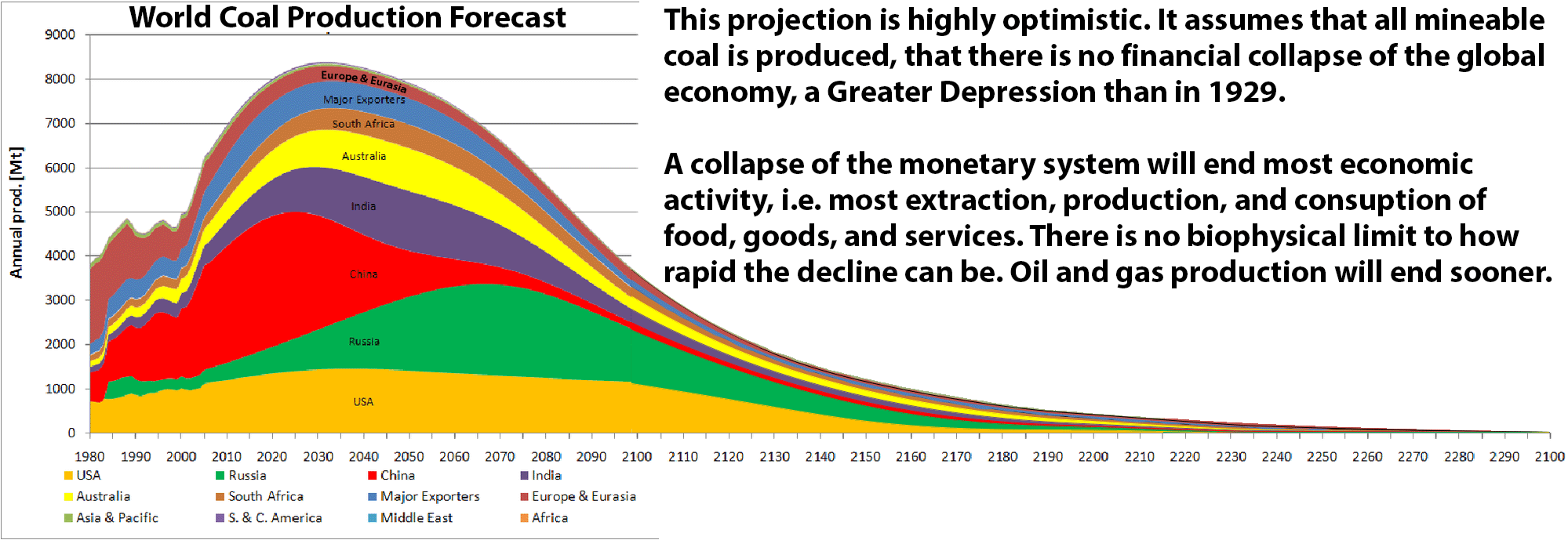
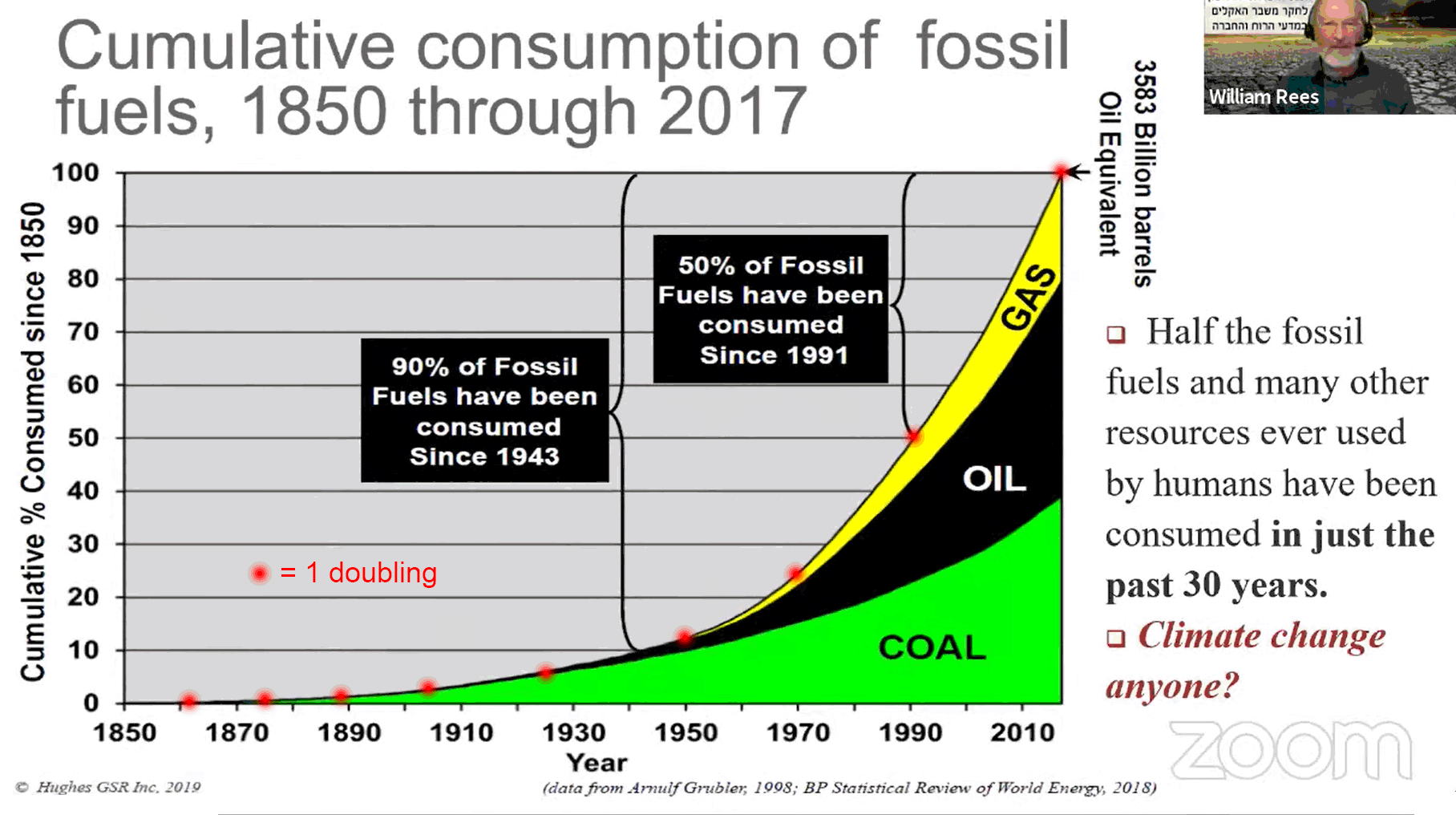
So, 90% of most planetary resources consumed in one lifespan. Consumption will not double again.
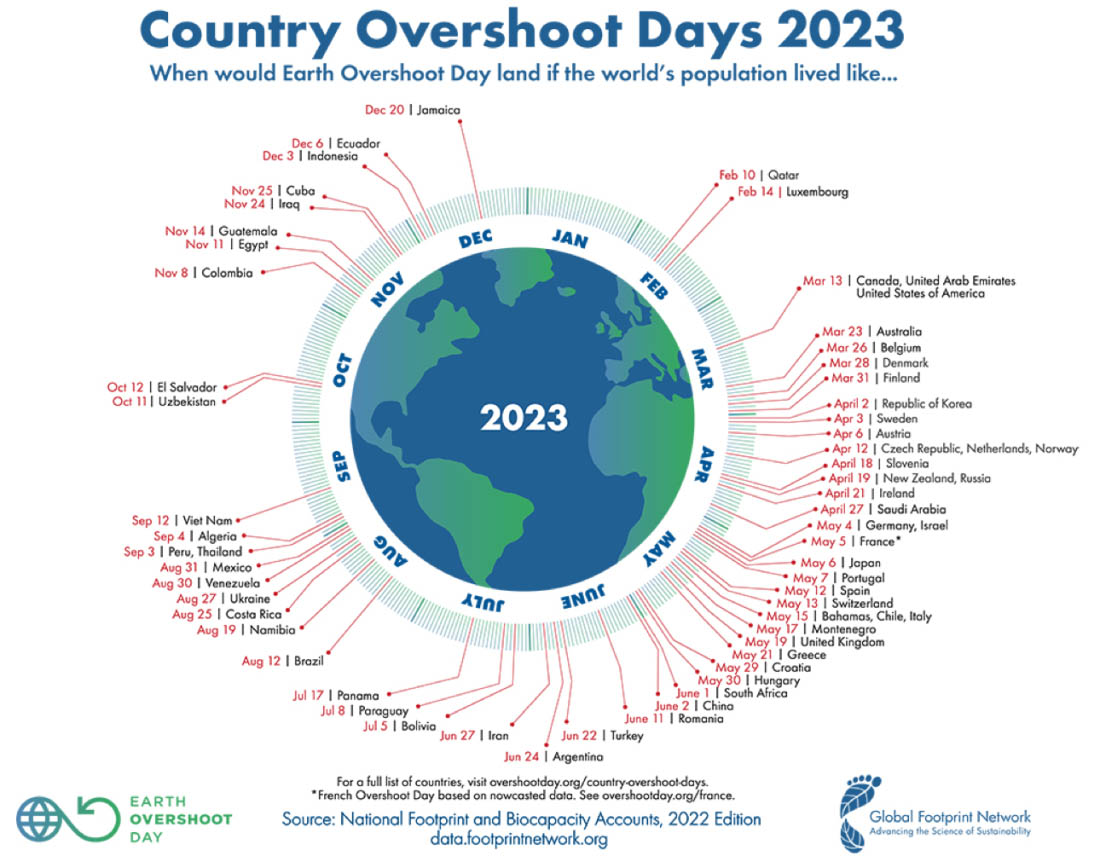
The Overshoot Day metric/meme, however, may underestimate overshoot.
Still,
the condition of being in overshoot is by definition not sustainable.
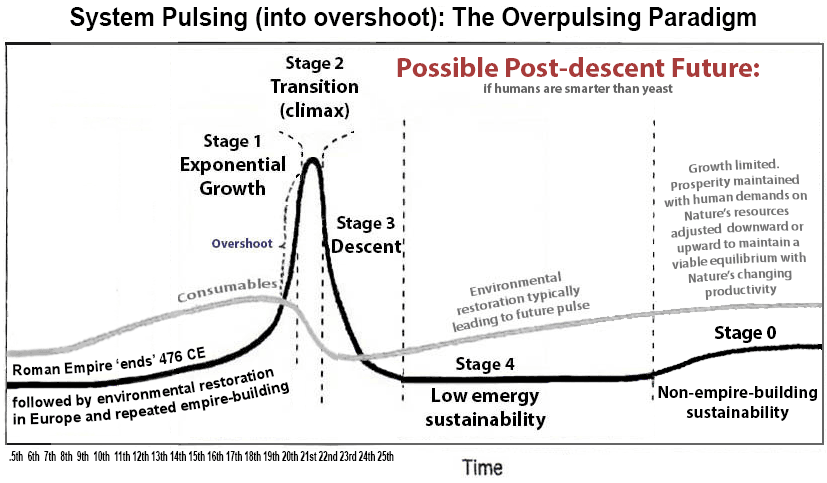
Energy is the wealth of nations. We can print money, but not energy.
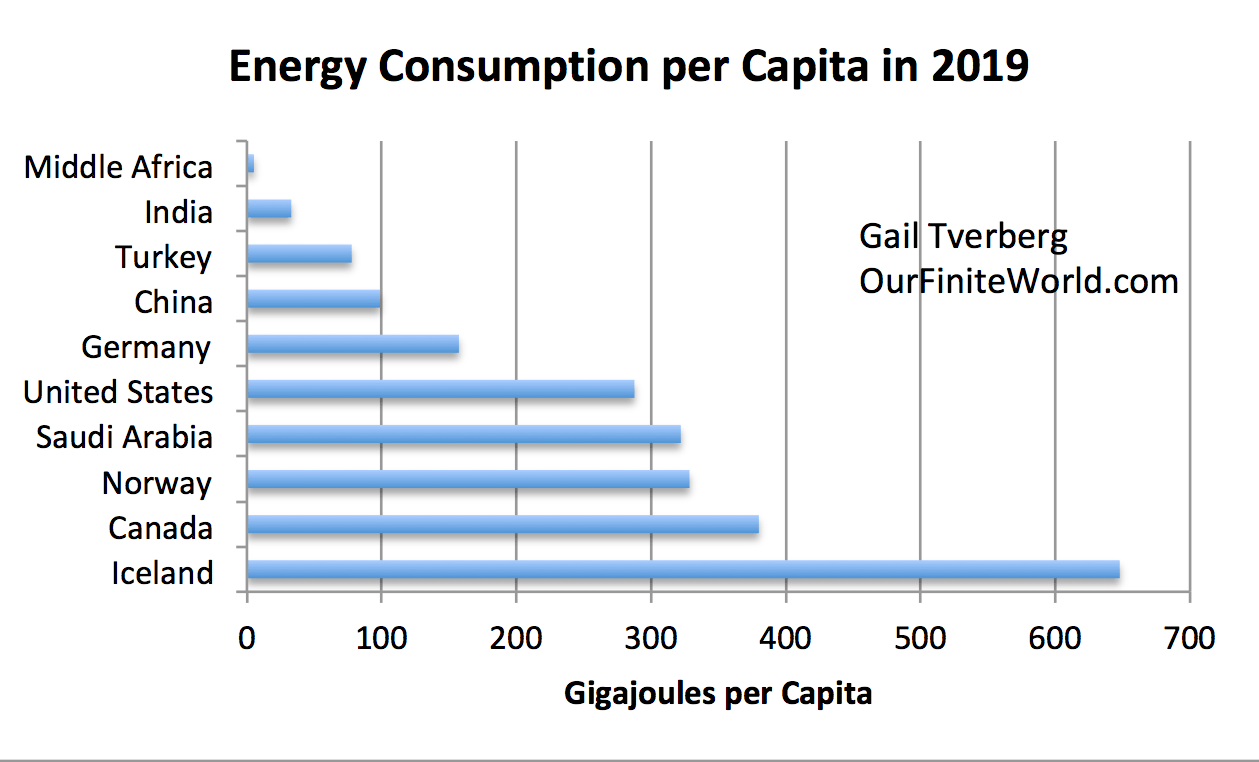
One form of energy is electricity. Imagine a world were per capita electrical energy use averages 50Wh/person/day in a range from 40Wh/poor person to 60Wh/ultra-elite, or 50 times more than 140 years ago. That's 18,260 watts per year or 0.066 gigajoules/person/year (less than one pixel on the graph above). Now imagine that we may very well not be able to provide such energy wealth sustainably (i.e. in 140 years from now the amount will be less). True believers can't.
WE WERE WARNED
(longer list here)
H.G. Wells, The Outline of History 1920
"There may be tragic economic struggles, grim grapplings of race with race and class with class. We do not know; we cannot tell. These are unnecessary disasters, but they may be unavoidable disasters. Human history becomes more and more a race between education and catastrophe.... New falsities may arise and hold men in some unrighteous and fated scheme of order for a time, before they collapse amidst the misery and slaughter of generations." ― H.G. Wells, The Outline of History (1920) vol. 2, ch. 41. [If posterity faces a ghastly future, it is because we lost the race.]
Bertrand Russell, The Triumph of Stupidity 1933
"The fundamental cause of the trouble is that in the modern world the stupid are cocksure while the intelligent are full of doubt. Even those of the intelligent who believe that they have a nostrum are too individualistic to combine with other intelligent men from whom they differ on minor points. This was not always the case.... If someone is cocksure, he is likely to be an ignorant dilettante—or someone who is determined to make it by faking it. But unfortunately if you want to be intelligent, you’d also better to be humble—because if you really are smart, you will be smart enough to realize how much there are things you don’t understand."
William Vogt, Road to Survival 1948
"We live in a world of such rapid and dynamic change as man, in his hundreds of thousands of years of existence, has never known. What we today believe to be a fact may tomorrow prove to be illusion. Many of the truths men have lived by must be accepted as delusion in a new frame of reference; and, though we may find it difficult to adjust our nervous systems to different circumstances, the modern world is continuously changing the old frames of reference.... We must accept change, and adjust our lives to it, if we are to survive. To do this, we must look for the order, the principles within the seeming chaos. Our understanding of these principles also changes, but we may be sure they are there, even in chain-reactions let loose by atomic fission."
Bertrand Russell 1952
Three things are necessary for posterity to persist and live viable lives:
- World government: a federal government to eliminate war—mass murder (not micro-manage individual behavior).
- An approximate economic equality: to avoid unrest, the taking from those who have more than enough by those who have not enough.
- A nearly stationary population: it is vital indeed to live sustainably within one's local environmental productivity, e.g. ability to produce food. There must be not more people to be fed than now [2.6 billion in 1952].
Harrison Brown, The Challenge of Man's Future 1954
“......we are now living in a phase of history which is destined never to be repeated. For the fifth of the world population that lives in regions of machine culture it is a period of unprecedented abundance. And most of us who are a part of that fortunate one-fifth are so enamoured with the achievements of the last century and with the abundance which has been created that we believe the pace of achievement will continue uninterrupted in the future. However, only a cursory investigation of the present position of machine civilization is needed to uncover the fact that it is indeed in a precarious position. A cosmic gambler, looking at us from afar, would, in all likelihood give substantial odds in favour of the probability that it will soon disappear, never again to come into existence."[ref]
The Image - Kenneth Boulding 1956
The dismal theorem (after Malthus): If misery is the limiting factor that reduces the rate of growth to zero then the population will grow until it is utterly miserable.
The utterly dismal theorem: The better the technology and the bigger the niche [e.g. Spaceship Earth], the more people can live in misery.
Energy resources and our future - Admiral Hyman Rickover 1957
“.... We live in what historians may some day call the Fossil Fuel Age.... Our civilization rests upon a technological base which requires enormous quantities of fossil fuels.... The earth is finite. Fossil fuels are not renewable.... Metals, too, are non-renewable resources... According to our best estimates, total fossil fuel reserves recoverable..., are likely to run out at some time between the years 2000 and 2050.... Occasionally the voice of a Cassandra has been raised only to be quickly silenced.... Prudent men will... prefer to face the facts so that they can plan intelligently for the needs of their posterity."
Aldous Huxley 1958
Rachel Carson, Silent Spring 1962
Dedication:
To Albert Schweitzer who said
“Man has lost the capacity to foresee and to forestall. He will end by destroying the earth.”
(from a letter writen to a bee-keeper whose bees were destroyed by pesticides)
"It seems reasonable to believe that the more clearly we can focus our attention on the wonders and realities of the universe about us, the less taste we shall have for the destruction of our race. Wonder and humility are wholesome emotions, and they do not exist side by side with a lust for destruction."
Population, Evolution & Birth Control 1964
A Collage of Controversial Readings [from Han Fei to Garrett Hardin]
E. J. Mishan, The Costs of Economic Growth 1967
“With a complacency, nay a hubris, unmatched in history, and with a blindness peculiar to a consumer society, we have abandoned ourselves to a ransacking of the most precious and irreplaceable resources on our unique planet undeterred by the thought of the future desolation and deprivation of posterity." [ref]
Aurelio Peccei, The Chasm Ahead 1968
“The fact is that the onrush of change has become so drastic that people are utterly confused as to what the situation actually is, what may eventuate from it, what they want instead and what needs to be done. And while the very essence of human society is being transformed, the economic and technical glamour of its achievements conceals from our sight that these unceasing waves of change attack the very roots of our individual and collective life. We thus fail to see the danger element inherent in uncontrolled growth. Phenomenal increases, rapidly approaching critical maxima, are happening in population, pollution, energy release, speed, automation and other areas revolutionized by technology. In the changed dynamics of these interacting factors lie the reasons why mankind is confronted with such an unprecedented complex of explosive problems. But we do not yet seem ready to realize that the time has come to plan and act on a scale and in ways capable of matching the new thrust and threat of events. Considering the situation in these broad and essential terms, We must recognize that very little is being done to redress it and set human fortunes on a sound and reasonable course very bleak situations will undoubtedly meet us during the next decades, unless a supreme effort is made now to get out of the present global impasse."[ref]
A Blueprint for Survival 1972
"The principal defect of the industrial way of life with its ethos of expansion is that it is not sustainable. Its termination within the lifetime of someone born today is inevitable—unless it continues to be sustained for a while longer by an entrenched minority at the cost of imposing great suffering on the rest of mankind.... if a strategy for survival is to have any chance of success, the solutions must be formulated in the light of the problems and not from a timorous and superficial understanding of what may or may not be immediately feasible.
As industrial man destroys the last wildernesses… and vast expanses of crop monoculture supplant complex plant ecosystems, so complexity and hence stability are correspondingly reduced. Industrial man is reducing complexity in other ways. For instance, economic pressures for farmers to reduce the different strains of crops under cultivation. Only those that present short-term economic advantages tend to survive. This process has been accentuated with the so called ‘green revolution’."
And 50 years pass... meanwhile "the pace of planetary destruction has not slowed" —David Suzuki. By the 1990s humanity (including environmentalist ideologues) had agreed to deny, deny, deny so 90 percent deforested arable lands could be turned into crops/pasture to feed more people. Biodiversity loss is people.
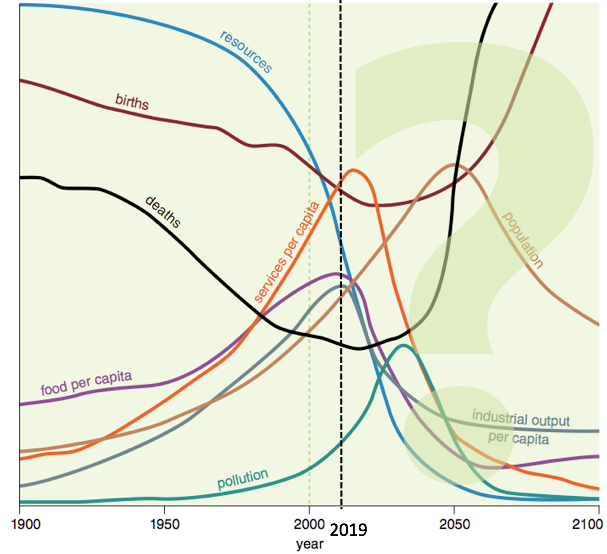
Limits to Growth 1972
"Taking no action to solve these (global) problems, is equivalent to taking strong action. Every day of continued exponential growth brings the world system closer to the limits of that growth. A decision to do nothing is a decision to increase the risk of collapse. We cannot say with certainty how much longer mankind can postpone initiating deliberate control of his growth before he will have lost the chance for control. We suspect, on the basis of present knowledge of the physical constraints of the planet that the growth phase cannot continue...... Again, because of the delays in the system, if the global society waits until those constraints are unmistakably apparent [e.g. until 2030-2070], it will have waited too long" [ref]. The book sold almost 12 million copies, was translated into 37 languages and became the best-selling environmental book of all time, becoming humanity's we-told-you-so moment (3.8 billion population, 57% active adults, 62% literate = 1.3 billion who could have read the book with those who didn't likely having heard of it). The message of Limits was opposed by those who served the system ('environmentalists' no longer talk about population), so it had to be canceled, and was.
John B. Calhoun's density overshoot warning 1972
Carrying capacity overshoot is one form of overshoot. Other boundaries are being exceeded by our mess of messes, aka modern civilization. Joseph Tainter spoke to our complexity overshoot issue.
Survival of Spaceship Earth 1972
Made for first UN Conference on the Human Environment and global policymakers. Recorded in 85 languages for distribution around the world, the film was effectively ignored. A 1991 remake (shown 1992 as a 20-year revisit) with a 4 minute intro added was nominated for 10 Emmys (winning two) and won numerous international film festival awards. Along with Limits to Growth, 1972 was humanity's 'Houston, we have a problematique' warning. Catton's Overshoot, first draft was written in 1972, restated what was known in 1980 when published. The 1991 repackaging of the video seems to have been the last communique on the issues/existential concerns for humanity and the biosphere meme to be briefly reconsidered before a consensus narrative arose among the intelligentsia that Limits to Growth had made predictions that failed to happen (it didn't), and so concerns about limits, too many people, and overshoot can and must be ignored by all right thinking thought leaders (so if you aspire to be one, don't even think about mentioning 'overpopulation'). Anyone educated since, apart from a few autodidacts, is likely cluelessly unaware of How the World Really Works (A Scientist’s Guide to Our Past, Present and Future).
Look What's Happening to Our Earth 1975
Overshoot: The Ecological Basis for Revolutionary Change 1980
A Planet for the Taking 1985
An Appeal for Joint Commitment in Science and Religion 1990
Elder Brothers' Warning 1990
World Scientists' Warning to Humanity 1992
Joint statement by fifty-eight of the world's scientific academies 1993
Bottleneck: Humanity's Impending Impasse 2009
The Anthropocene: conceptual and historical perspectives 2011
Aluna: Elder Brothers' Second Warning 2012
Consensus Statement from Global Scientists 2013
World Scientists’ Warning to Humanity: A Second Notice 2017
Worsening Worldwide Land Degradation Now ‘Critical’ 2018
Living Planet Report of 59 global scientists & overview 2019
The State of the World's Biodiversity for Food and Agriculture 2019
Nature’s Dangerous Decline ‘Unprecedented’ (IPBES) 2019
World Scientists’ Warning of a Climate Emergency 2019
A Discussion and Call to Action on Global Catastrophic Risks 2020
(38 in roundtable, Part 1: Warning. Part 2 and 3: no 'real solutions' considered as consensus limits thinking.)
Wildlife in 'catastrophic decline' due to human destruction, scientists warn 2020
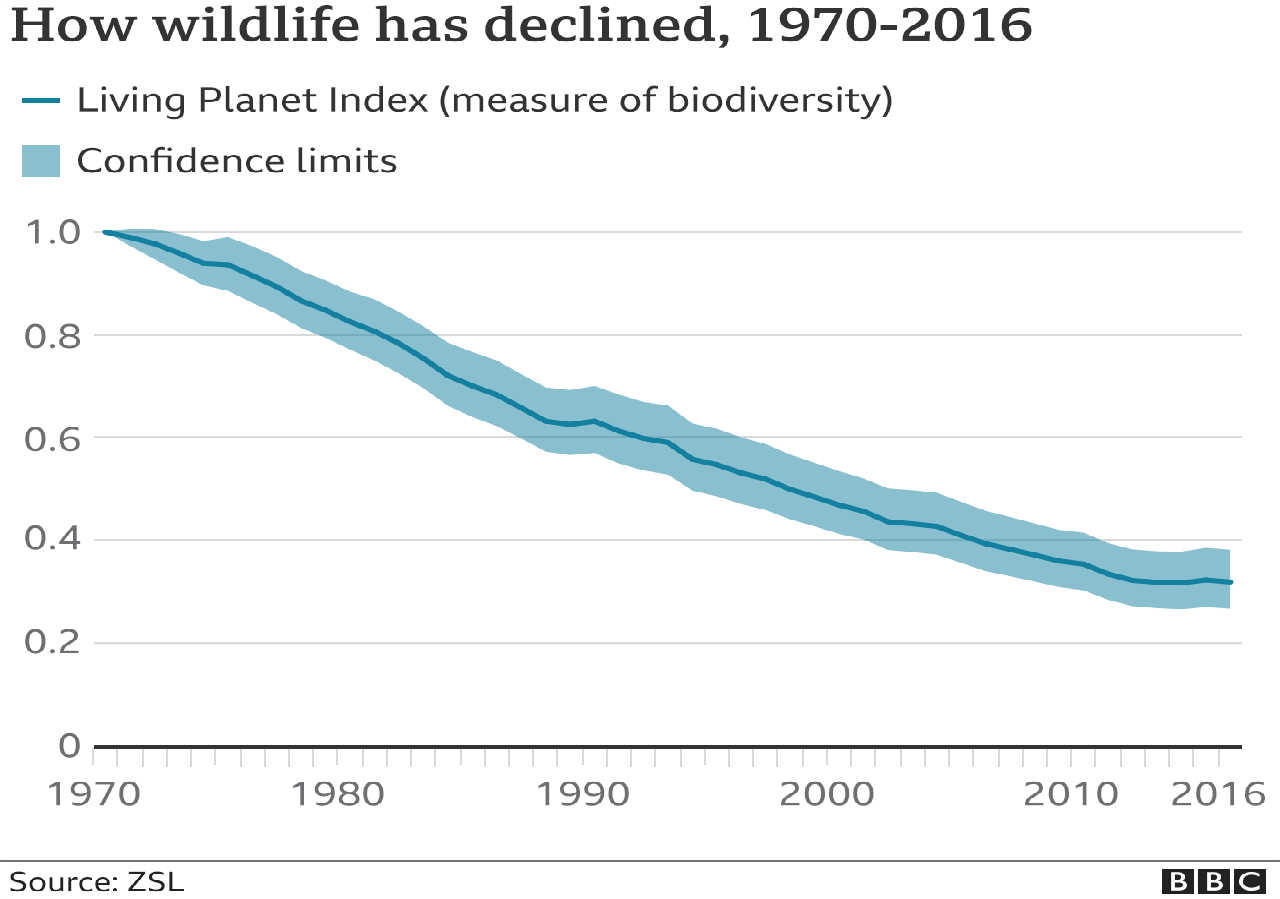
Limits to Growth Updated, Harvard & Yale 2020
Tim Garrett's Audio Warning 2020
International Scholars Warning on Societal Disruption and Collapse 2020
Underestimating the Challenges of Avoiding a Ghastly Future 2021
Freshwater fish in 'catastrophic' decline 2021 BBC summary
FINAL REPORT- Delivering the Human Future 2021 No real solutions
(The world needs a ‘survival revolution’ on a scale far larger than the ‘industrial revolution’)
Global Trends 2040 (2020 may look like the good old days) 2021
WORLD SCIENTISTS’ WARNINGS INTO ACTION, LOCAL TO GLOBAL 2021
(Now yelling and swinging the 2x4 against blindered heads harder)
Insects (Over 40% of insect species are threatened with extinction) 2022
Loss of 3 billion birds 'staggering' 2022
Circling the Drain: The extinction crisis and the future of humanity 2022
Tetrapods (among other lifeforms) face mass extinction 2022: 40.7% of amphibians, 25.4% of mammals, 13.6% of birds and 21.1% of reptiles are threatened with extinction on our watch
World Scientists’ Warning of a Climate Emergency 2022
Scientists' Warning on Population 2022
Mutilation of the tree of life via mass extinction of animal genera 2023
World scientists’ warning: The behavioural crisis driving ecological overshoot 2023
World Scientists’ Warning to Humanity: A behavioral crises 2024
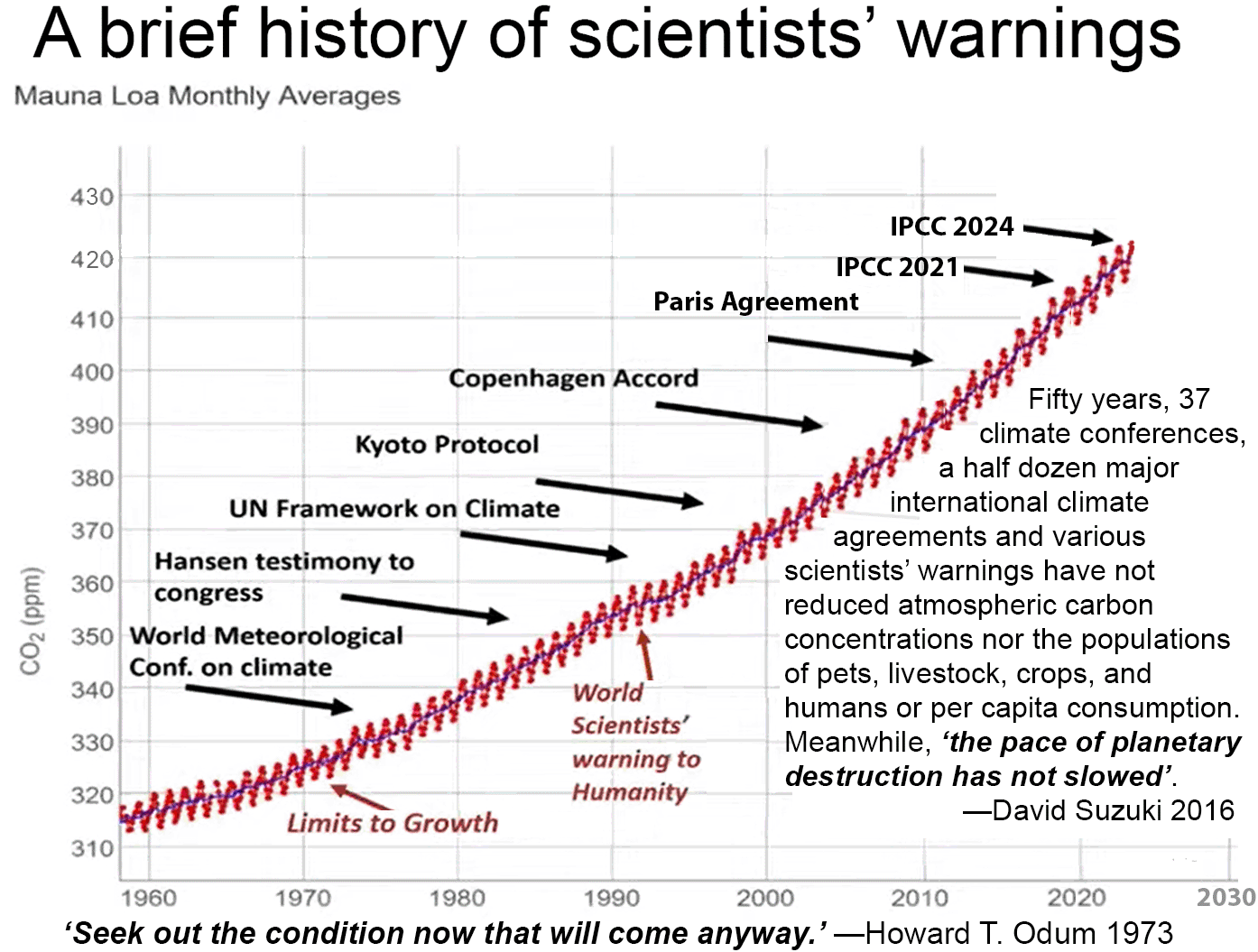
[Imagine that a world scientists' warning has a different outcome (maybe) than all prior ones. A month passes, a button is pressed and 15,322 world leaders (from top down) become unstuck in time. They have no distractions, no need to sleep, eat, breathe, have sex, or garner social approbation. For a timeless period they are intensively educated. Everything every world scientist has to teach is assimilated. The ether they inhabit is incompatible with error, and so all error associated with the warnings has been filtered out and as they now know everything that matters that every scientist had to teach, each leader far exceeds any of their individual teachers in understanding the human predicament. In the end all have triumphed over their inability to understand the implications of the exponential function. There is nothing more to learn about thermodynamics, the energetics of complex systems, carrying capacity, or overshoot. That humans are subsystems of Gaia from whom no decoupling is possible is as mother's milk to them. Thinking in systems has become child's play. In less than a heartbeat they find themselves back in their positions of power, privilege, and prestige as top government, business, media, NGO, military, university and religious leaders. All receive an invitation to join a Zoom meeting of 15,321 other leaders to discuss coming up with a plan of action to turn MTI (modern techno-industrial) society (that automatically thwarts all attempts to change its trajectory) into its opposite. The newly educated world leaders are 0.0001939% of the human population, but nearly 0.0004% of we adult hu-mans they serve or pretend to rule as leaders, i.e. 'mere puppets they, who come and go at bidding of vast formless things'.]
Update: The world's leaders emerged from their virtual smoke-filled room. Working together they failed to change the dynamic of the fossil-fueled modern techno-industrial socio-political economic system [MTI Empire]. They failed to measurably slow the pace of planetary destruction. Of the 15,322 leaders, some acted on their understanding and were rapidly selected out of the system (provided therapy to help them recover their grasp of reality). Others, in all knowingness, go with the humancentric flow to nudge it as best they can and thrive. After retirement, they attend Club of Rome meetings to lament that there are no political solutions. But one envisioned the end of all belief-based cognition, which changed everything.
"In order to change an existing paradigm you do not struggle to try and change the problematic model. You create a new model and make the old one obsolete. That, in essence, is the higher service to which we are all being called." —R. Buckminster Fuller
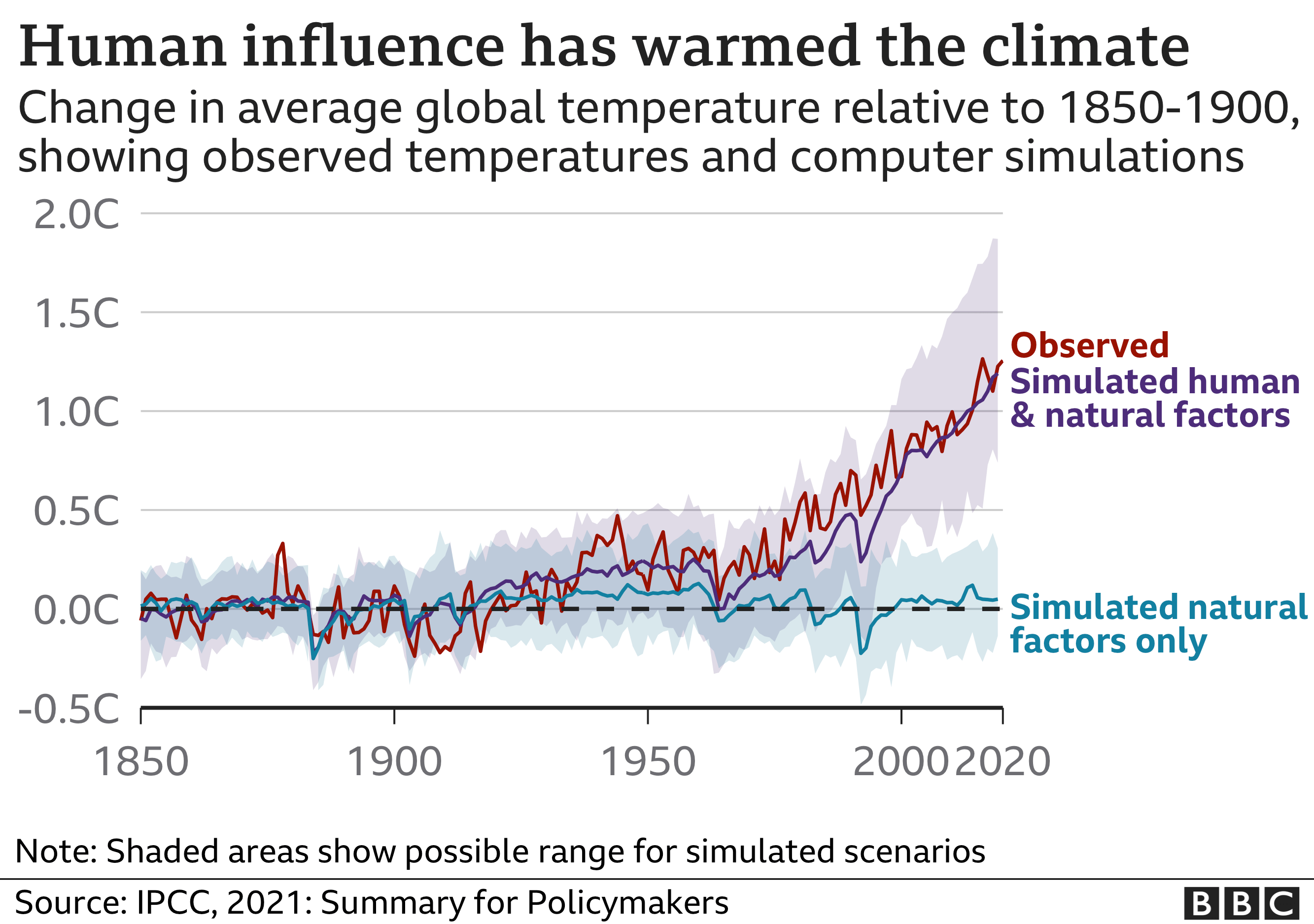
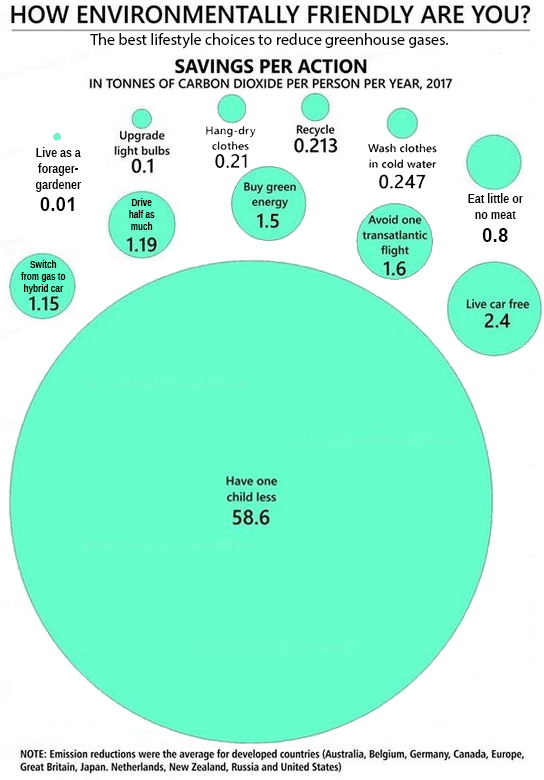
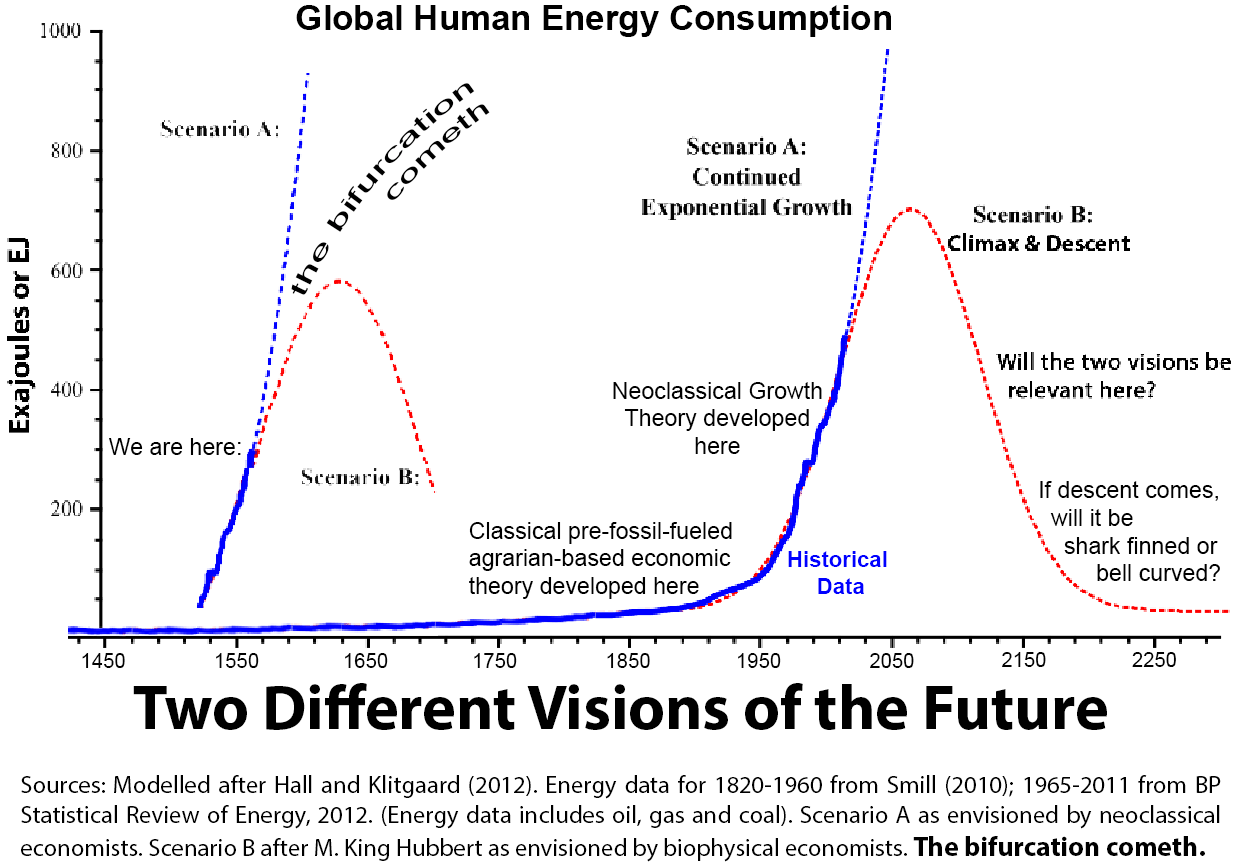
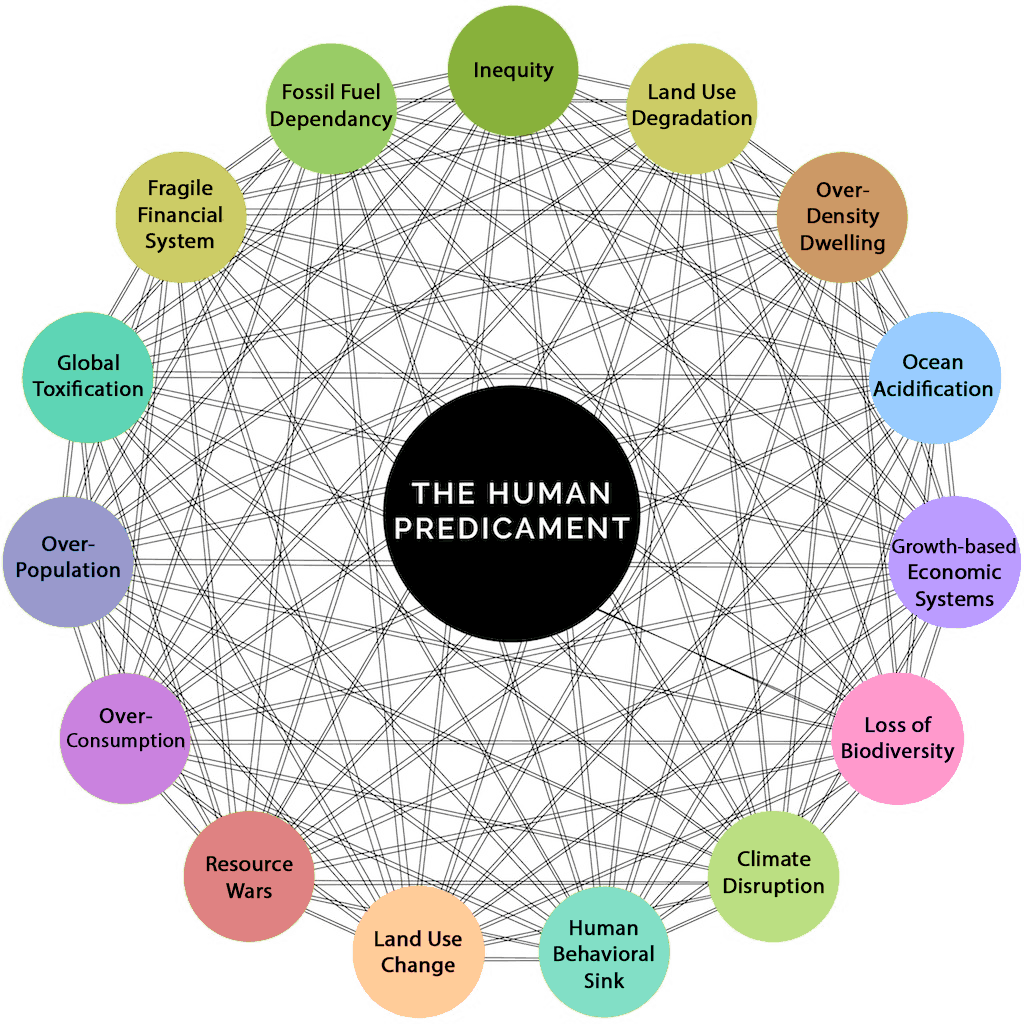
Science, journal of the American Association for the Advancement of Science and one of the world's top academic journals, published an essay that summarizes the concerns and views of many who listen to Nature. Anthropocene enthusiasts, however, see such concerns as proof that science and Science Magazine are anti-human (and anti-West/Christian), corrupted by enviro-mystics. Or maybe those who read Science have concerns about stuff that matters, have foresight intelligence, and are willing to reimagine the human along the lines of the essay by Eileen Crist, "enviro-mystic", Dec. 2018.
The lines in the sand of posterity's future have been delineated, and both paradigms can't be right (good, reality-based, or beautiful). [One comment illustrates the human predicament: "Crist is a garden variety, far-left enviro nutcase. Her type would grant civil rights to rivers and lower animals (which is to say allowing enviro lawyers to have judicial standing to represent only their own interests). But it is reprehensible that a formerly responsible journal such as Science would actually publish such garbage. Apparently its editors were impressed by Crist's linguistic ability to dress up her drivel in pseudo-scientific language." Actually the editors of Science know pseudo-science and anti-science when they see it, if anyone does.]
There are two foundationally incompatible paradigms or narratives: one humancentric and one naturcentric. Humans are exceptional, are decoupling from Nature, are different in kind from other animals, are becoming ever more Woke to the better angels of our nature.... Or humans are part of Nature, as are their cities, cars, nuclear bombs, and complex societies—but only FOR A TIME as Nature alone selects for what is sustainable. In the wild, Anthropocene enthusiasts can be identified by their caw, e.g. when they call those who are not as enthusiastic 'eco-fascists'.
Humans don't get a vote—humans have no "rights" other than such as they can talk endlessly about being for or against. Alternatively we just-a-little-lower-than-the-angels humans, as clever apes, can violate the Laws of Thermodynamics—all seven if necessary, and Nature doesn't get a vote as only humans have rights, so sayest the anthropocentrist, the 99+% who have normalized the Dunning–Kruger effect.
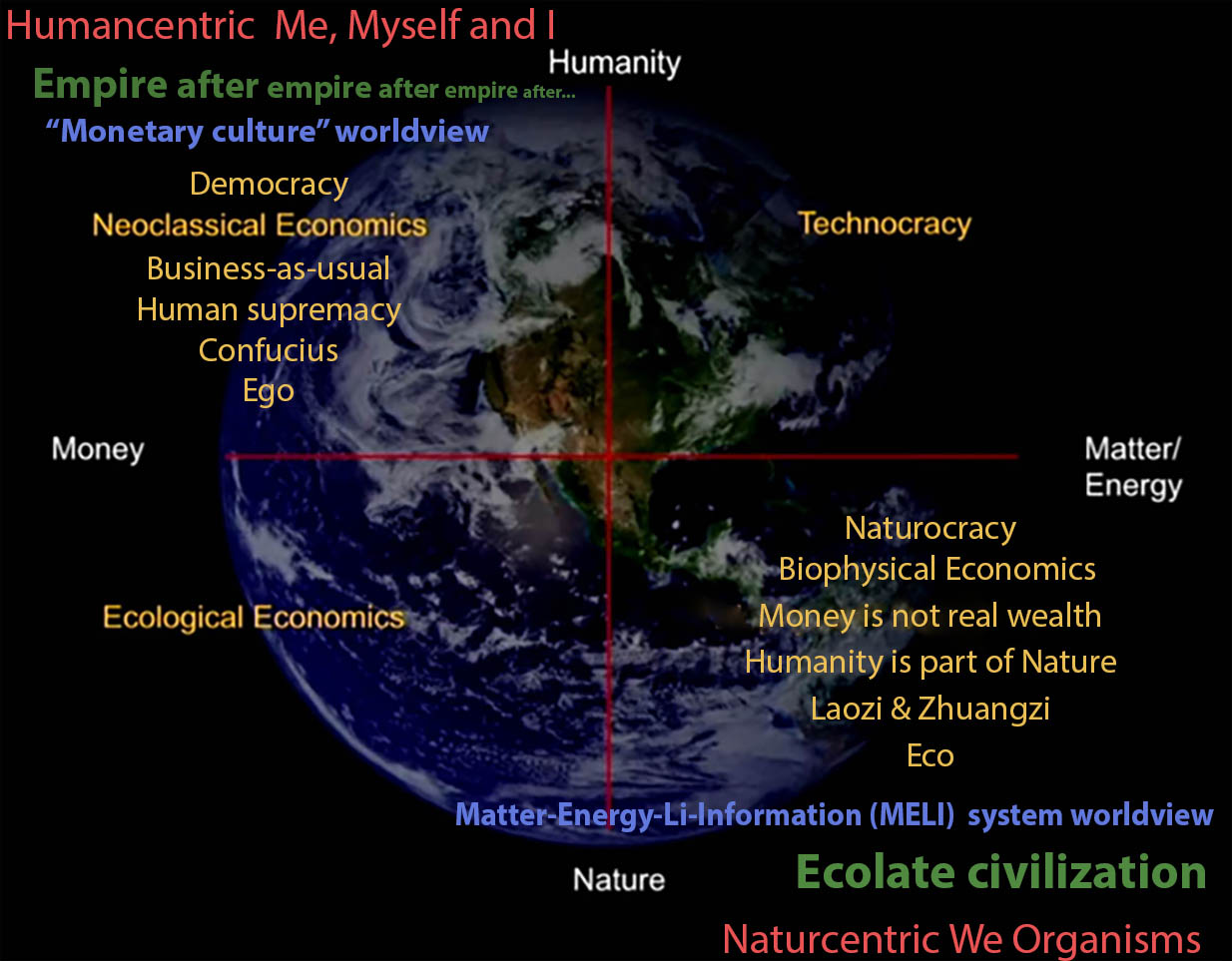
Adapted from Mark Brown, Beyond Growth: Economics as if the Planet Mattered, 2/5/2019.
"Monetary culture" vs matter-energy system worldview. —M. King Hubbert
'Li' is Chinese for the laws—organizing principles—of the cosmos.
Technocracy and ecological economics were/are transitional.
Naturocracy: Technocracy for the 21st century.
Note: our humancentrism renders us incompatible with persisting as a lifeform on this planet.
So all you wannabe Borg, start by moving to Mars to serve Elon Musk in his retirement
where as a transhuman he will live for centuries and as a brain in a vat,
he'll serve hu-manity as the millennia go by.

All views/narratives are social constructs.
We cannot know the Truth nor be fully objective,
but we can iterate towards truth, towards understanding
what's out there, the objective view, the story that Nature is telling to
those who would listen. Failure to listen to Nature has mass extinction as outcome.
The Anthropocene mass extinction event could include its cause.
We moderns are, even at our peak, stunningly insapient.

Word poetry is about form, content and sound.
Concept poetry is about form and content.
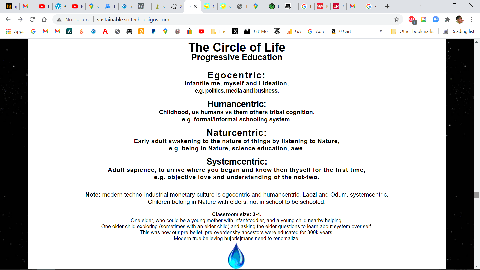
The Circle of Life
Progressive Education
Egocentric:
Infantile me, myself and I ideation,
e.g. politics, media and business.
Humancentric:
Childhood, us humans vs them others tribal cognition,
e.g. formal/informal schooling system.
Naturcentric:
Early adult awakening to the nature of things by listening to Nature,
e.g. being in Nature, science education, awe.
Systemcentric:
Adult sapience, to arrive where you began and know then thyself for the first time,
e.g. objective love and understanding of the not-two.
Note: modern techno-industrial monetary culture is egocentric and humancentric.
Laozi and Odum: systemcentric.
Children belong in Nature with elders, not in school to be schooled.
Classroom size: 3-4.
One elder, who could be a young mother with infant/toddler, and a young child nearby helping.
One older child exploring (sometimes with an elder child) and asking the elder questions to learn about system over self.
This was how our pre-belief, pre-overdensity ancestors were educated for 375k years.
Modern true believing hu[bris]mans need to renomalize.

Parenthetically Typing
[Energy is the real wealth of the fossil fuel-based energy economy whose flows are enabled by the counter $₤€¥₿ flows of the monetary economy and its counterfeit wealth dynamic. Spending money drives the economy in proportion to how much you/we/I spend. To 'save the world', stop making (or stealing/inheriting) money and stop spending/gifting any. To spend money (x0.85) is to burn fossil fuels. Individuals who stop spending money will self-select out of the system to enable others to consume more. To save the world, the monetary culture is what needs to end, e.g. to be replaced by a matter-energy-li (MEL) system-over-self culture. The modern techno-industrial (MTI) monetary culture depends on our belief in it. Destroy it one mind at a time starting with your own—the MTI hegemon will destroy itself. Only those who no longer believe in belief could form an alternative culture. Replacing a belief in MTI society with a belief in a MEL society fails to address the cognitive pathology of our belief in belief that is foundational to MTI culture's believing mind. Proposing that we end fossil fuel use and transition to green wind/solar/et al. empowerment is belief-based cognition. If MTI culture is the wolf, a Green MTI economy is the wolf in sheep's clothing. All expressions of MTI culture fail to address our meta-problem of overshoot which can only be redressed by seeking out the rapid degrowth of population and consumption (that will come anyway) by voting with one's feet. Conjecture: less than 1 percent of humans have the potential to walk away from MTI culture and maybe form a MEL culture having a biophysical economy 'oriented toward the maintenance of a viable equilibrium between Man’s demands and Nature’s resources', e.g. a culture that listens to Nature. Preserving information packages to maybe allow posterity to avoid repeating the MTI pattern is also to die for.]
So consider: (1) BELIEVE (preferred feel-good stories) or (2) LISTEN (to Nature who has all the answers). That is our fork in the road and, yes, "people would rather believe than know" (E.O. Wilson), so BELIEVE or LISTEN ("to think is to listen"—Kogi máma), but deeply held beliefs could change rapidly when a teachable moment comes. In the meantime, enviro-mystics can prepare information packages, can vote with their feet and form pockets of sustainability (and save information, aka "the world") within which they are the majority.
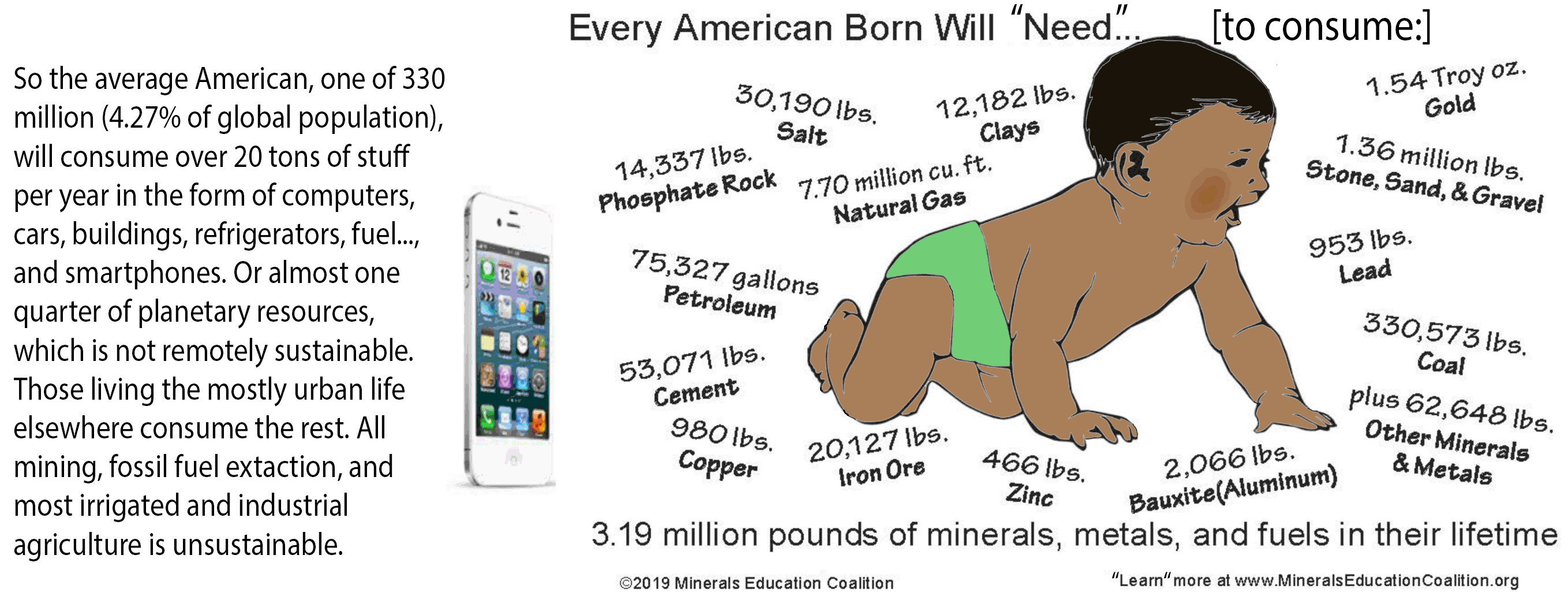
Note: all geo-mineral/metal/fuel ores are non-renewable. And then what? If the average Kogi child were to consume 319 lbs of industrial products in their lifetime, would the quality of life of the American child be 10,000 times better? Or 0.0001 times better? Listen to Nature, not the wordsmiths serving industrial society who may claim that an American baby will NEED to consume 20 tons a year to live a meaningful life. If believed, then war, not to mention continued growth, is justified to provide what the baby needs.
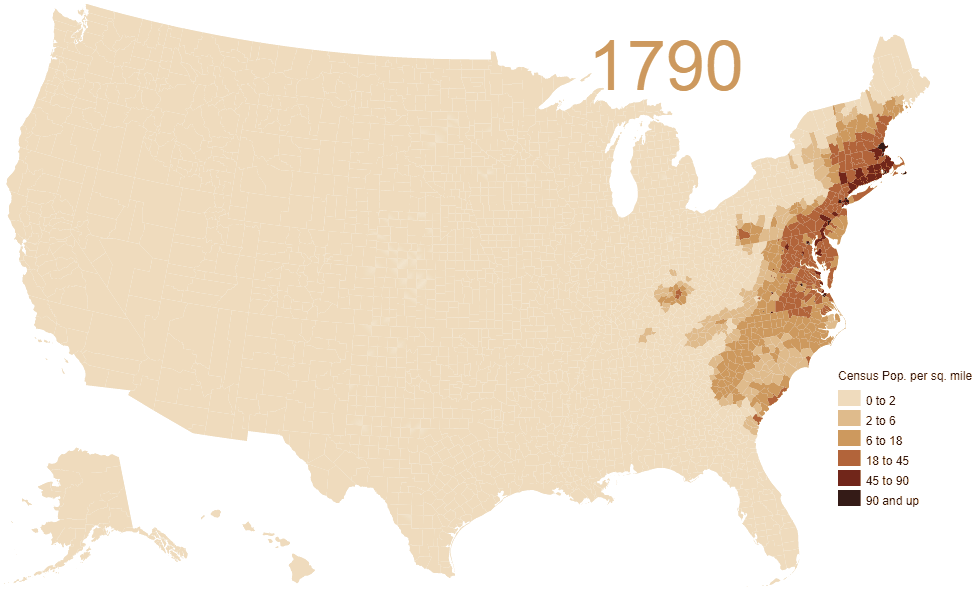
Part of a global one-off plague-phase overshoot event. Degrowth will be different.
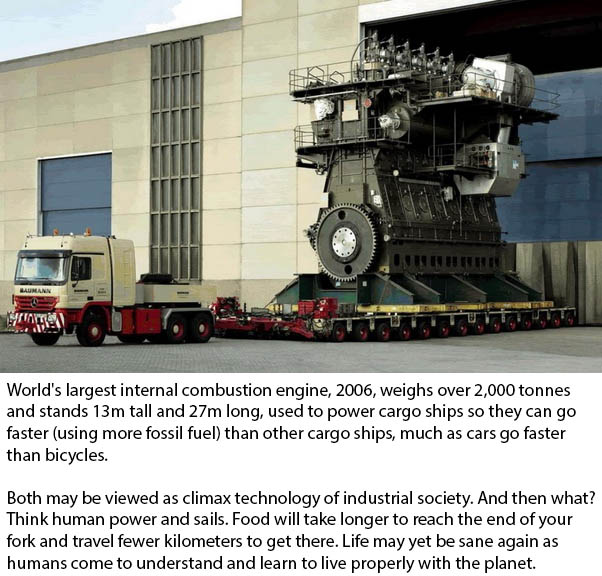
Ships at sea keep the consumer society going, for a time. Three hundred years ago there were not as many. In thirty to three hundred years there may not be as many again. Large ships carry transponders and you can view marine traffic for other times here. From ports, trucks transport most materials to points of processing or consumption. Don't expect long-haul anything to be powered by electric. A 30 second animation that loops:
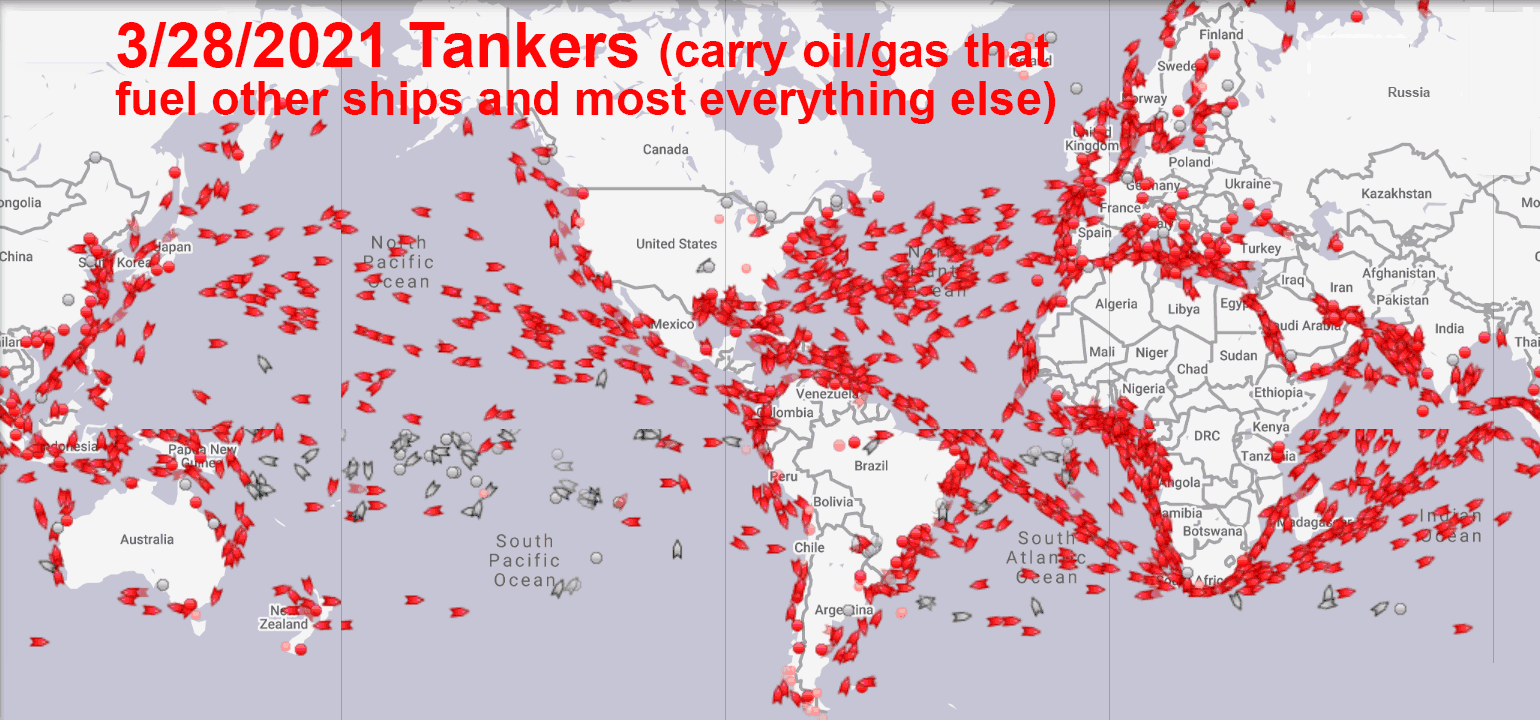
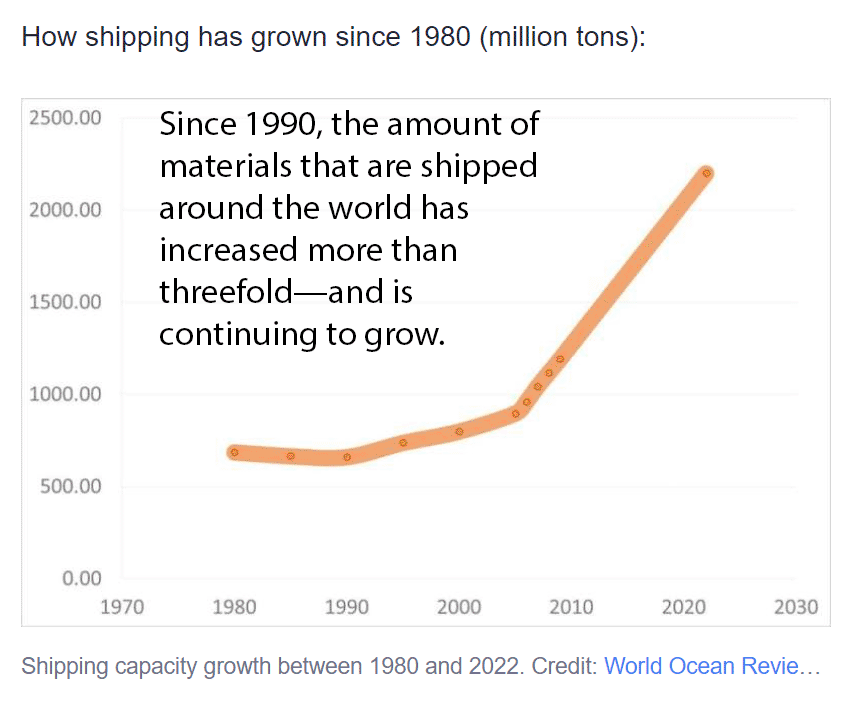
Just because we live in the blip:
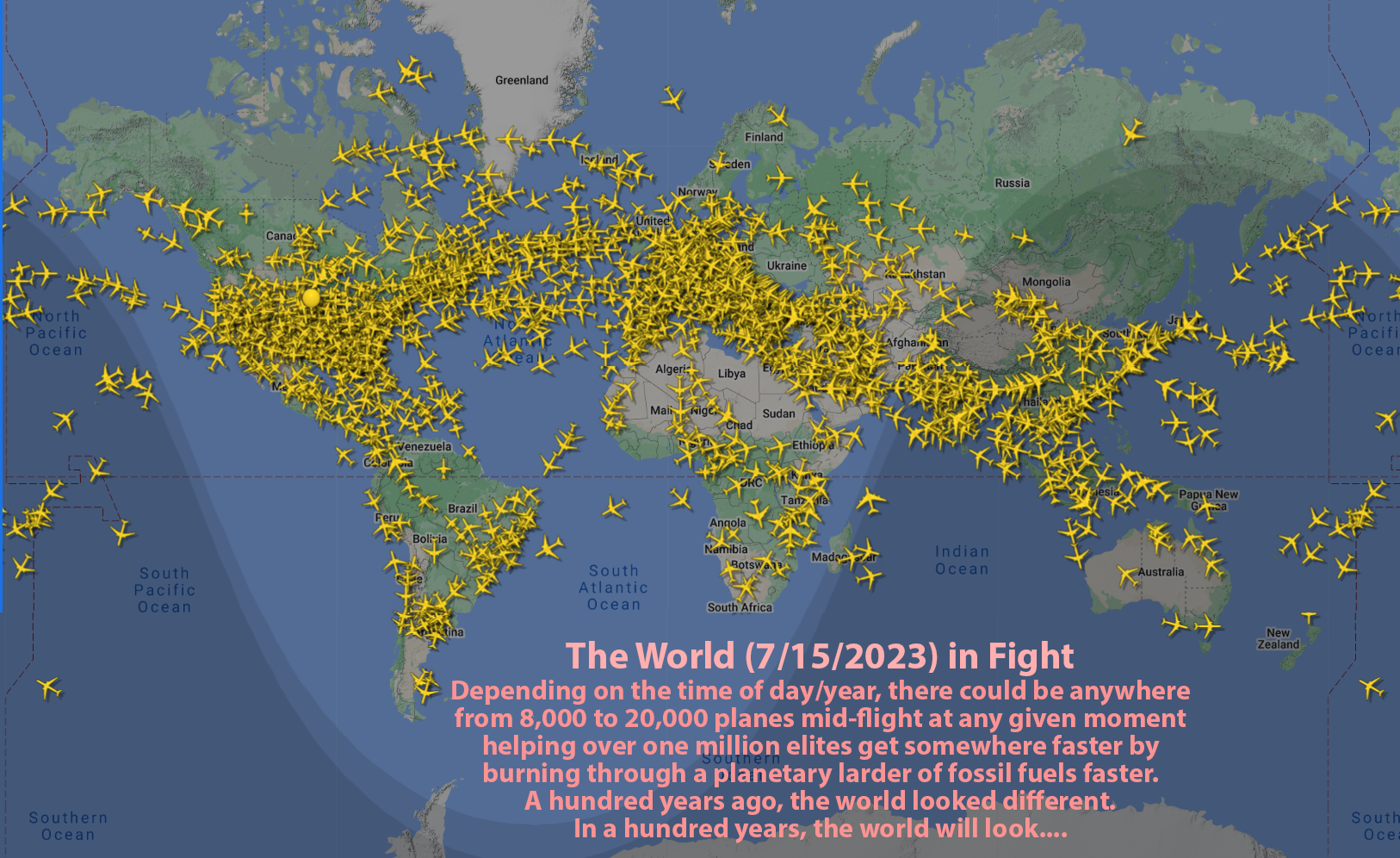
All passenger flights should have been phased out starting in 2021..., but I haven't been made world dictator yet.
Make me World Dictator and I'll start now to end flights in three years (don't wait another two years).
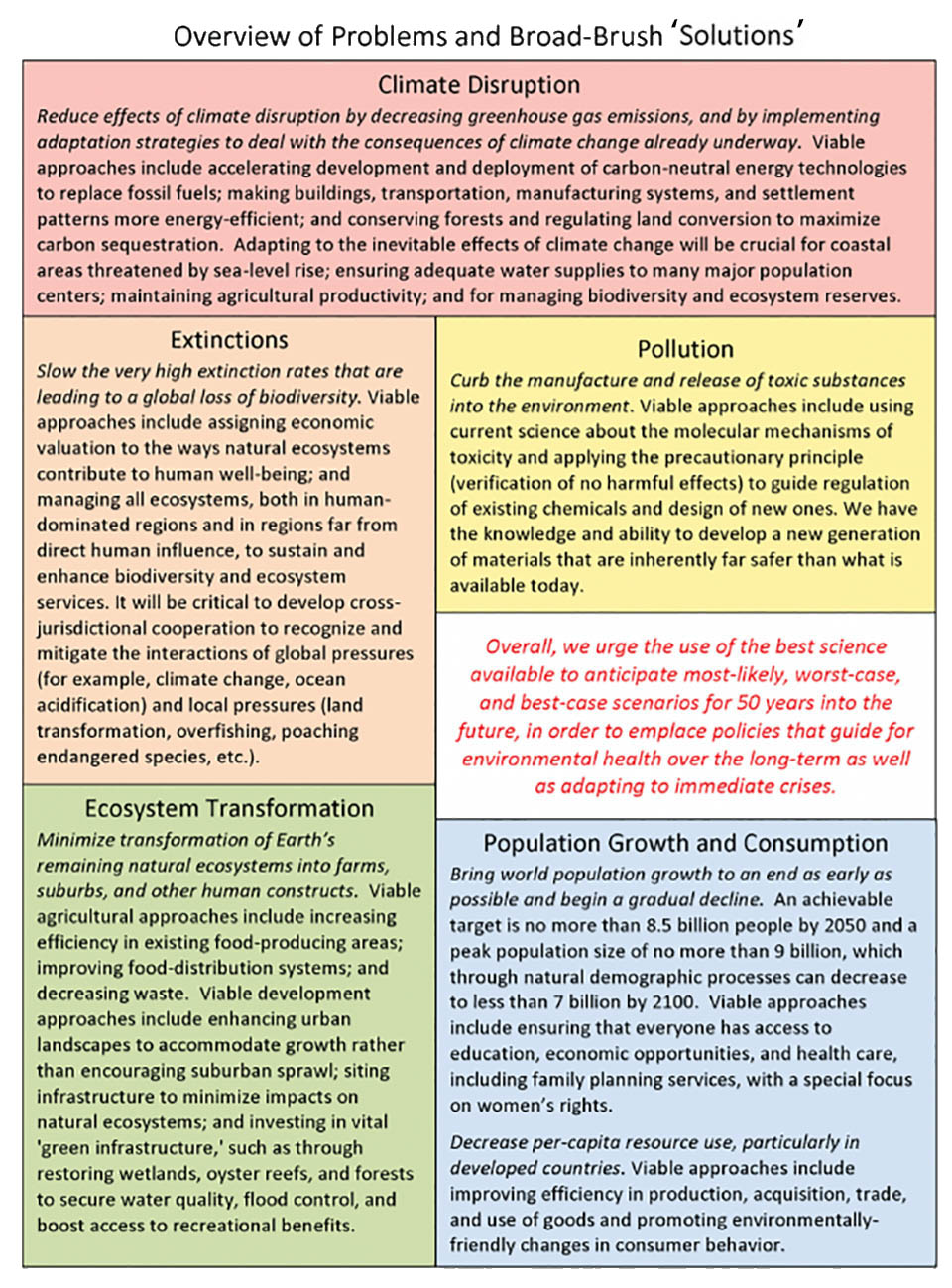
From Consensus Statement from Global Scientists 2013
What? A 50-year plan? Sorry, we need a 500-year plan.
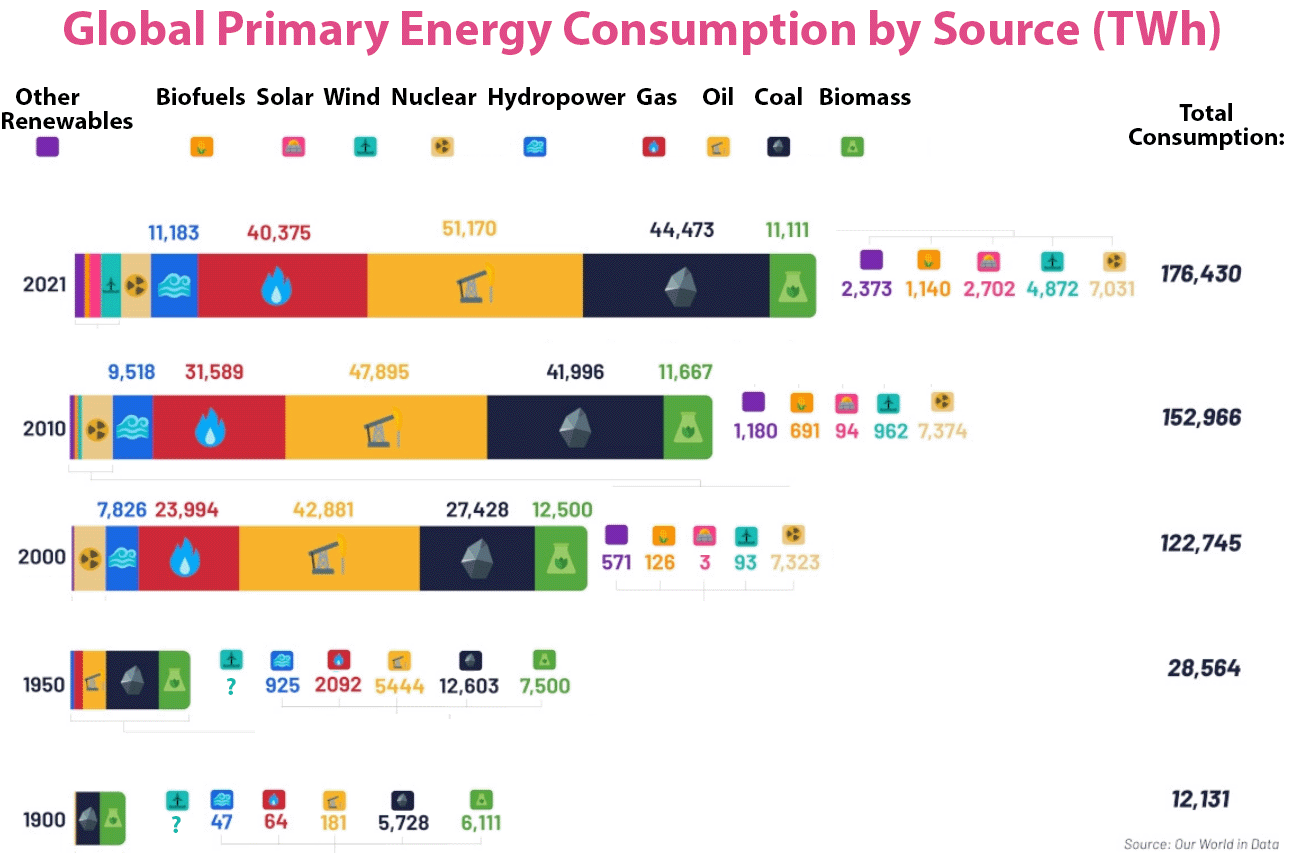
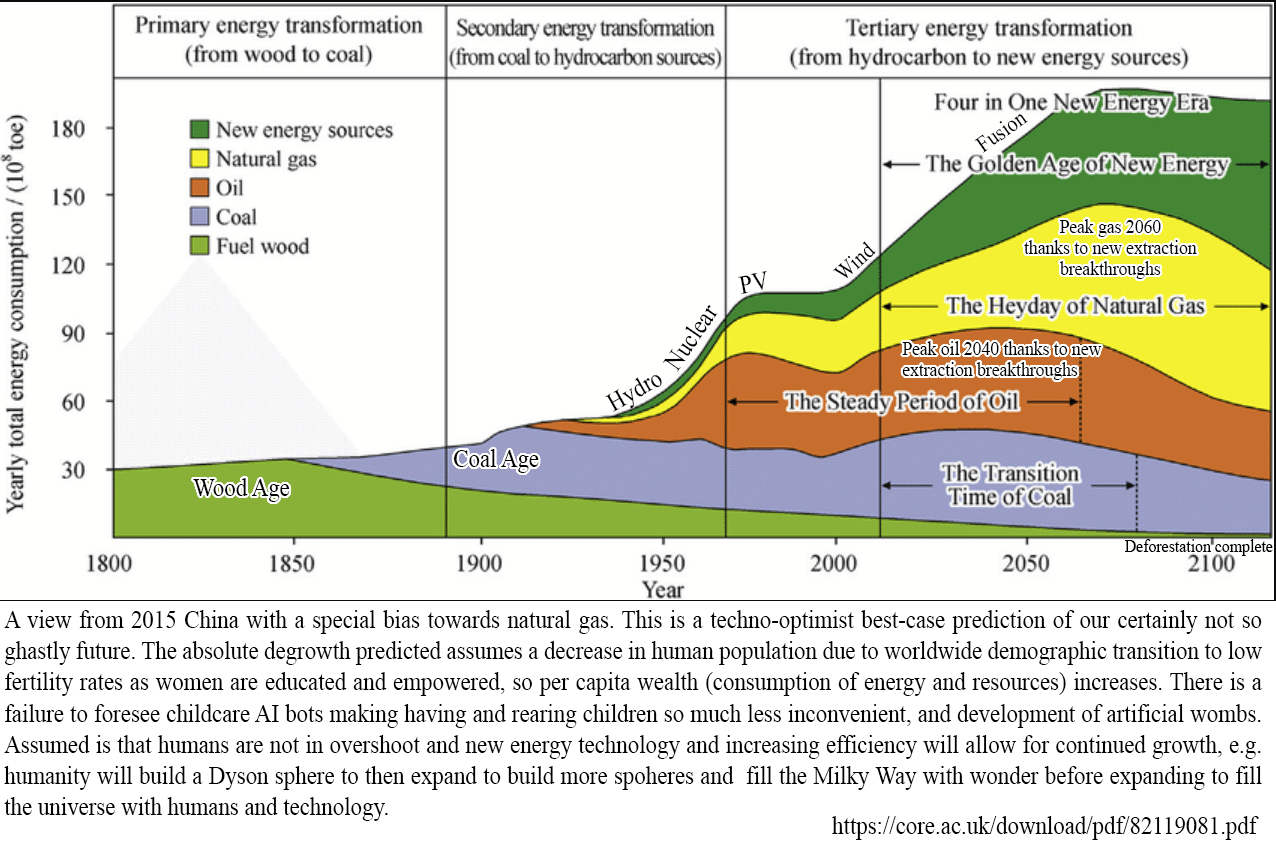
Energy Revolution: From a fossil fuel era to a new energy era
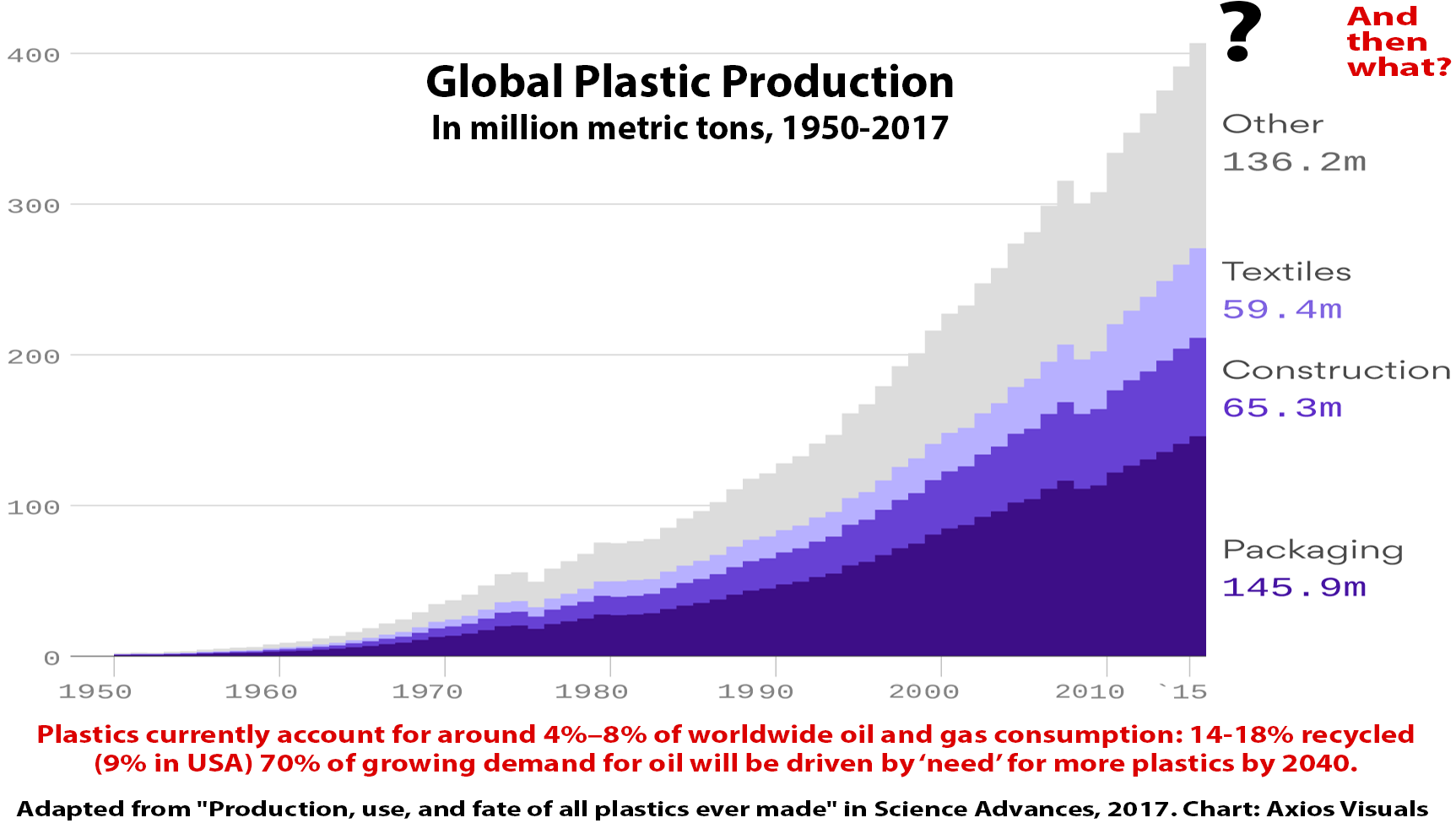
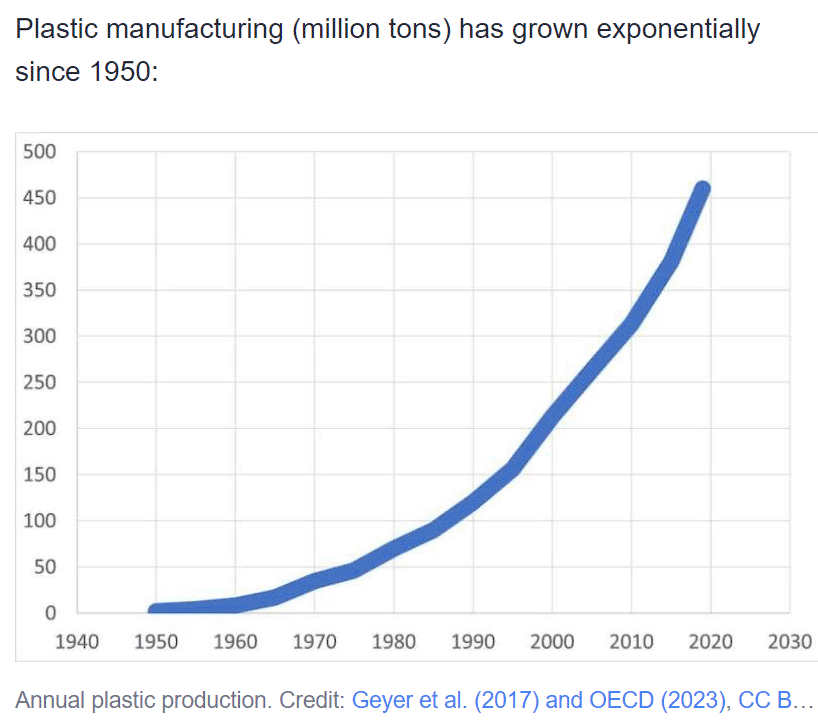
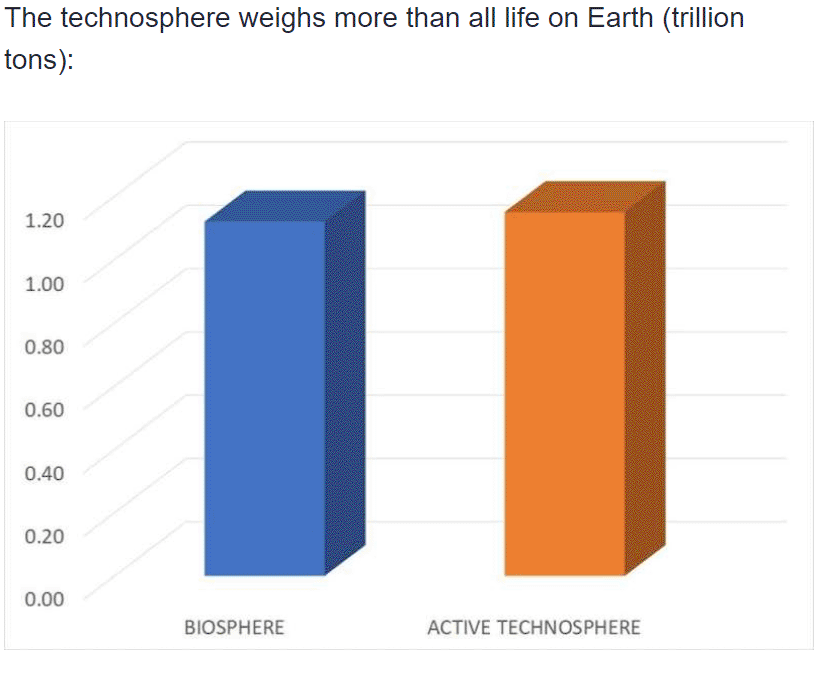
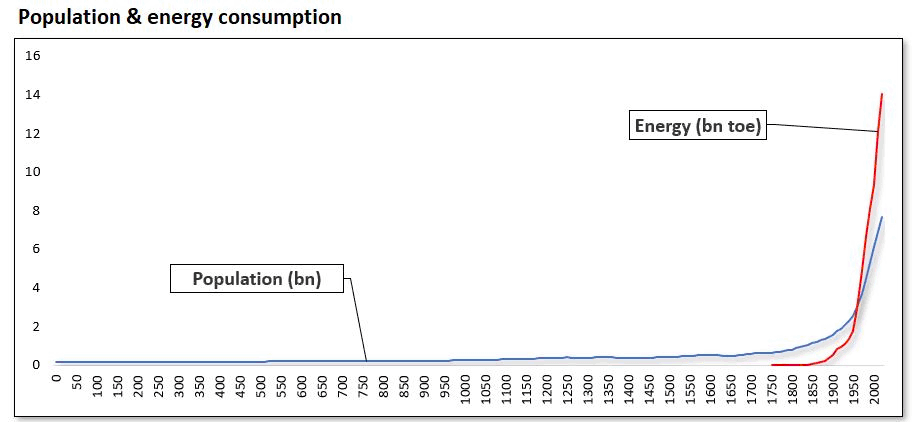
More about the 'blindingly obvious' or The Surplus [net] Energy Economy here.
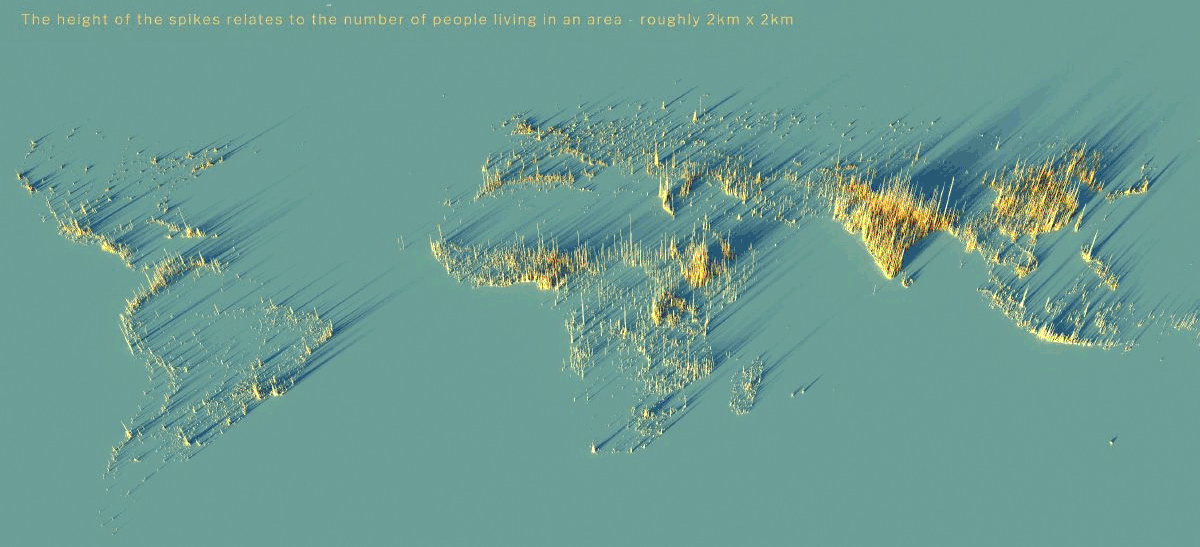
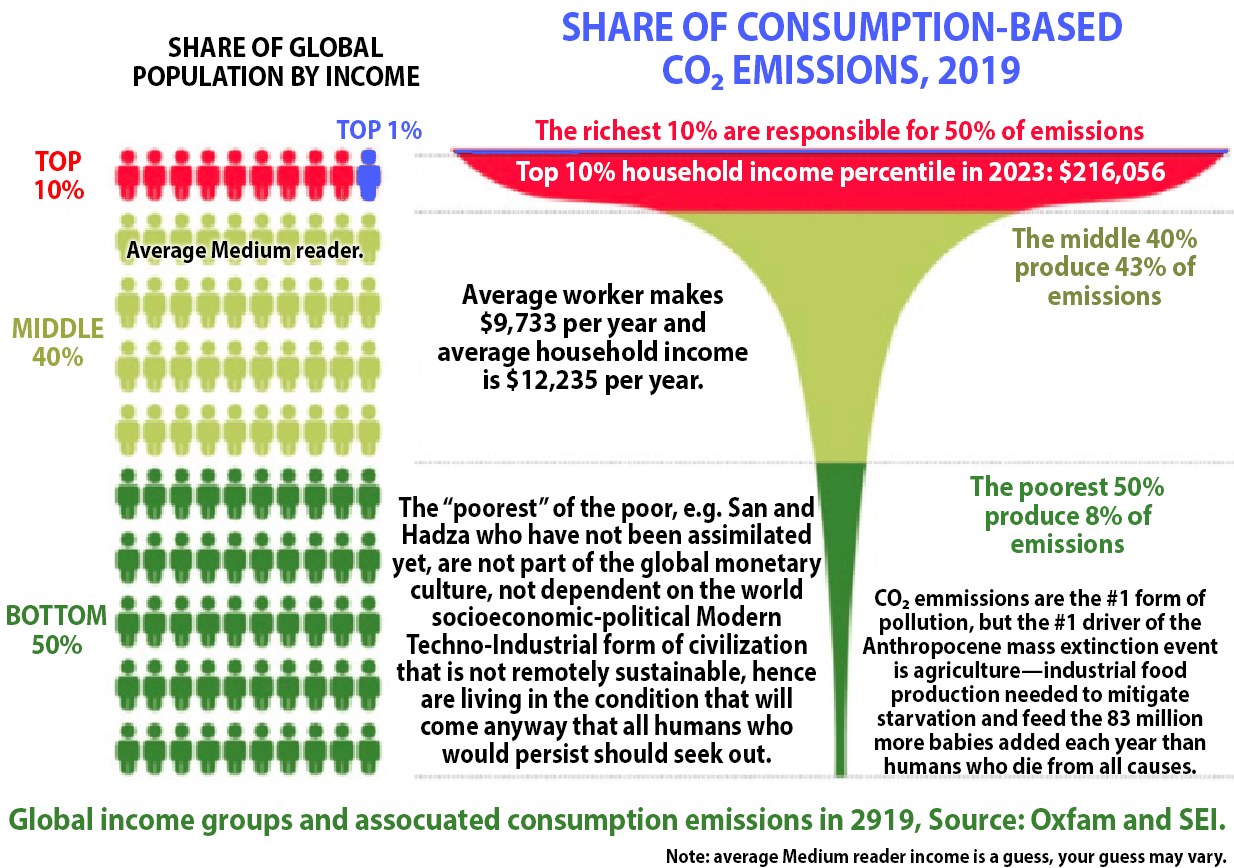
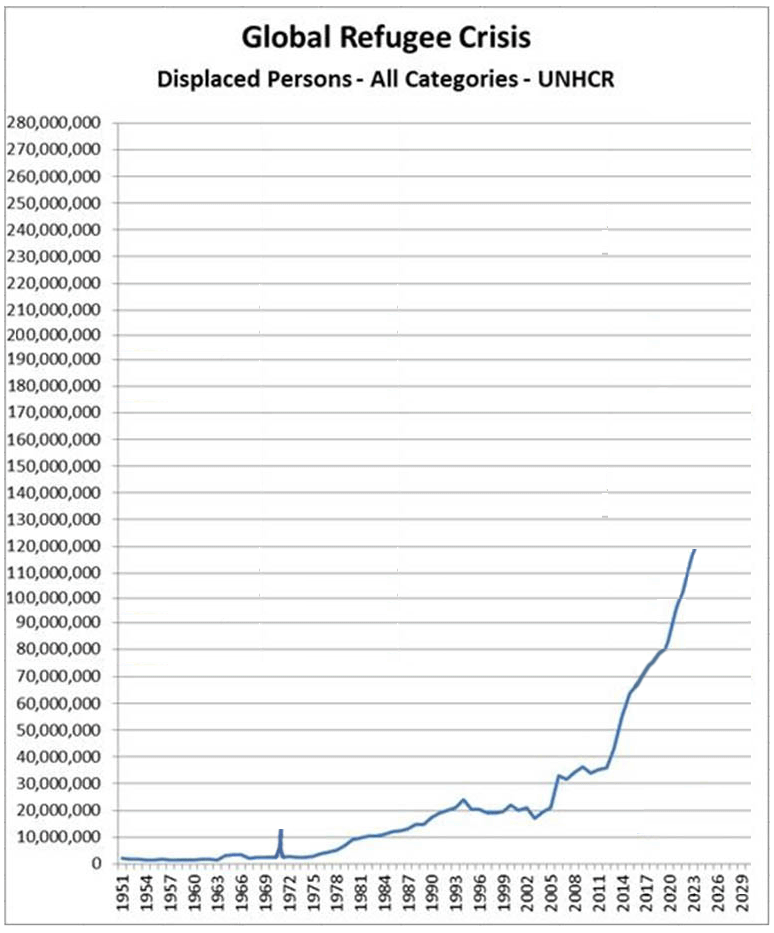
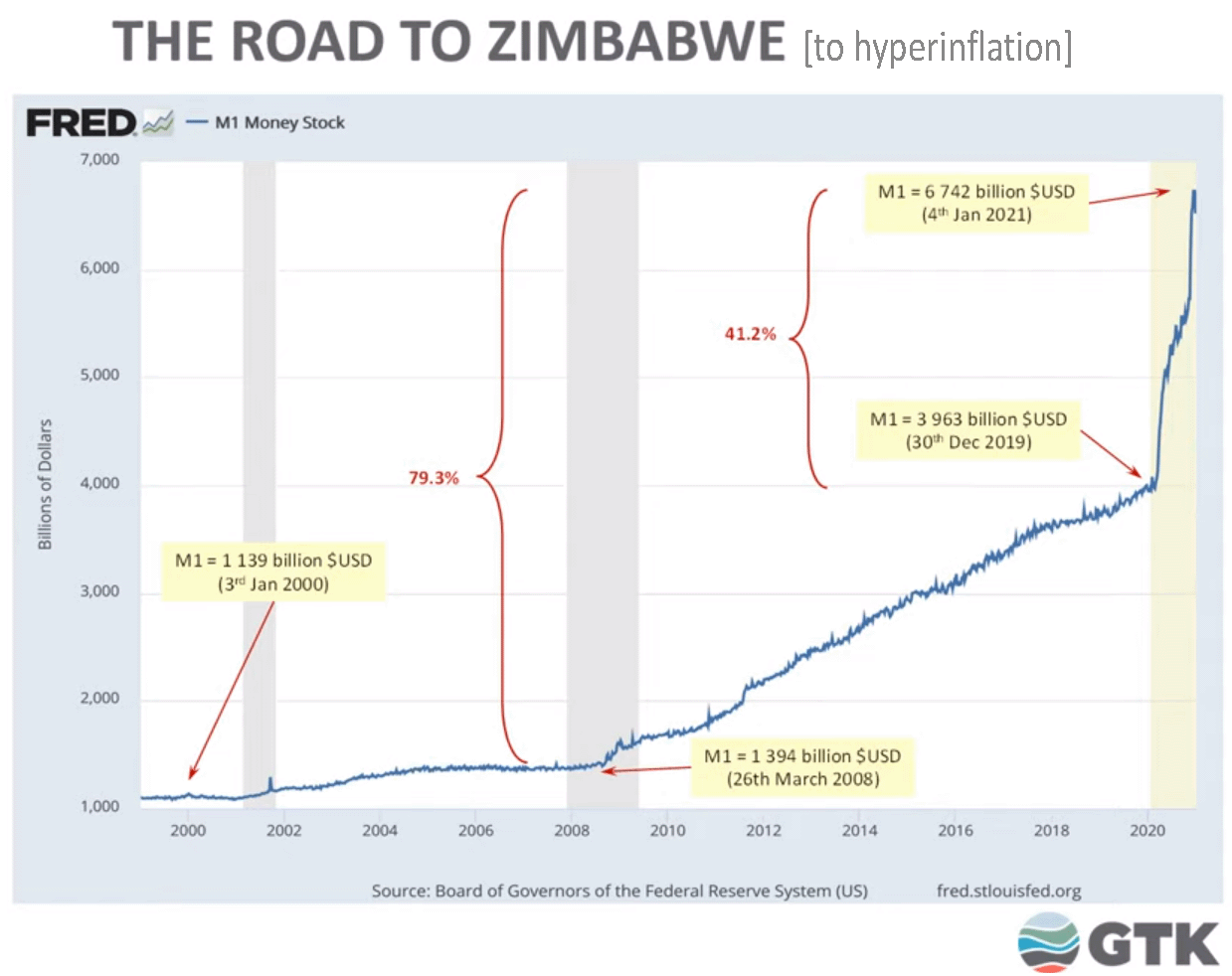
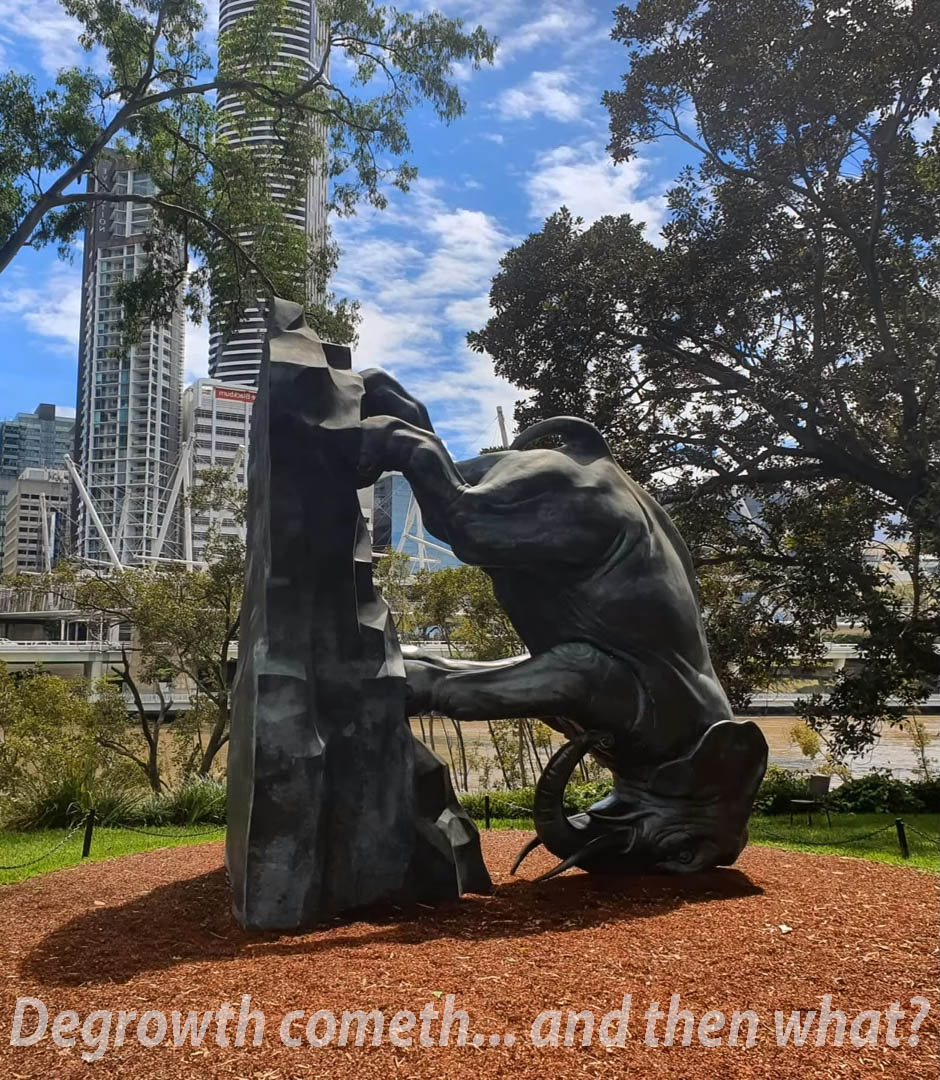
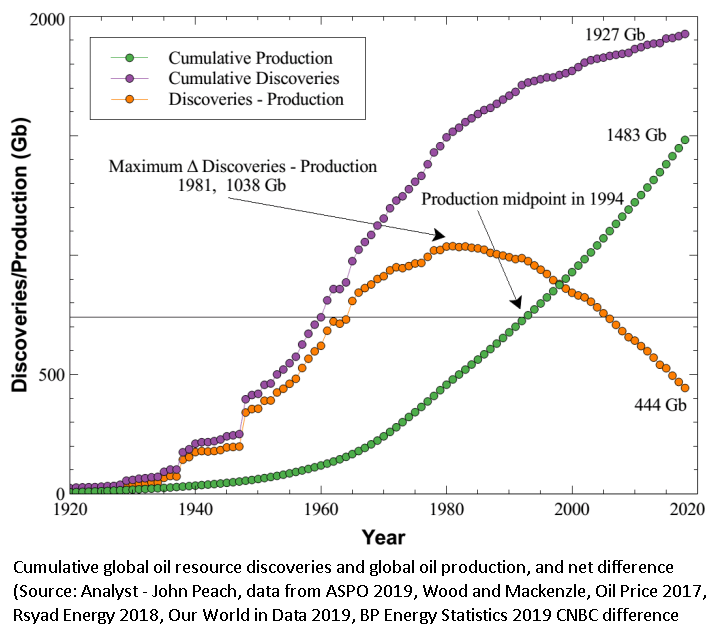
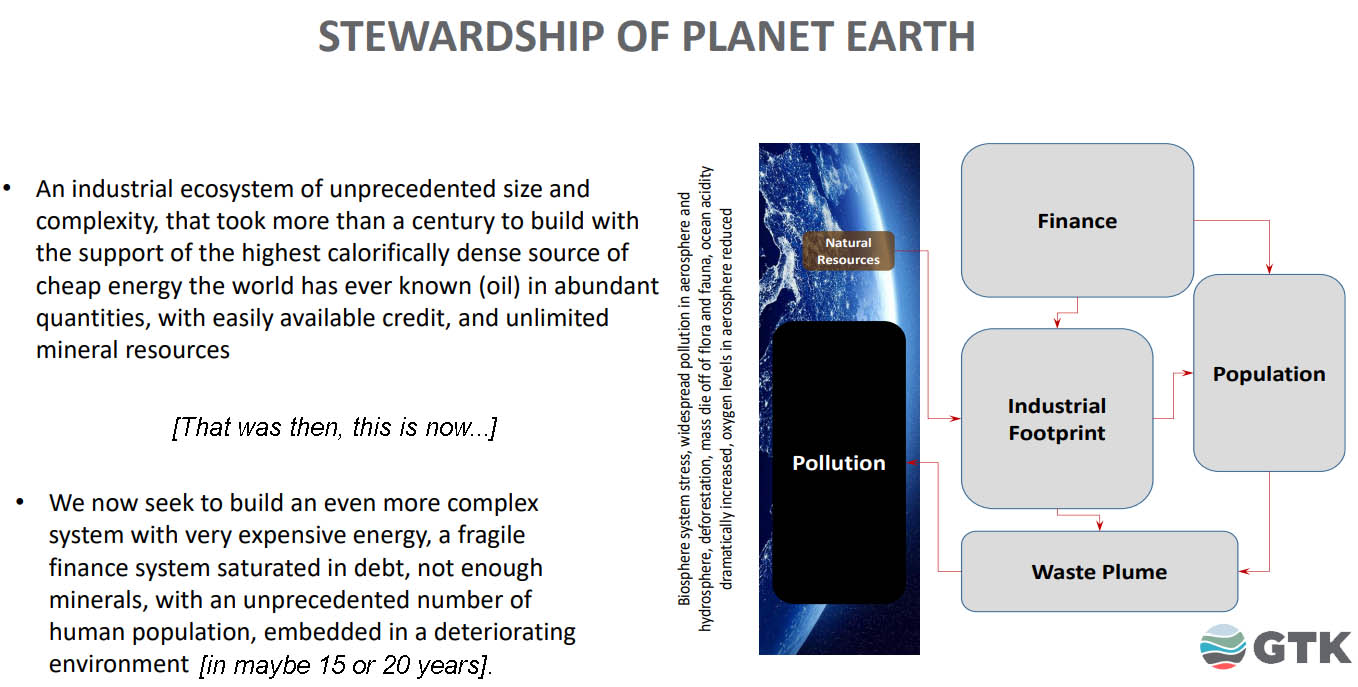
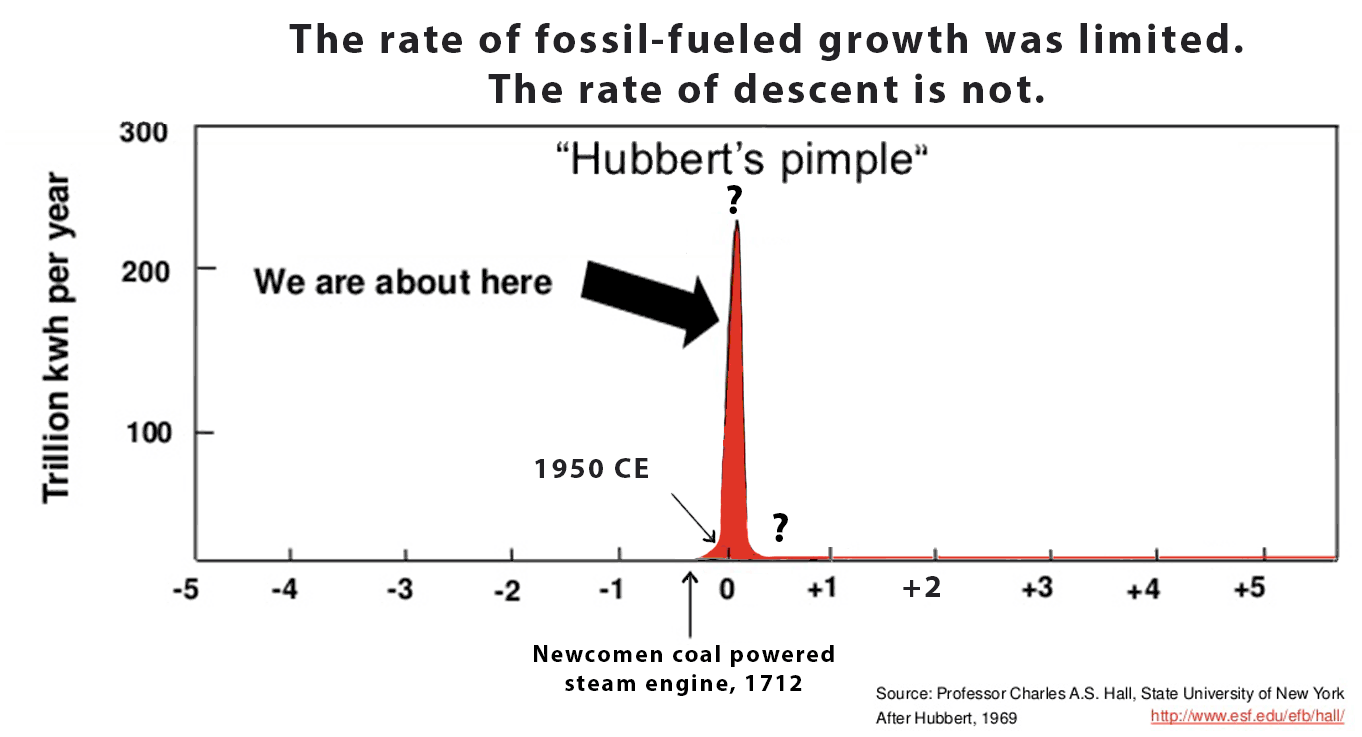
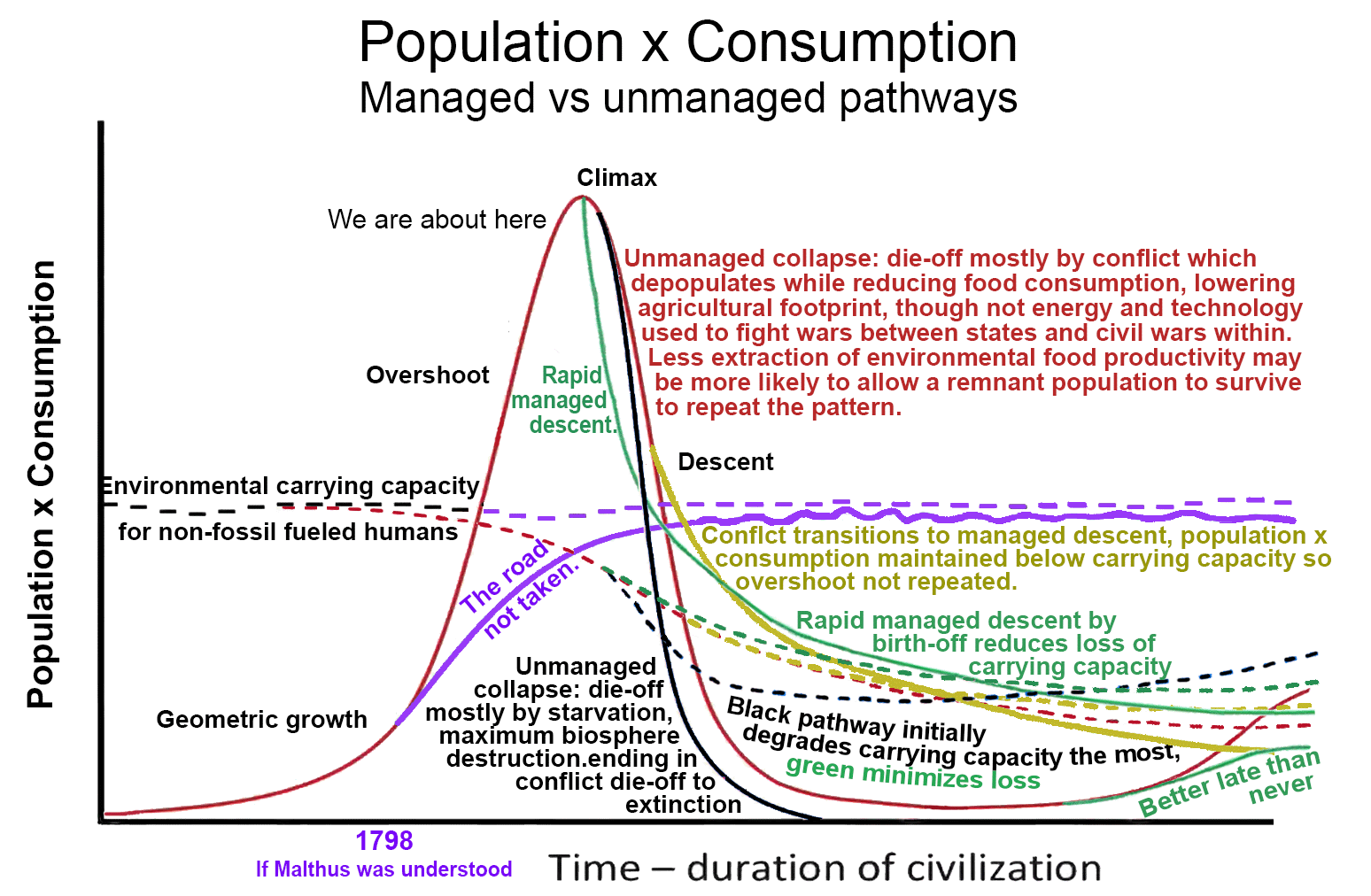
Notes on graphic
On Carrying Capacity, Overshoot, Overcarry, Overpulsing, and Sustainability
But fertility rates are dropping, half of countries face underpopulation problems, and before the end of the century, the population of people will likely peak and degrow if we don't adopt policies to at least maintain the population. But future economic growth will be dominated by robots and AI, so, unlike in the 20th century, an increasing population will not be needed to maintain economic growth and per capita consumption. Corporations are already people, and soon robots will be too, who are fruitfully multiplying (for a time). ["Remarkable" decline in fertility rate, BBC Nov 2018.]
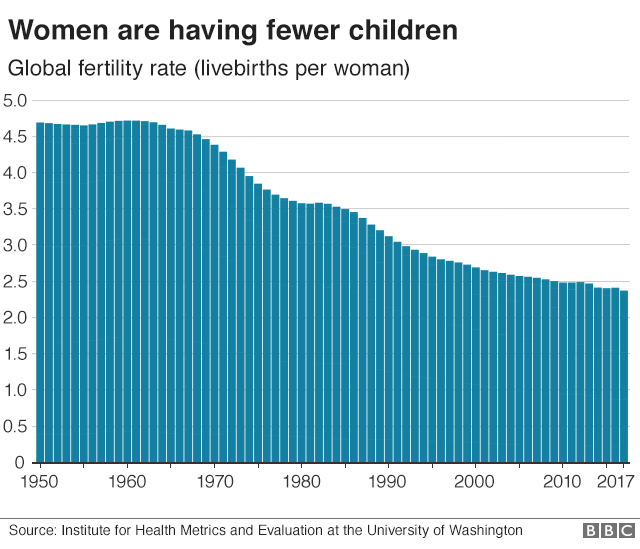
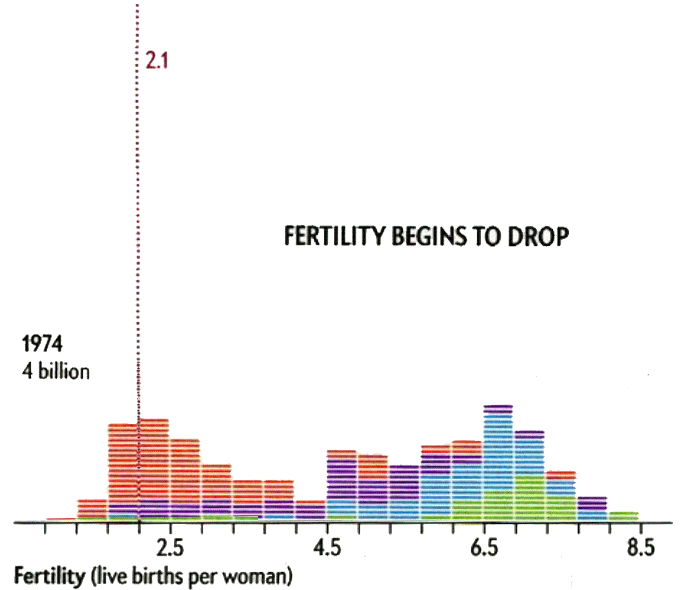
Concerns about "overpopulation" in the late 1960s and 70s were politicized and became a distraction, much like climate change is today. Human impact (I) on the biosphere (e.g. species extinction, biodiversity loss, pollution, 96% of mammals are now humans/pets/livestock) will not peak when the human population does, perhaps at 9 to 11 billion by 2100. Everyone, including the rich, will continue to maximize per capita consumption (A for affluence), and the technology (T) intended to grow the economy will have unintended consequences, as usual per business-as-usual. So I=PAT. Expect the BAU system will keep on keeping on until it can't.
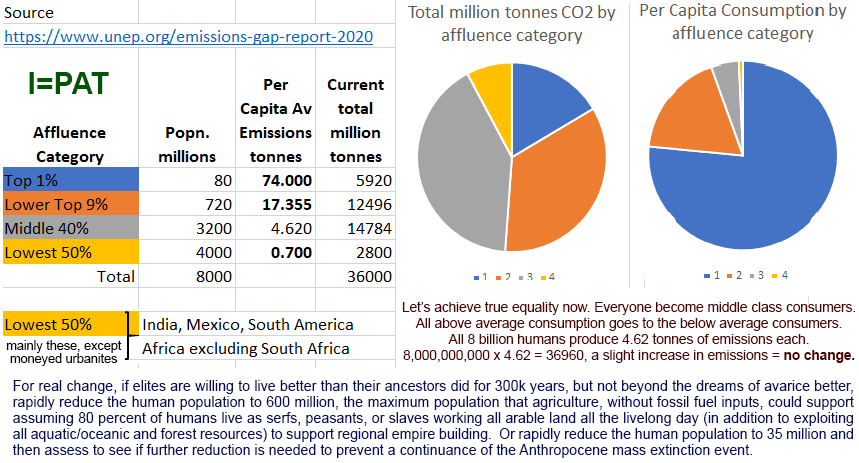
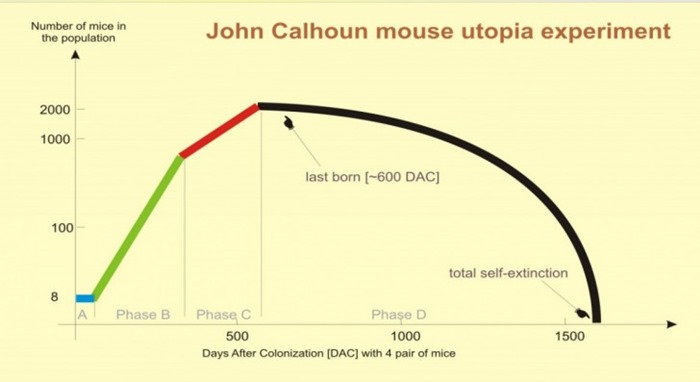 The demographic transition, which was unplanned, describes (it is not an explanatory theory) the observation that fertility rates within increasingly industrialized/urbanized societies drop over time. That it has anything to do with enlightened individuals doing the right thing, making enlightened choices for the good of the planet, is not clear. It is likely an expression of the General Adaptation Syndrome pathology.
The demographic transition, which was unplanned, describes (it is not an explanatory theory) the observation that fertility rates within increasingly industrialized/urbanized societies drop over time. That it has anything to do with enlightened individuals doing the right thing, making enlightened choices for the good of the planet, is not clear. It is likely an expression of the General Adaptation Syndrome pathology.
The belief that technology, education (especially of women), economic development (green growth of course) and the blessings of urban life (overconsumption) will automatically "take care of" alleged overpopulation is as asserted, as deeply believed in. Population peak and degrowth may have something to do with "beautiful ones" perusing self interest as usual in a BAU world along with an increase in other dysfunctional behaviors that are not "beautiful" nor conducive to successful reproduction. John B. Calhoun’s rats and mice, placed in urban-like environments with every need provided for (an economic utopia), also underwent a "demographic transition" (Phase C), perhaps for similar reasons humans have and are now. [Critical Mass Transcript], but no foresight intelligence nor intent implied of mice or men.
That humans are different in kind from other animals is widely believed and asserted, but the claim is not evidence-based. Mountains of evidence may be cited, but the conclusion comes first and the reasoning (motivated) is sham [Science: Morality and Sham Reasoning]. Humans do differ from cabbages, but we share half "our" genes with them. Humans differ from other primates in the complexity of our verbal behavior. Our ability to deny, obfuscate, and believe what is comforting but manifestly false, and reject what is true but unpleasant may not be evidence of intelligence, but of pathology. [As H.L Mencken put it: “It is the nature of the human species to reject what is true but unpleasant and to embrace what is obviously false but comforting.”]
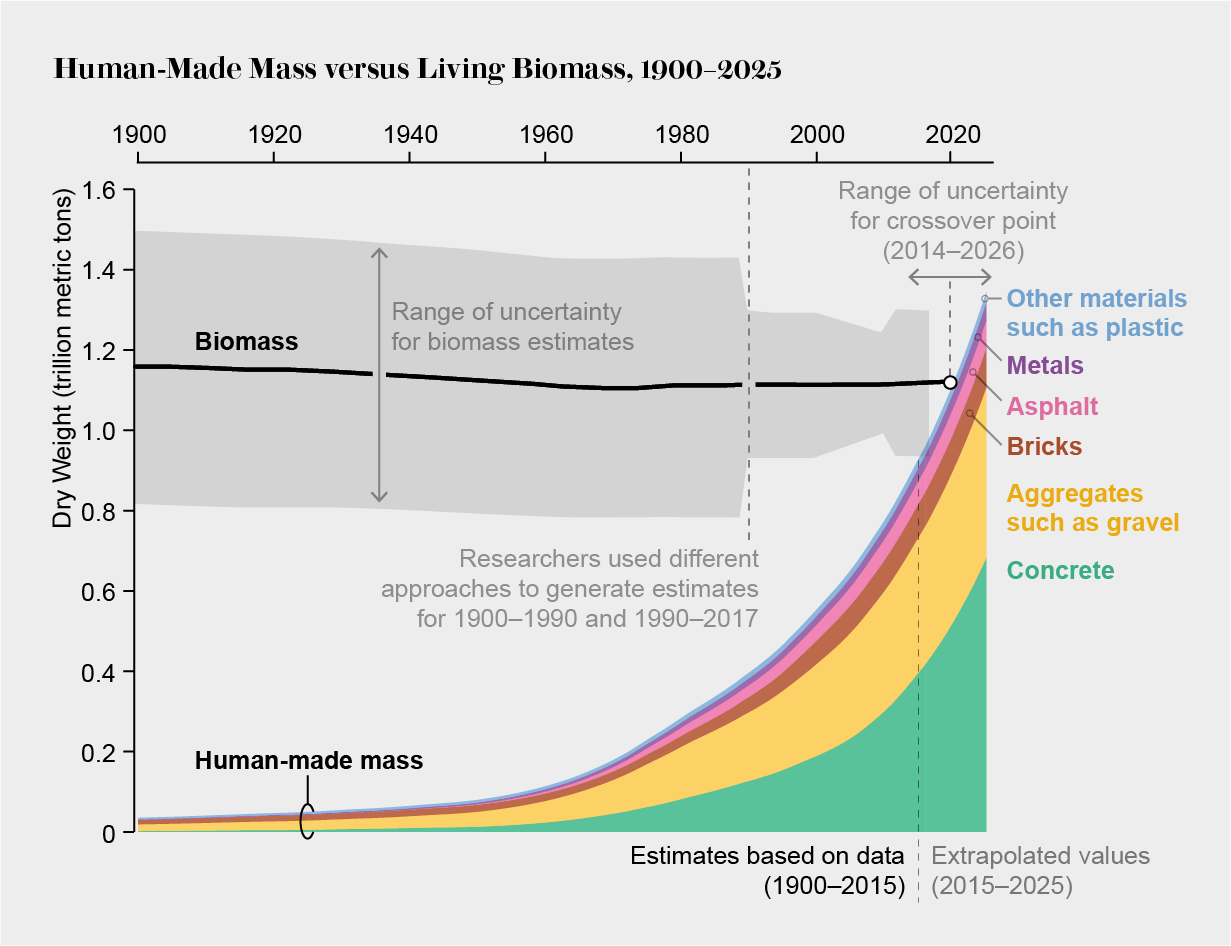
And before 1900, go back a few hundreds of thousands of years and human stuff totaled the dry weight of one redwood tree. We are not adding to the diversity and prosperity of life on Earth. Who will inherit the rubble?F
A top ten list of existential concerns (to humans*)
Distilled from the work of John Hewson, Julian Cribb, John B. Calhoun, Joseph Tainter, Paul Ehrlich...
- Extinction of humans, including megacities, cities, towns, villages, households, cars, computers, smartphones, livestock, most pets and crops.
- Resource scarcity resulting in conflict, which increases scarcity, which increases conflict... resulting in dissolution of complex society.
- Technology of mass destruction, e.g. chainsaws, vehicles, and the threat of war with or without nuclear/AI/biological weapons being used.
- Loss of functional behaviors (increasing dysfunction of humans of NIMH over 8-12 generations) leading to collapse of complex society.
- Ecocide; chemical poisoning of biosphere, including by microplastics, VOCs, NO2, PO4, CH4, SO2, O3, Pb, CO and CO2.
- Food and water scarcity resulting in conflict, increased scarcity, increased conflict... a downward death spiral.
- Diminishing returns on unmanaged technology and over investment in unsustainable complexity.
- Human, livestock, and pet overpopulation and overshoot leading to scarcity....
- Pandemic disease, whether natural or engineered.
- Delusion; denial; false beliefs, attacks on inquiry-based thinking, post-truth news, failure of schooling system, social media (tavern-talk on steroids).
*There is no top 10 list for life on earth as presently (the Anthropocene) there is only one concern on their list.
"With the coinage of 'sustainable development', the defenders of the unsteady state have won a few more years' moratorium from the painful process of thinking."
— Garrett Hardin
All the above typing involves the painful process of thinking, and so readers may expect only a few more years' moratorium to be sustainable. Or maybe a decade or ten, but I repeat myself as a hundred years is but a few to Nature. In the long-run I can only hope I'm wrong about everything if too few come to listen to Nature.
"There's no way I can single-handedly save the world or, perhaps, even make a perceptible difference
— but how ashamed I would be to let a day pass without making one more effort." — Isaac Asimov
"Go, set a watchman, let him declare what he seeth." — Isaiah 21:6
"Today’s view of normality is possible because everyday thinking about human history largely ignores its first 300,000 years and does not recognize how extremely abnormal the last few centuries have been, roughly just one-thousandth of the history of physically modern Homo sapiens.... few people today recognize the likely shallow temporal depth of the new abnormal." —Paul R. Ehrlich & Anne H. Ehrlich, Returning to “Normal”? Evolutionary Roots of the Human Prospect
"Man has lost the capacity to foresee and forestall. He will end up destroying the earth." —Albert Schweitzer
"If the world is to save any part of its resources for the future, it must reduce not only consumption but the number of consumers." —B.F. Skinner (Introduction to Walden Two 1948, 1976 edition)
“This (modern techno-industrial) civilization is such that one has only to be patient and it will be self-destroyed.” —Mahatma Gandhi, 1909
"The modern world remains mired in a swamp of cognitive dissonance and collective denial seemingly dedicated to maintaining the status quo." —William Rees,
What’s blocking sustainability? Human nature, cognition, and denial
"We’re all in a giant car heading towards a brick wall and everyone is arguing about where
they’re going to sit." —David Suzuki
"Energy substitution [alt for fossil] is a doomsday stratagem that guarantees the status quo of planetary destruction.
The solution is to use a lot less energy." —Art Berman
“We need diversity of thought in the world to face the new challenges.” – Tim Berners-Lee
Stopping distance of the giant car, full braking, is 600 feet. When the driver sees the wall, the wall will be 400 feet away or closer. The outcome, if not the details, is determinate... foreseeable.

[We're all in a giant train of 195 cars, each a social construct containing pseudo-tribal humans of NIMH, contending in assorted factions that speak each member's consensus narrative of birth or adoption. All argue about who gets to sit for how long in which preferred seats (to be fair and equitable). Some endeavor to emigrate to a 'better' car. Meanwhile, the pace of the political animal's full-speed ahead endeavor towards the Great Chasm (between Lord Man and nature), spanned by the Glorious Overshoot Bridge leading to our ecomodernist Transhuman Singularity future (when we at last fully decouple from nature), is remorseless. In some cars there is one person, maybe more, who do not believe the consensus narrative (or variants, e.g. BAU/GND), whose information source is Nature who has all the answers, has whispered sweet data to them that the coming chasm cannot be spanned, hence there is no bridge to any beyond. Each wonders if they are alone in a world of wounds, error, ignorance, and illusion. A SETI project (Search for Ecolate Temporal Intelligence) identifies that, among the 195 cars carrying an estimated 8 billion passengers, there are maybe 42k malcontent apostates (the 0.0005% plus 58k dependents) ready to abandon the Modern Techno-Industrial (MTI) train, vote with their feet, and move to the last car whose passengers gladly (for enough $₤€¥₿) exchange places with them. They decouple, not from Nature, but from the MTI Train to Nowhere, to stop in Nature knowing that no one (all being products of the MTI train for generations) is prepared to make hay while the sun shines as their ancestors had. But as the Chasm holds no appeal, all are eager to learn. Some (having a life-driven purpose) do come to understand Gaia and learn to live with her properly, and in little more than a millennium, the descendants of those who had spread out from where the last car stopped, with information packages intact, had formed the United Federation of Watersheds of Earth because, prior to eMigrating to the last car, each progenitor had had time to think, to ask, 'And then what?' The blueprint for survival, their best guess then test designs for a viable ecolate civilization, had auto-organized among them. Then Gaia said, 'Let there be information' and there were viable memes that remained after the memepool had been chlorinated by the all consuming flames of selection, doubt and xinquiry. Would-be progenitors of the world: endeavor to think well and make your best guess so. Rxevolution NOW!, bitches.]
[20x more words, words, words than Suzuki, sorry about that.]
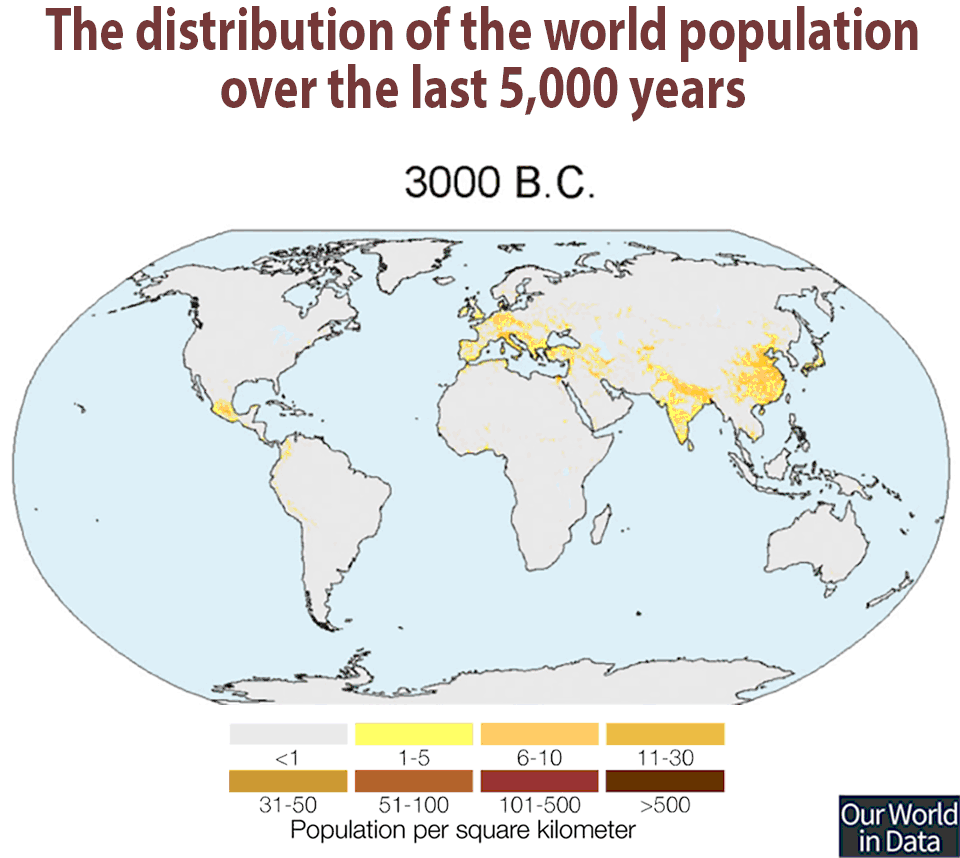
Most of 84 minerals, metals, materials now mined will not be in the 22nd century, and none on the scale needed to support more than a remnant of industrial society (for a time in that century or a bit into the next) whose fossil fueled pulse, the Great Acceleration, will be followed by contraction, degrowth, to a Great Selection. Imagine ever less: aluminum, amphibole, andesite, antimony, aragonite, arsenic, asbestos, augite, aurichalcite, autunite, barium, basalt, beryllium, biotite, bismuth, boron, cadmium, calcite, cement, cesium, chert, chlorite, chromium, clays, coal, cobalt, colemanite, conglomerate, copper, corundum, crushed stone, diamond, diatomite, dimension stone, diorite, dolomite, feldspar, fluorite, gabbro, galena, garnet, gold, granite, graphite, gypsum, iodine, iron, kaolinite, kyanite/andalusite/sillimanite & mullite, lead, limestone, lithium, manganese, mercury, mica, molybdenum, nickel, obsidian, perlite, phosphate rock, platinum, potassium, pumice, pyrite, quartz, quartzite, rare earths, rhenium, rubidium, rutile, salt/halite, sand & gravel, sandstone, shale, silica, silver, slate, strontium, sulfur, talc, tantaum, tungsten, zeolites, and zinc (per Minerals Education Coalition).
If you have a bright 10 year old, help them educate themselves as an autodidact by removing them from all forms of the modern techno-industrial serving schooling system. Don't bother building a bugout bunker stocked with lots of ammo as those who inherit the rubble will merely loose last. Don't expect recovery to begin within 50 years. The downslope dynamic may involve several centuries (2-5 is typical) and have no viable outcome (about 80% of time), i.e. there will be no recovery for modern techno-industrial monetary society other than to repeat the pattern regionally a few more times. Renormalizing, transitioning to a viable form of civilization, is to consider.
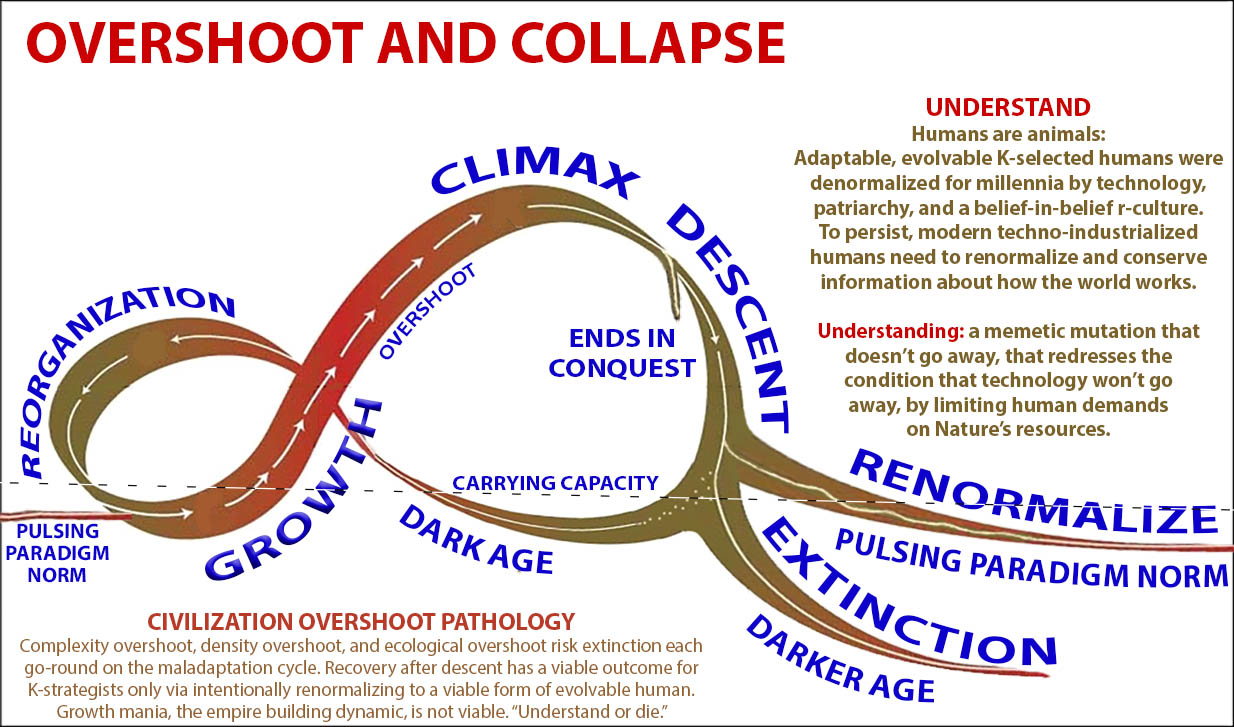
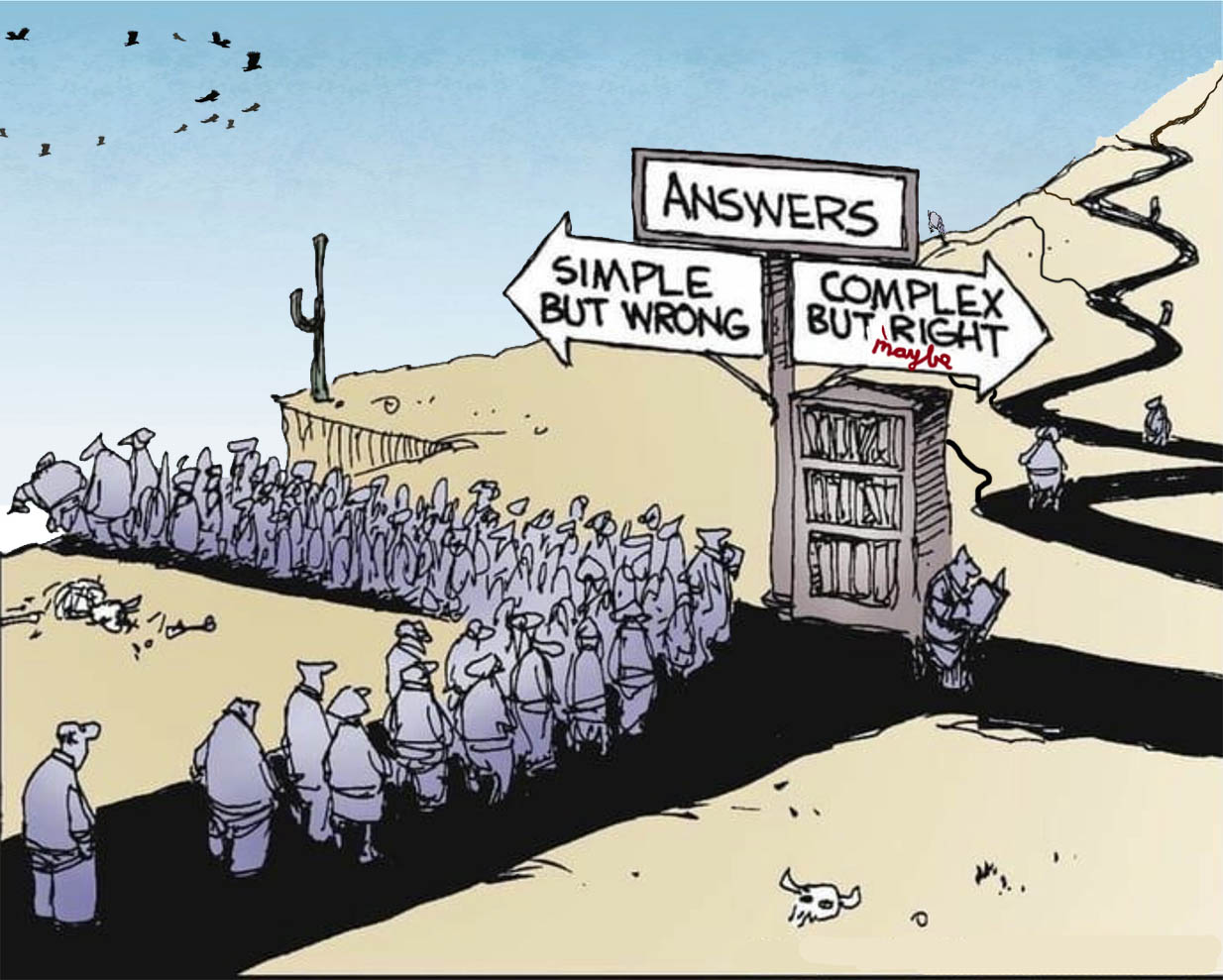
SUBNOTE TO FILE: And who built the Modern Techno-Industrial Train to Nowhere? Edgar Allan Poe was the first modern to intuit the answer (ref).
Low intensity agriculture had increased prosperity (and population) while humans continued to live in de facto matriarchal/matrilocal groups of 20 to 50. But as the millennia passed, some settled communities became larger and increasing numbers of family members became insane. The insane actually preferred to live in large groups and their normative behaviors were incompatible with everyone else's, so to the approval of all, the insane went to live in insane asylums staffed by volunteers whose family members had moved to a nearby asylum (the number of asylums grew as did their populations).
Then two inmates had a brilliant idea—to normalize violence and the use of force. The staff thought violence towards family members was crazy, so inmates had no trouble subduing them. The idea soon spread. Civilized life was so much better (for the self-interested inmates perusing short-term goals).
From many competing asylums emerged the Modern Techno-Industrial world having only 195 giant cars where progress continues. In most of the cars, leaders are now elected to help make the train run smoother and faster, and it is all thanks to the modern education system of Doctor Tarr and Professor Fether.
[If the system of the good Doctor and Professor had failed, the existential concerns of scientists (e.g. Doctor Hubbert and Professor Odum) who noticed the Great Acceleration in the 1950s would have spread until everyone associated with higher education would have become ecolate and by the early 1970s all educated by the New K-12+ Education system would have been aware of their problematique and that of posterity (i.e. they would not be energy nor time blind). The paradigm (consensus narrative) would have shifted, the train would have come to a full STOP, and humanity, with IPAT contractions at a tolerable rate over 8-12 generations, would have transitioned to a viable civilization dynamic to thereby become Federation rather than Borg. But that's not what happened, thanks to all us over-schooled Anthropocene enthusiasts.]
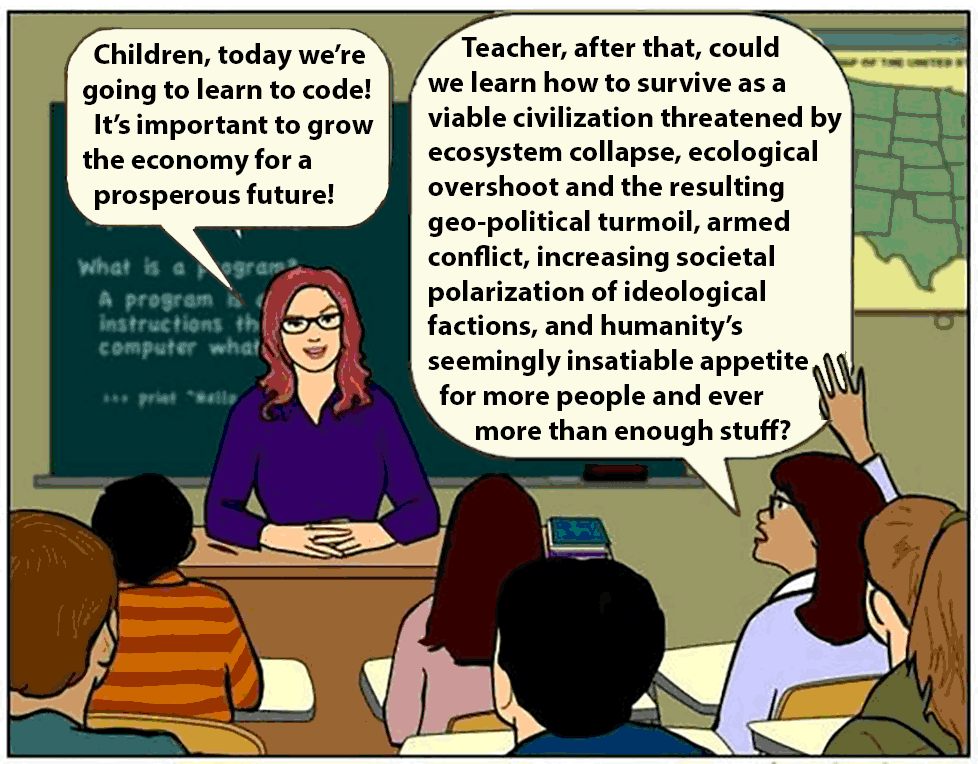

Domesticated by technology, the need to serve the world socioeconomic-political system, we are more dependent on fossil-fueled energy slave technology than dogs are on us. Within the Chernobyl Exclusion Zone, largely abandoned by humans, some pet dogs auto-organized into packs able to feed and successfully breed. Some were fed by humans for a time, but most died. Within a few generations with high mortality rates some were functional enough to persist, and a form of feral dog reverted back to one able to persist without humans.
Modern human domesticants may not have that potential. A marauding horde dynamic will arise. Those who join it will have no long-term viable future, and those who do not, who may have a potential to renormalize and persist, may become a resource for the taking by those who peruse their short-term self interests like modern humans do now.
A 'marauding horde' culture arose with the Late Bronze Age collapse, and Indus Valley Civilization collapse whose downslope dynamic played out over a six hundred year period of dissolution to regional cultural extinction. Within two hundred years of the beginning of decline, almost all cities/towns had been abandoned, and likely no literate Harrapan was part of the next four hundred years on the downslope.
If only a marauding horde culture is selected for, then when there are no resources for the taking, factions would exploit, turn on one another in a 'race to the bottom' dynamic to regional extinction, after which outliers could move in within a few hundred years of environmental restoration to occupy the region whose prior inhabitants would be known only by the ruins they left. If this happens globally, there will be no outliers, and human extinction on a marginally habitable planet is possible if not inevitable. Underestimating the challenge of sidestepping human extinction may prove fatal.
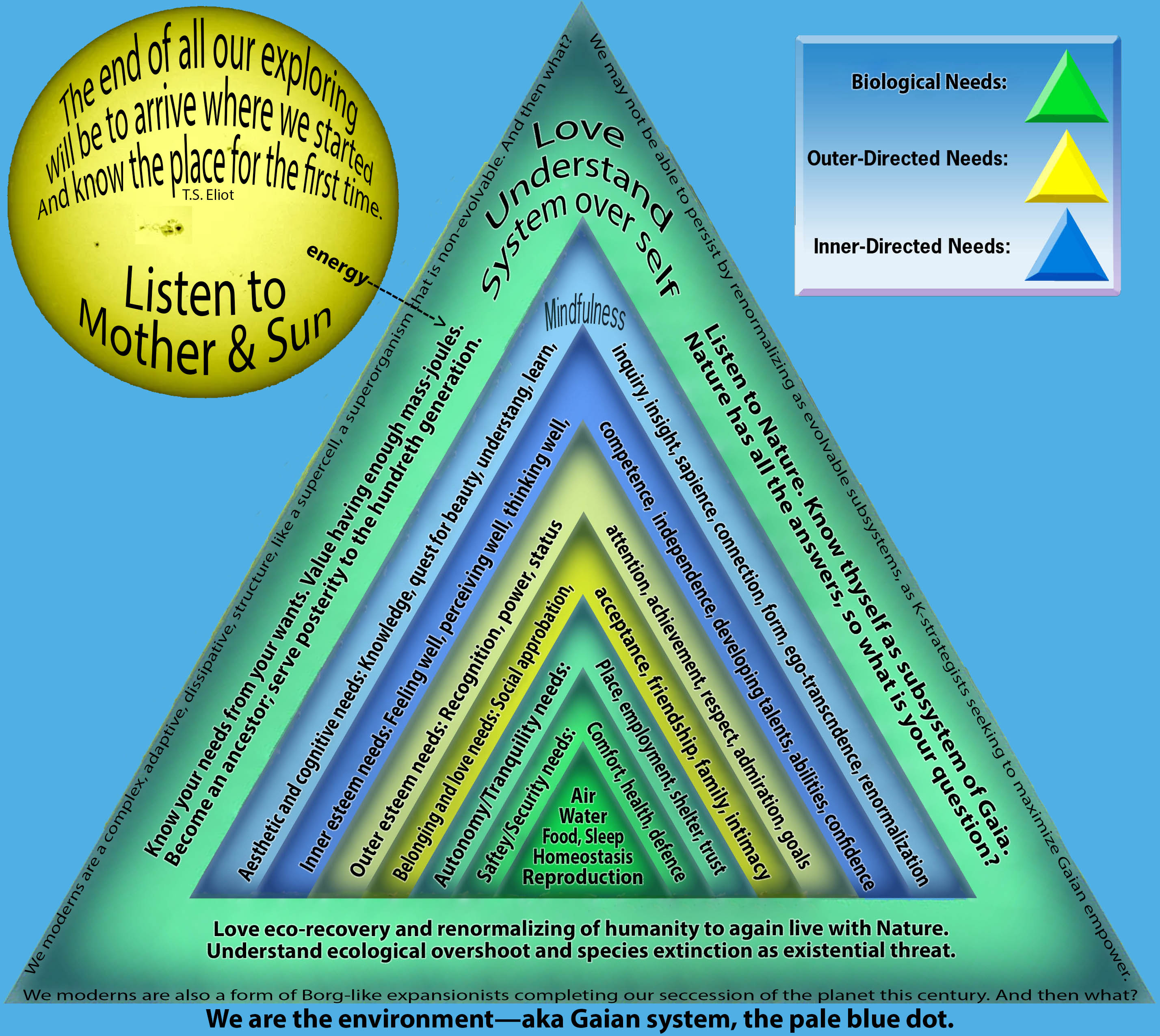
https://groups.io/g/existential-concerns

Eric Lee has existential concerns for humanity and the biosphere. He wonders if all putatively 'normal' humans of today find some of Nature's verities dissonant, e.g. Al Bartlett's 'The greatest shortcoming of the [modern] human race is our inability to understand the exponential function.' Perhaps most academics, scientists, pundits, and bloggers cannot understand the implications of this and other dissonant claims as evidenced by our continued service to the growth dynamic we are all products of and serve even though Nature tells us it is not remotely sustainable. Eric sees himself as posterity's watchman with a mandate to declare what he seeth though no modern techno-industrialized (MTIed) humans can Like or Share his prattle intended to shock humanity into a better view.
If humans do not go extinct, it will be because some wake up. It can happen. Eric recalls a man he met who had been an alcoholic. He had changed as some of us MTIed ones (enough) must change (perhaps 0.0001% could be enough) to auto-organize a viable civilization based on a life-driven purpose. The man literally had woke up in the gutter in a pool of his own urine to the realization (not believe) that his life had no viable outcome (that he was committing slow suicide). The understanding of his condition was the deliverance from it. Understanding comes from choiceless awareness, never from belief-based cognition.
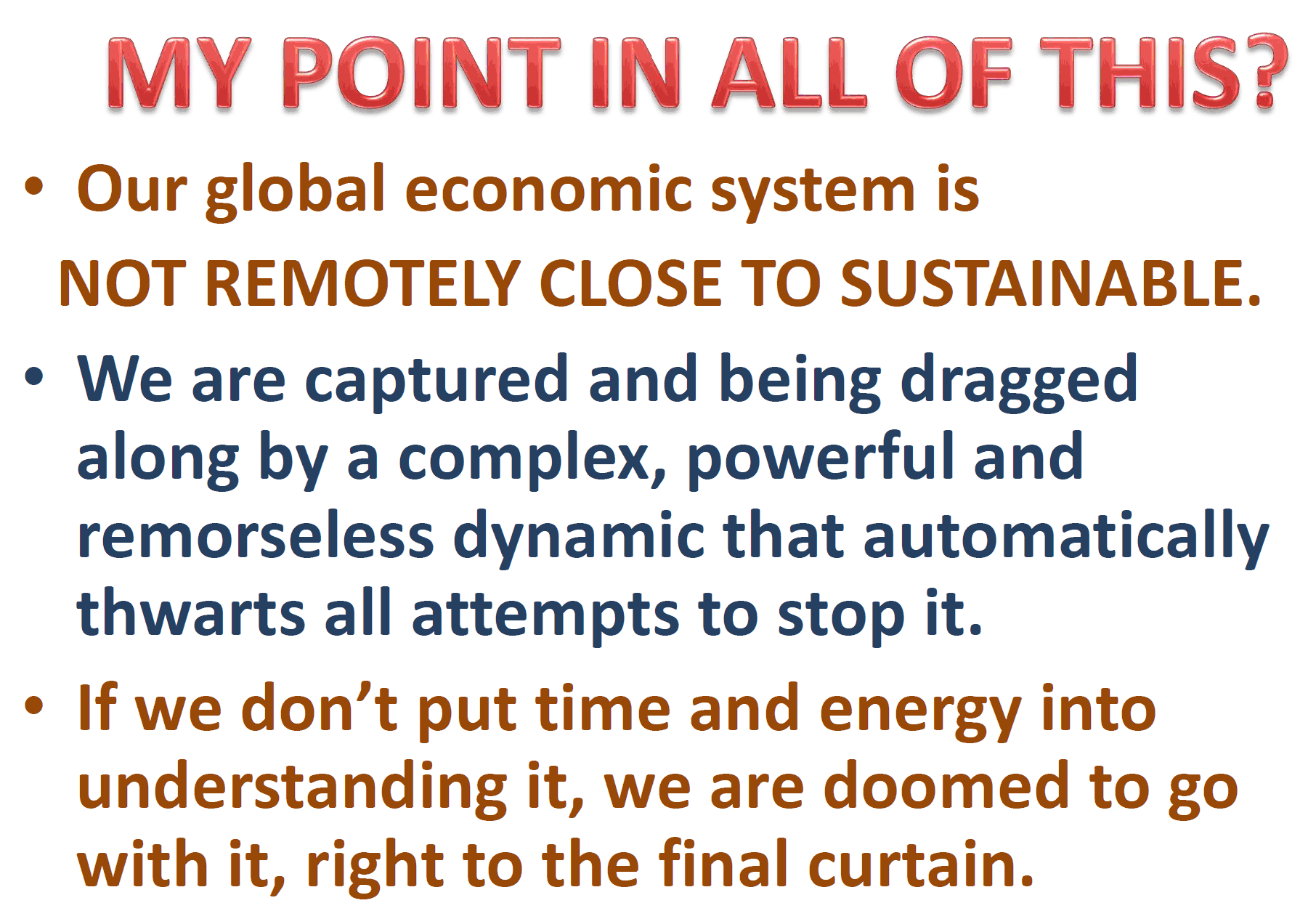
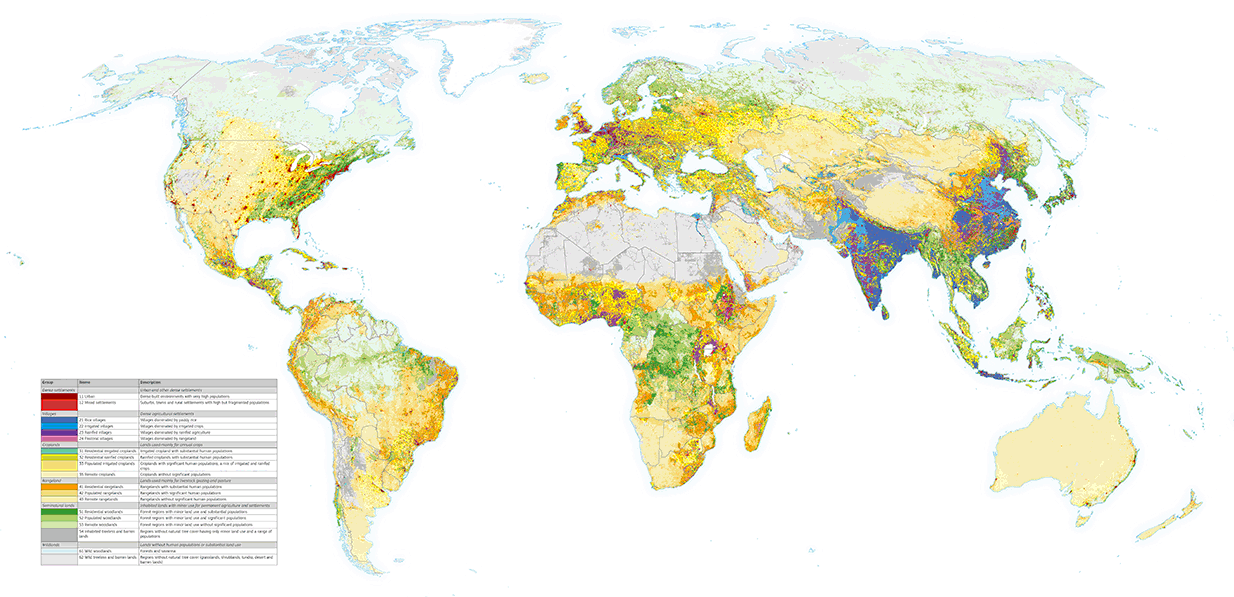 Humans: 80% and increasing.
Humans: 80% and increasing. 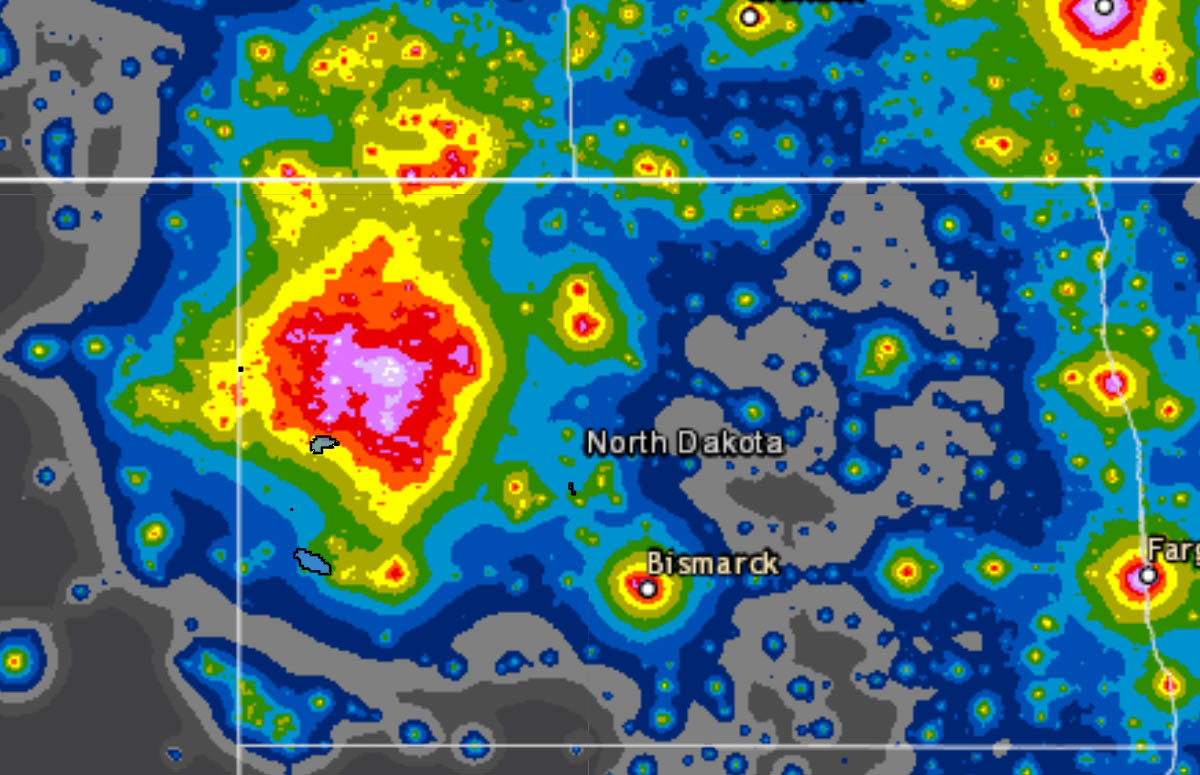
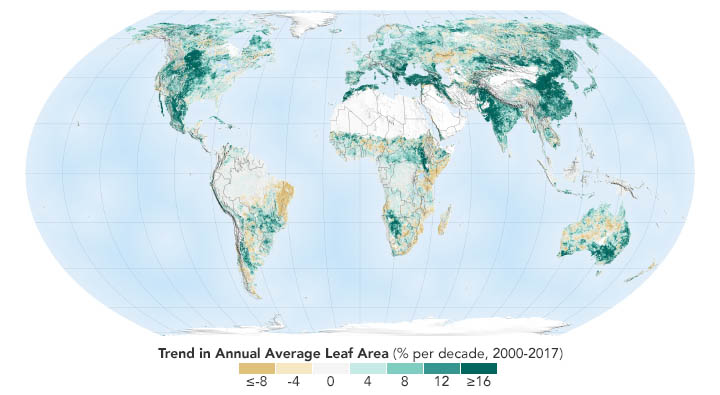
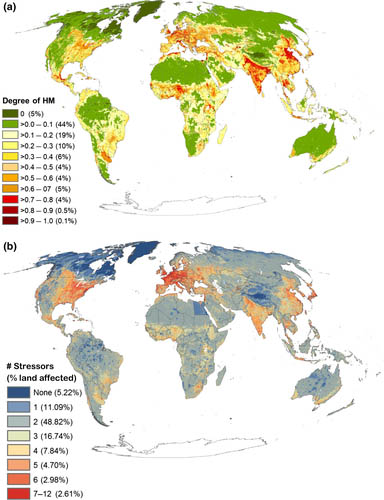 On a 1 km2 grid, the human footprint, excluding Antarctica, now covers 95 percent of the land surface, meaning that as seen from satellite height, only 5 percent (e.g. most of Greenland) appears untouched. Houston:
On a 1 km2 grid, the human footprint, excluding Antarctica, now covers 95 percent of the land surface, meaning that as seen from satellite height, only 5 percent (e.g. most of Greenland) appears untouched. Houston: 
 :
: